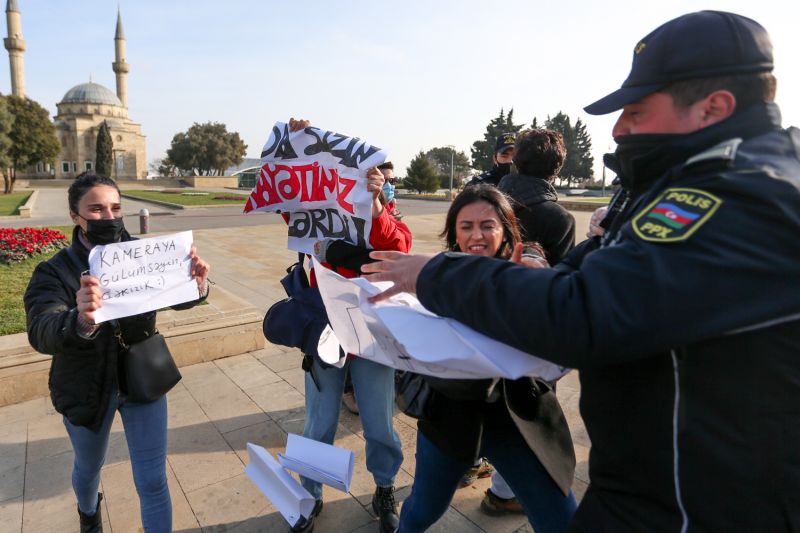
AZERBAIJAN
AUTHOR OF THE REPORT: KHALED AGHALY, LAWYER AND SPECIALIST IN MEDIA LAW IN AZERBAIJAN
PHOTO: TURAN NEWS AGENCY
1/ KEY FINDINGS
In Azerbaijan, 215 incidents of attacks/threats against media professionals and citizen journalists, editorial offices of traditional and online publications, and online activists were identified and analysed in the course of the research for 2021. Data for the study were collected using open source content analysis in Russian, Azerbaijani and English. Information about some incidents was obtained directly from the journalists and bloggers in question, or their lawyers. A list of the main sources is presented in Annex 2.
- 2021 saw a slight increase in the total number of attacks, up to 215 from 194 in 2020.
- Pressure was most frequently exerted via judicial and/or economic means. In this category, there were 129 incidents, 60 percent of the total number of attacks.
- In 76 percent of cases, attacks on media workers were committed by government officials.
- There was a two-fold increase in the number of non-physical attacks, many identified through the publication of information about mass surveillance of independent journalists and activists by the Azerbaijani authorities.
- In 2021, law enforcement agencies did not prosecute any of the individuals responsible for attacks on media workers. Investigations into attacks on journalists were often inadequate.
2/ THE POLITICAL SITUATION AND THE MEDIA IN AZERBAIJAN
Media freedom in Azerbaijan remained in a dire position in 2021. In the Reporters Without Borders Press Freedom Index for 2021, the country was ranked 167th out of 180. In 2020, Azerbaijan ranked 168th.
In its Freedom on the Net 2021 report, the US-based non-governmental organisation (NGO) Freedom House classified the internet in Azerbaijan as “not free”, with the country scoring 35 points out of a possible 100. The report notes that the country had issues relating to internet speeds, the information and communication technologies sector remained under state control, authorities manipulated information online and attempts to distribute information which is critical of the authorities were blocked. Azerbaijan was also classed as a “not free” country in Freedom House’s 2020 report on internet freedom. In the NGO’s 2017 report, the internet in Azerbaijan was considered to be “partially free”, scoring 42 out of a possible 100 points.
According to official sources, over 5,000 media outlets were registered in Azerbaijan in 2021. There were, in fact, about 500 functioning mass media organisations. These media outlets, despite attempts at self-regulation were all, in some way or another, under government control.
In early 2021, the Media Development Agency was established to provide support to both online and print media. This was previously the responsibility of the State Media Support Fund, but the new agency functions in a similar way. Funds are allocated from the state budget and distributed via grant competitions to media organisations. Previously, only print media was dependent on this funding, however online media, which was largely free from state control and mainly funded by grants from donor organisations, has now found itself reliant on state funding.
There are 94 radio and TV broadcasters in Azerbaijan: 11 national TV broadcasters, 11 regional TV broadcasters, 16 radio broadcasters, two satellite TV broadcasters, 17 cable network operators, 35 IPTV operators and two operators broadcasting foreign TV channels via satellite. The broadcasting sector is regulated by the National Television and Radio Board, which was created, funded and controlled by the government. The Council is periodically allocated funds from the state budget, which it distributes among broadcasters.
Print and broadcast media, both of which depend on government funds, are fully controlled by the government. Since business in the country also remains closely connected to the government, independent and opposition media are deprived of advertising revenue.
At the end of 2021, a new phase of legal regulation of the media in Azerbaijan began. On December 30, the Azerbaijani parliament adopted a new media law, despite objections from local journalists and the international community. The previous laws (“On Mass Media” and “On Television and Radio Broadcasting”), which regulated the work of print and broadcast media, were nullified. The new laws allow for strict regulation of the media, including stipulations on the legal status of journalists and online video broadcasts.
Analysis of the attacks on media workers in Azerbaijan in 2021 revealed that the main problem facing journalists, bloggers, and media workers in the country was the ineffectiveness of legal protection. Journalists are, in theory, protected from external interference by law in Azerbaijan. Violence against a journalist carrying out their professional duties, for instance, is a criminal offence, while withholding “socially significant information” from a journalist is an administrative offence. In practice, however, none of these laws are followed.
Large-scale attacks on independent media organisations and journalists are usually carried out in the following ways:
- Blocking online media outlets. Current laws allow sites to be blocked for minor issues such as unverified information and reporting on suicide. This usually takes place without a court’s involvement, which, in turn, makes it nearly impossible to reverse.
- Hacking. Opposition media organisations, individuals posting content criticising the authorities, and journalists’ social media profiles are often hacked.
- Criminal penalties for defamation. Laws criminalising defamation continue to be used to censor “objectionable” content.
- Civil lawsuits to protect honour and dignity. Judicial practice in cases such as these is typically not in favour of media organisations or journalists. The courts accept all claims against media workers, even without sufficient grounds or evidence.
3/ GENERAL ANALYSIS OF ATTACKS
In 2021, 215 attacks against journalists, bloggers and other media workers were recorded in Azerbaijan. This number increased almost one and half times since 2017. Attacks via judicial and/or economic means remained the most common method of exerting pressure on media workers. The number of attacks of a non-physical nature and/or cyber-attacks doubled in 2021 from 2020. This followed the revelation that the Azerbaijani authorities used the “Pegasus” spyware from the Israeli “NSO Group” to spy on independent journalists and activists. At least 43 incidents of this kind have been recorded.
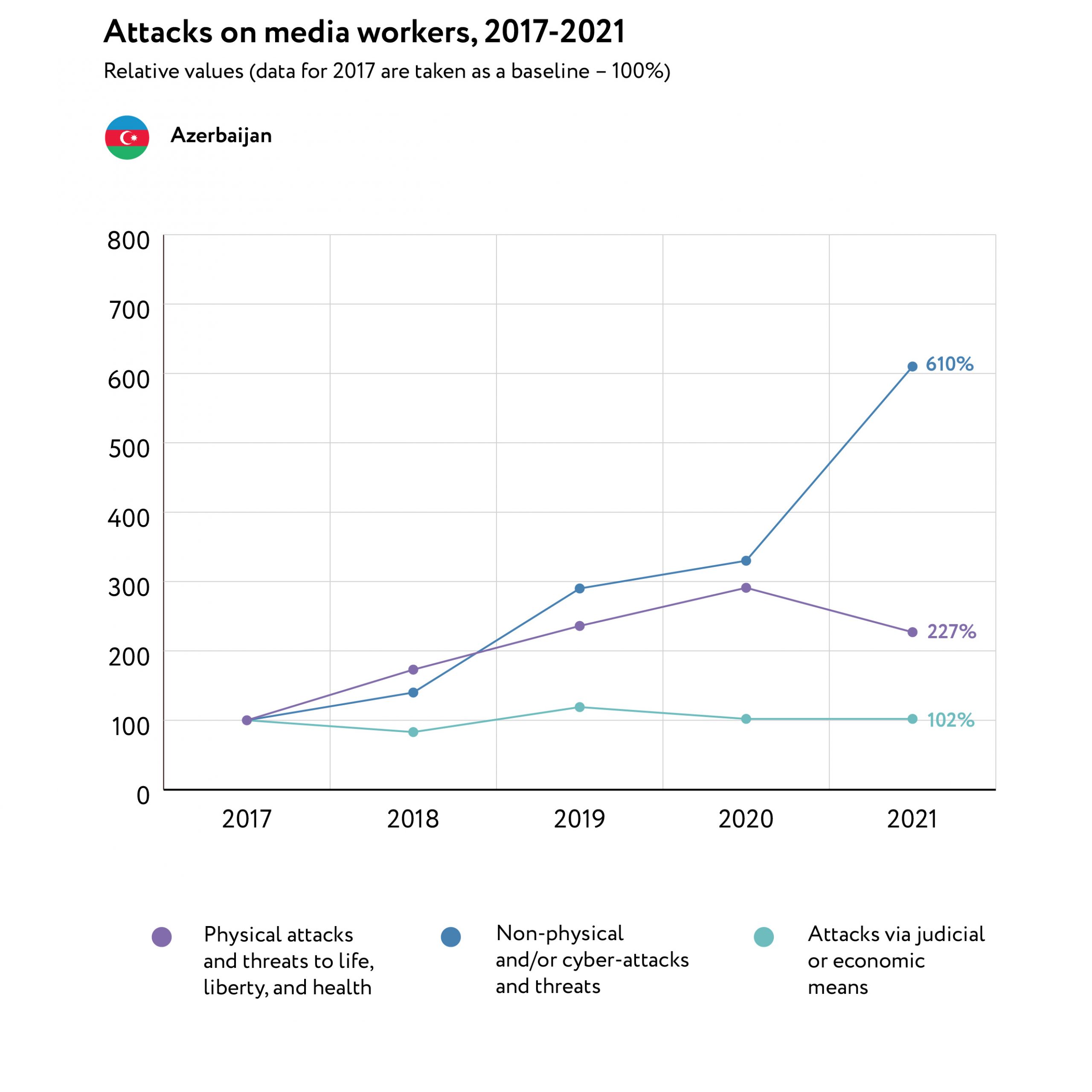
There has been a slight decrease in the number of physical attacks against journalists, bloggers and other media workers. In 2019, 32 cases were reported. This number fell to 26 in 2020 and 25 in 2021.
In 76 percent of cases, representatives of the authorities were responsible for the attacks. In 11 percent of cases these attacks came from individuals who were former representatives of the authorities.
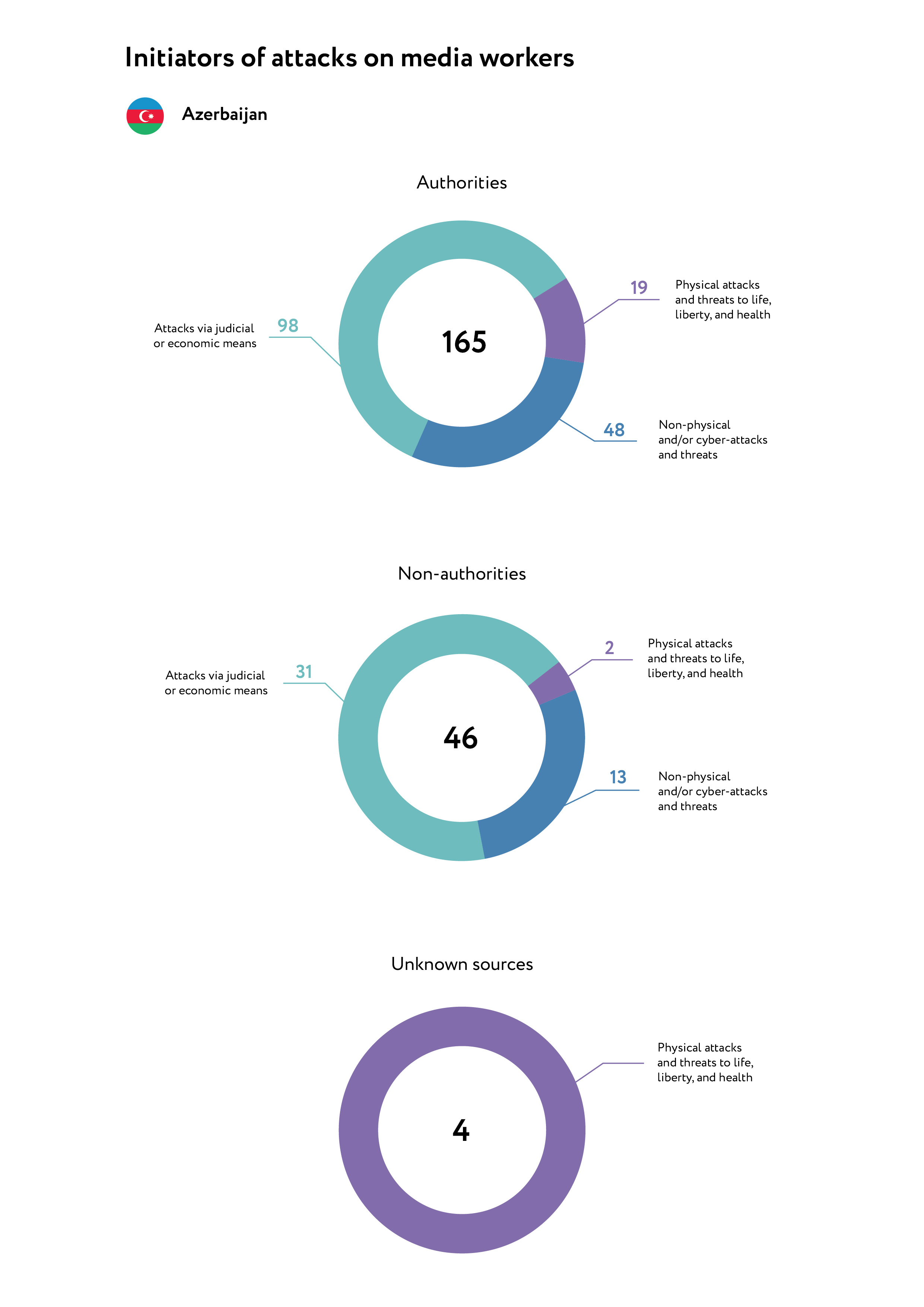
The most common attacks on media representatives in Azerbaijan in 2021 consisted of attempts to interfere with their professional duties. Independent and opposition journalists were often forcefully detained, their professional equipment confiscated or damaged, and footage deleted. There were 50 incidents of this nature in 2021.
4/ PHYSICAL ATTACKS AND THREATS TO LIFE, LIBERTY, AND HEALTH
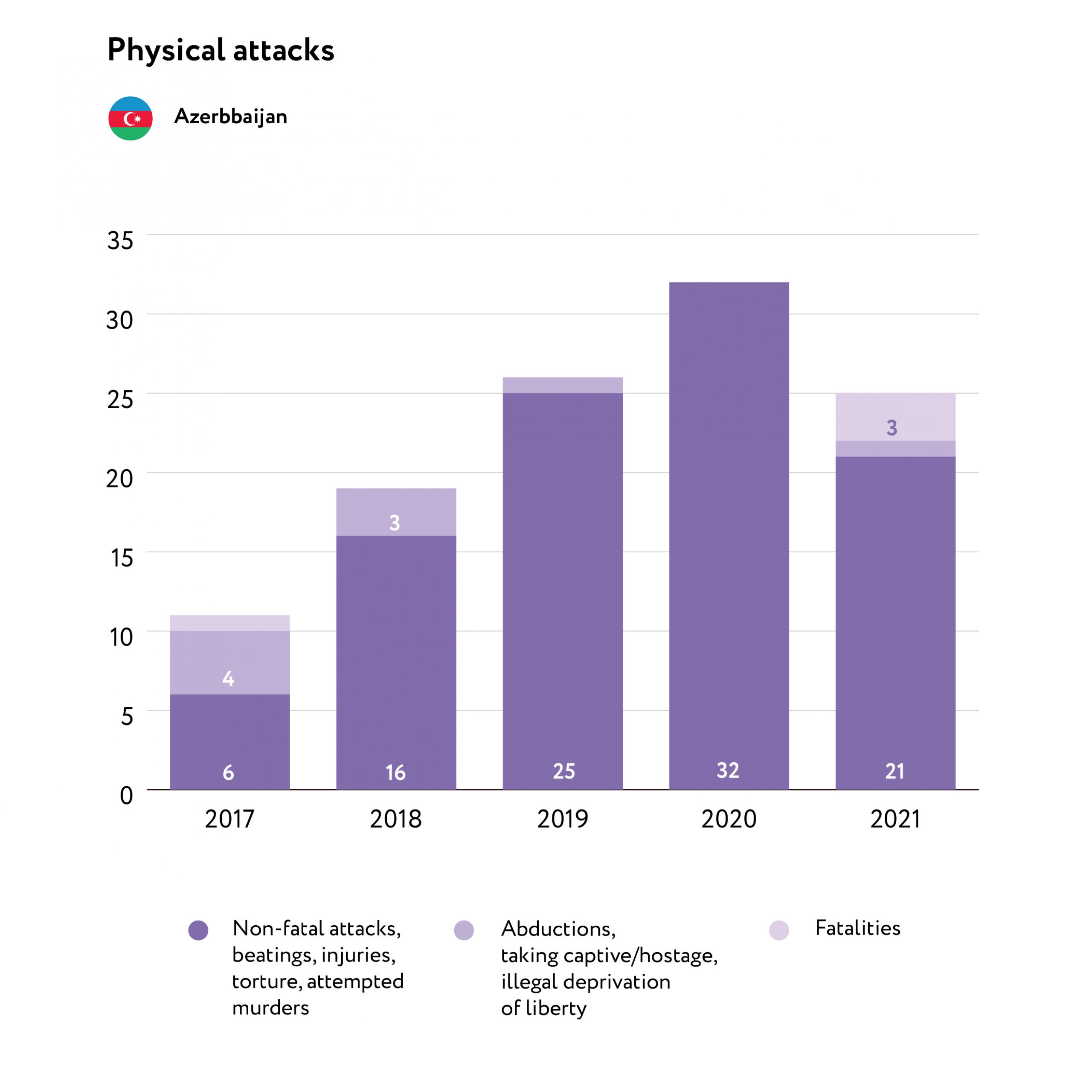
In 2021, at least 22 incidents of physical attacks on journalists were recorded in Azerbaijan. Three journalists were killed.
- On January 21, editor and founder of Qərb bölgəsi press and Qərb.TV online, Aliyev Bakhtiyar, was killed in the Shemkir region. The murder was committed by close relatives. The incident reportedly happened on domestic grounds.
- On June 4, an Azerbaijan State Television (AZTV) employee, Siraj Abyshov, and an employee of the state AZERTAJ agency, Maharram Ibrahimov, were killed after their car drove over a mine. The journalists were preparing to report from the area, where fighting had taken place during the 2020 Nagorno-Karabakh war. Another AZTV employee, Emin Mammadov, was injured following the explosion.
In 2021, one journalist was kidnapped.
- On July 29, Arshad Ibragimov, editor of the dunyanınsesi.az (Voice of Peace) website, was forced into a car and taken away by individuals in civilian clothes. According to the journalist’s brother, Tariel Ibragimov, Arshad was detained by the Ministry of Internal Affairs for Combating Organised Crime. “Since he’d only received a phone call, my brother refused to go [to the police station]. He demanded that they send him an official summons,” said Tariel, who believes his brother was detained for criticising the police. The head of the Ministry of Internal Affairs’ media and public relations department, Elshad Hajiyev, said that “Ibragimov was invited to the police station following a citizen’s request and, after writing a statement, will be released.”
Most of the journalists who were subjected to physical attacks in 2021 were representatives of opposition independent media outlets. Most attacks took place while they were reporting on protests held by various opposition political groups.
- On March 8, a women’s march was held in Baku under the slogan “March 8: for our rights”. During the demonstration, reporter Nurlan Gahramanli was assaulted while filming a group of activists who were being arrested.
- On May 7, four journalists were physically assaulted during a rally held by a group of war veterans in central Baku. Police stopped them from filming and detained the protesters. Independent journalists Nurlan Gahramanli, Zahra Kalantarova, Avaz Hafizli and Vusala Gasangyzy were not allowed report, and their professional equipment was seized.
- On May 14, Nurlan Gahramanli was detained by police while asking about the arrest of his colleague, journalist Elmeddin Shamilzade. Both journalists were held at the police station, charged with “petty hooliganism” and fined. Gahramanli and Shamilzade were treated in a physically rough manner by police.
- On August 4, Microskop Media employee Elnara Gasimova, Voice of America (VoA) correspondent Ulviyya Ali, and independent journalist Nargiz Absalamova were physically assaulted while reporting on a demonstration held by a group of women’s rights activists outside the police headquarters. The journalists spent several hours in police custody. They said that they were subjected to physical and mental abuse, the content of their phones was examined and they were forced to delete video footage.
- On October 5, a group of activists from the Popular Front Party of Azerbaijan (PFPA) held a protest in front of the Azerbaijani Penitentiary Service. The activists demanded the release of PFPA member Niyameddin Akhmedov, calling on local media and human rights activists to raise awareness of the arrested PFPA members. The reporters covering the demonstration, including Meydan TV journalist Aysel Umudova, Microskop Media journalist Zarifa Novruzova, and Turan TV employee Fatima Movlamli, showed their IDs, but were detained by force, nonetheless.
- On November 5, Turan TV journalist Fatima Movlamli was detained during another PFPA demonstration outside an Azerbaijan Penitentiary Service medical institution. She later reported that she was verbally abused and assaulted while in police custody.
- On December 1, Baku TV journalist Tural Museibov was publicly assaulted by guards while trying to interview the head of the State Border Service.
- On December 28, around 30 independent media journalists held a demonstration in front of the main parliament building. There was a clash between police and the protesters, in which journalist Nargiz Absalamova’s collarbone was broken.
In 2021, the majority of physical attacks on journalists involved police officers. The law protects journalists from such attacks, and explicitly prohibits the persecution of media workers. In 2021, journalists reported 10 incidents of this kind to the prosecutor’s office and demanded that charges be pressed against their attackers. None of these requests were granted.
5/ NON-PHYSICAL AND/OR CYBER-ATTACKS AND THREATS
There were at least 61 incidents of attacks of a non-physical nature and/or cyber-attacks against the editorial offices of online news organisations, journalists, bloggers and other media workers in 2021. There has been a significant increase in noted cases of harassment, intimidation and defamation in connection to the revelation that the Azerbaijani government spied on journalists.
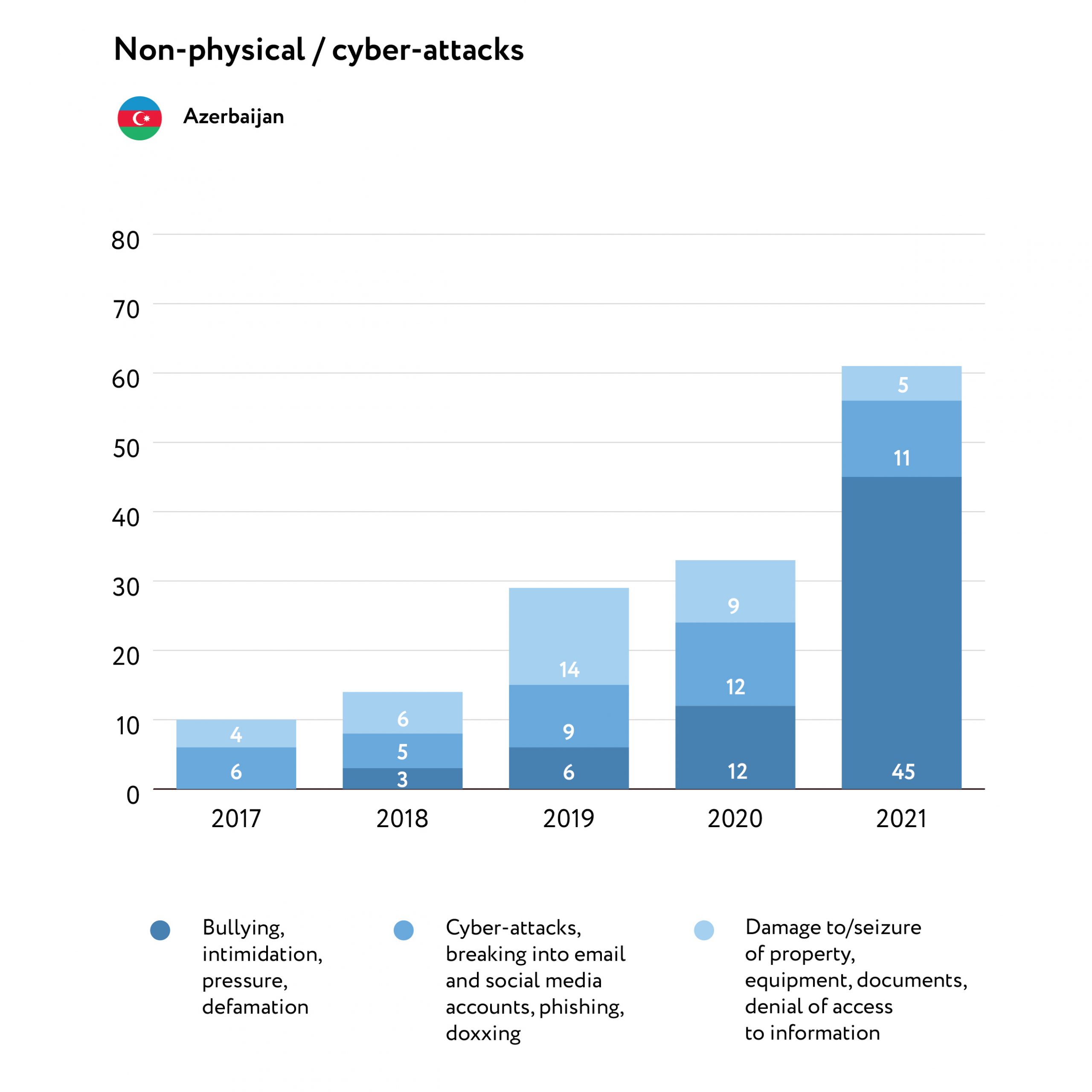
In the summer of 2021, the Organised Crime and Corruption Research Centre (OCCRP) published an investigation into the hacking of journalists’ phones in Azerbaijan using the Pegasus spyware. Several journalists whose phones were tapped filed complaints with law enforcement agencies, but no investigations were carried out.
According to the OCCRP, the Azerbaijani government used spyware to monitor at least 43 prominent journalists:
- Avaz Zeynalli, Khural newspaper, Editor-in-chief
- Azer Aykhan, Yeni Musavat media group, Journalist
- Aziz Karimov, Photographer for Turan, Getty Images, Associated Press, Time Magazine, BBC and Reuters
- Aydin Dzhaniev, Khural newspaper, Journalist
- Aynur Jamalgyzy, Teleqrafmedia group, Director
- Ainur Elgunash, Meydan TV, Journalist
- Aytan Mammadova, Radio Free Europe/Radio Liberty, Journalist
- Aytan Farhadova, Meydan TV and Institute for War and Peace Reporting, Freelance journalist
- Anar Orudzhev, Channel 13, Founder
- Arif Aliyev, Pressklub.az, Executive Director
- Bahaddin Gaziev, “Bizim Yol” (“Our Way”), Editor-in-chief
- Vahid Mustafayev, ANS TV, Journalist, Film Director
- Vidadi Mammadov, Azadliq, Journalist
- Vusala Mahirgizi, APA News Agency, Director General
- Ganimat Zahid, Turan TV, Manager
- Gular Mehdizade, Freelance journalist
- Jasur Sumerinli, Journalist
- Zamin Haji, Musavat.com, Journalist
- Zahir Azamat, qaynarinfo.az, Editor-in-chief
- Inara Rafiggizi, AzeriDaily.com, Journalist
- Islam Shikhali, Radio Free Europe/Radio Liberty, Journalist
- Mehman Aliyev, Turan News Agency, Director
- Mir Shahin Agayev, Real TV, Executive Director
- Mushfig Jabbar, Radio Free Europe/Radio Liberty, Journalist
- Natiq Javadli, Meydan TV, Journalist
- Parviz Hashimli, gununsesi.info, Editor
- Ramin Deko, Radio Azadliq, Journalist
- Rauf Arifoglu, Yeni Musavat newspaper, Editor-in-chief
- Rovshan Hajilbayli, Azadliq newspaper, Editor-in-chief
- Sevinj Vagifgizi, Meydan TV, Journalist
- Seymur Kazymov, Freelance journalist
- Sujaddin Sharifov, Azadliq newspaper, Deputy editor-in-chief
- Tazakhan Miralamli, Azadliq newspaper, Journalist
- Fizza Heydarova, Radio Azadliq, Journalist
- Khadija Ismailova, Investigative journalist
- Khalig Bahadir, Azadliq newspaper, Journalist
- Shahveled Chobanoglu, Journalist
- Eynulla Fatullayev, Haqqin.az, Executive Director
- Elkin Khalilov, Freelance journalist
- Elnur Astanbeyli, Publicist, poet
- Elkhan Shukurlu, Strateq.az, Editor-in-chief
- Elchin Shikhly, Chairman of the Union of Journalists of Azerbaijan; ayna.az, Executive Director.
2021, as was the case in previous years, saw several cyber attacks against opposition activists, including:
- On August 27, the HamamTimes website was hacked. Employees reported that hackers removed all the content from the site. They were able to restore the site’s archive, but their vulnerability to cyber attacks remains.
- On September 14, the news page of the opposition Musavat Party on Facebook was hacked. Similar incidents occurred in the past. The same day, a private Facebook group, Azad Azərbaycan, was hacked and taken down.
In at least three cases, journalists’ inboxes and social media profiles were hacked:
- On August 7, Turan.az reported that the Realliq.tv Facebook page, as well as the personal page of Realliq.tv editor Ikram Rahimov, had been hacked. “All profiles are managed by an outside group, I do not have access to the profiles”, said Rahimov. He also said that Youtube had informed him of attempts to hack into the Realliq.tv channel.
- On September 4, the editor of the news website anews.az, Naila Balaeva, reported that her Facebook account had been hacked. The email address and phone number, to which the profile was linked, were changed. Although Balaeva was able to regain access to her emails, the hacker continues to access her Facebook, often deleting critical posts about the police or government agencies.
- On November 3, according to Alasgar Mammadli, the founder of Toplum TV, unknown individuals hacked into his phone and gained access to Toplum TV’s Facebook account. They also managed to access Mammadli’s private information and correspondence. The attackers deleted videos from the “Debate in Society” program, which featured leaders of the PFPA and Musavat opposition parties. In addition to this, thousands of subscribers were removed from the Toplum TV page.
Journalists, especially members of opposition media organisations, were often interfered with while trying to gather information. For example:
- Elshan Balakhansky, an employee of the Novy Musavat newspaper, Anar Mammadov, head of the kriminal.az website, and Haji Zeynalov, an employee of the Bizim Yol newspaper, were prevented from gathering information at the trials of former leaders of the Ministry of National Security, which took place on November 16 and 19. Despite these being ostensibly open trials, a panel of judges prevented independent journalists from entering the courtroom.
There was one recorded case of a non-physical attack on a journalist’s friends and family in 2021.
- On March 5, Azerbaijani video blogger Mohammed Mirzeli was blackmailed. Mirzeli, who emigrated to Europe a few years ago, is known for his Youtube channel in Azerbaijan, where his family members still live. In recent years, his relatives were routinely subject to persecution. His parents and close relatives have been arrested in the past. In March, he was sent explicit images of his sister and demands were made that Mirzeli quit journalism, otherwise these photos would be published.
6/ ATTACKS VIA JUDICIAL AND/OR ECONOMIC MEANS
In 2021, at least 129 attacks via judicial and/or economic means were recorded against media representatives and organisations in Azerbaijan. In 98 of these cases, these attacks were committed by government officials.
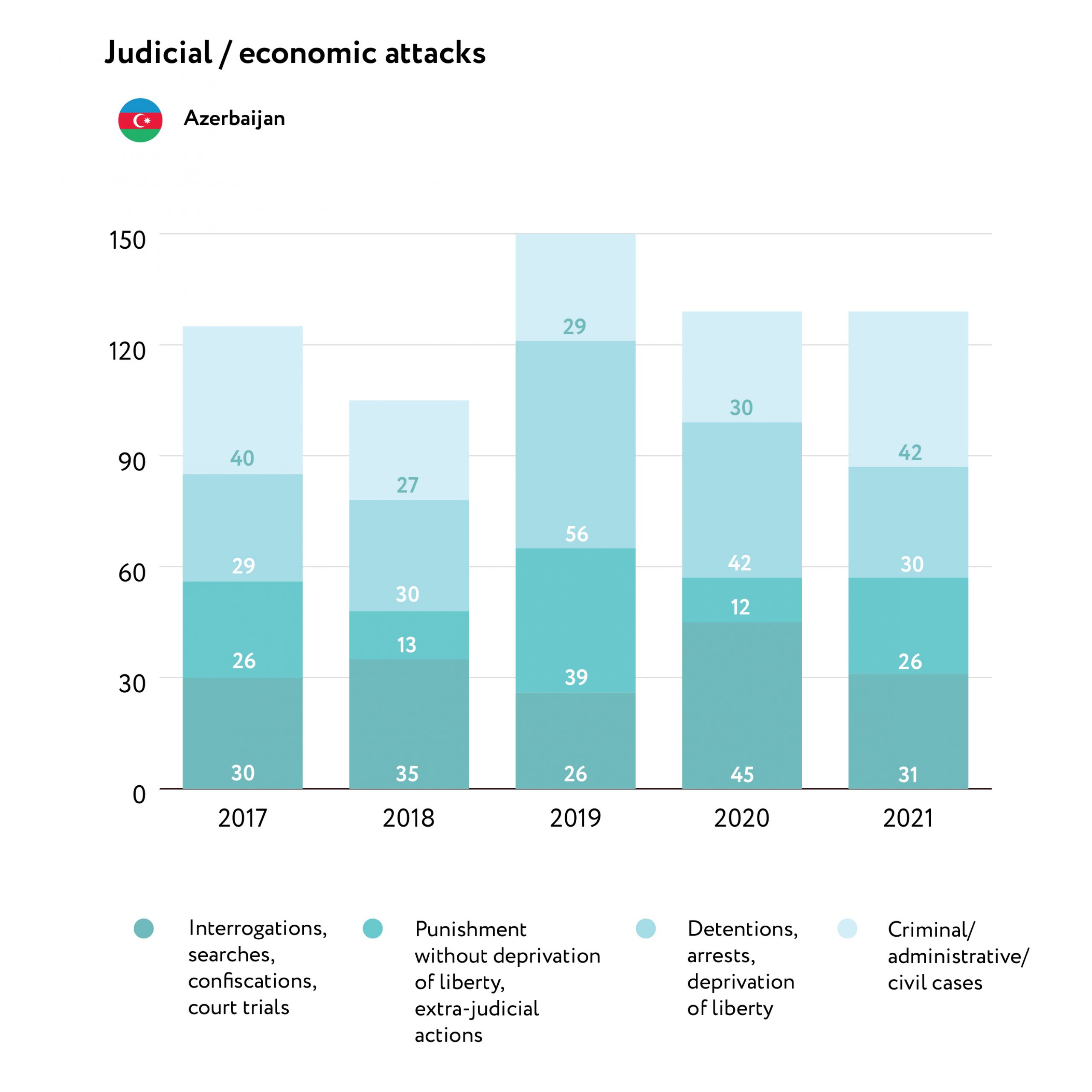
The main methods of exerting pressure were initiations of criminal, administrative and civil cases (41 incidents) and interrogations, searches and confiscation of belongings (31 incidents). Examples of such incidents are:
- On August 10, Fuzuli Mammadov, president of the İnter Sever group and head of the Union of Russian Azerbaijanis, filed a lawsuit against the head of Xural TV. The businessman also sued Reaksiya TV and its head, Zaur Gariboglu, over several publications. The court ordered the journalists to apologise, remove the offending material and pay compensation to Mammadov.
- On September 8, Mammadov filed a civil lawsuit against Khural TV and Reaksiya TV alleging they spread “slanderous” information about him. The Binagadi District Court partially sided with Mammadov. It ordered Khural TV to pay 350 Manat (US $200) to the plaintiff, while Reaksiya TV was ordered to pay 230 Manat (US $135). In addition to this, both media outlets were ordered to remove the offending materials from their sites.
- On October 19, five members of the Religious Workers of Azerbaijan association were detained: Sardar Babayev, Gadir Mammadov, Jalal Shafiyev, Ali Musayev and Tamkin Jafarov. The individuals contributed to the website maide.az. According to their relatives, the arrests were carried out by employees of the State Security Service. Their phones and computers were also confiscated.
- On November 6, head of the Citizens and Development Party, Ali Aliyev, and the head of the Bumerang Media Youtube channel, Elchin Rahimzade, were interrogated by the State Security Service. They were eventually released. Aliyev told reporters the interrogation was linked to a “large-scale criminal case” but could not disclose any further details. Rahimzade said a search was carried out at the editorial office, a safe was confiscated, and he was interrogated as a witness. Police were interested in the sources of some of the videos published on the channel.
Slander and defamation are criminal offences in Azerbaijan, which forces journalists into a position of self-censorship. In 2021, media organisations and journalists were prosecuted at least 20 times for defamation. In most cases, these lawsuits were initiated by officials, employees of government agencies and government-aligned businessmen. Examples include:
- On January 26, Rasim Mammadov, chairman of the NGO Coalition of Public Control, filed a lawsuit against journalist Aygun Muradkhanli for slander and humiliation (Article 147 of the Criminal Code) and demanded that she be arrested. Mammadov argued that the journalist accused him of separatism, fraud and other crimes on Facebook and Youtube.
- On March 2, the Sheki Court of Appeal sentenced bloggers Elchin Hasanzade and Ibrahim Turksoy to eight months in prison on charges of defamation. Both were taken directly into custody following the trial. The lawsuit was filed by the head of the city housing and maintenance department, Shakhriyar Mustafayev. The lawsuit stemmed from critical publications about the official on social media. The Mingachevir court previously sentenced both bloggers to a year of forced labour. On November 2, 2021, Hasanzade and Turksoy were released from prison, having served their sentence in full.
- On March 29, the Khachmaz District Court considered a case against freelance journalist Jamil Mammadli. The lawsuit was filed by the chief executive of the neighbouring Guba region, Ziyaddin Aliyev, who demanded that the journalist be brought to justice under Article 147.2 of the Criminal Code (false accusations of committing a serious crime).
- On April 28, Rafil Israfil oglu Huseynov, head of the Agjabadi regional executive power, filed a lawsuit against independent journalist Khayyam Salmanzade under Article 147 of the Criminal Code (defamation). The journalist wrote articles criticising Huseynov’s actions during the war. Huseynov demanded an apology from the journalist, and a payment of 300 Manat (175 USD) The complaint was later withdrawn.
- On April 28, businesswoman Arzu Babayeva filed a lawsuit against Parvin Abyshova, editor-in-chief of Aztimes.az, under Article 147 of the Criminal Code. Aztimes.az published information about Babayeva’s illegal activities. Babayeva maintained her innocence and demanded an apology, and 10,000 Manat (US $5,800) in compensation.
- On June 22, the Akhsu District Court held a preliminary hearing of a lawsuit filed by the State Oil Company of the Azerbaijan Republic (SOCAR) Vice President, Mikayil Ismayilov, against blogger Elshan Alisoy. Ismailov pressed charges under Articles 147 (defamation) and 148 (committing offence) of the Criminal Code. Alisoy shared an Azadsoz.com article entitled “The Dark Empire of Mikayil Ismayilov” on Facebook, with the comment, “God, why do they need so much money… Mikayil Ismayilov is one of the 12 vice-presidents of SOCAR. It’s greedy and barbaric.” The blogger said, “After I posted this, Ismailov filed a lawsuit against me and wants me to pay 100,000 Manat [US $60,000] for causing moral damage,” the blogger said.
- On July 8, the Swiss Prosecutor’s Office opened a criminal case against Azerbaijani bloggers and journalists living in Europe. This followed a lawsuit, filed by SOCAR, for defamation and damages to their reputation. The case was opened against blogger Fuad Agayev, who published an expose about SOCAR’s leadership. The head of Turan TV, Ganimat Zahidov, editor Fikret Huseynli, manager Emil Jafarov, and bloggers Azer Kazimzade, Orkhan Agayev, Gabil Mammadov and Muhammed Mirzeli are all named in the case. SOCAR demanded the arrest and extradition of these individuals to Azerbaijan.
- On August 9, the head of the legal department of the National Academy of Sciences, Kamal Aliyev, demanded the arrest of Avaz Zeynalli, head of Khural TV. On March 3, the request was considered in the Baku Court of Appeal. Aliyev, claimed that Zeynalli slandered him and demanded that Zeynalli be tried under Article 147.2 of the Criminal Code (false accusations of committing a serious crime).
- On September 16, Ilgar Aliyev, the cousin of the President of Azerbaijan, and Ilham Almas oglu Mammadov sued Avaz Zeynalli, editor-in-chief of Khural TV, for slander. They claimed that the journalists slandered them during an interview. Their complaint was accepted by the courts.
In 2021, at least 16 incidents were recorded related to the arrest of journalists carrying out their official duties. The following journalists were arrested: Tazakhan Miralamli (Azadlıq newspaper), Nurlan Libre (freelance reporter), Salima Jalilova (Turan agency), Sevinj Sadigova (Azel.tv), Aytaj Tapdyg (Meydan TV), Mehman Huseynov (blogger), Ulvi Hasanli (abzas.org), Elmeddin Shamilzade (Toplum.tv), Nargiz Absamalova (abzas.org), Ulviya Ali (VoA), Elnara Gasimova (Microskop Media), Aysel Umudova (Meydan TV), Fatima Movlamly (freelance journalist), Zarifa Novruzova (Microskop Media) and Teymur Kerimov (freelance journalist). The majority of these incidents took place in the centre of Baku.
Since 2021, a new trend has emerged in Azerbaijan, with the application of repressive legislation originally introduced in 2017. This includes amendments to the law “On Information, Informatisation and Protection of Information” and to the Code of Administrative Offences, which directly impact the activities of media organisations and journalists and allows significant room for abuse. The amendments prohibit the dissemination of information that allegedly promotes suicide, is offensive or libellous or violates the privacy or intellectual property rights among other restrictions. These articles were introduced into the Code of Administrative Offences. This legislation, which came into effect in December 2021, violates the right to freedom of expression guaranteed by the Constitution of Azerbaijan, as well as the European Convention for the Protection of Human Rights and Fundamental Freedoms. Under these new laws, ordinary citizens can be prosecuted for online posts. Opposition journalists have been targeted. For example:
- On December 18, the news website manevr.az and journalist Sakhavet Mammad, who writes about the military, were prosecuted under Article 388-1.1.2 of the Code of Administrative Offences and fined 500 Manat (US $300).
- On December 18, the Prosecutor General’s Office announced the introduction of measures against various media organisations and social media users. “Due to the constant dissemination of false and biased information on social media, on December 16 and 17, Abushov Zamig, Mahmudov Ilgar, Ibrahimov Mehti and Safarsoy Rza were brought to the Prosecutor General’s Office and given official warnings,” a statement from the Prosecutor General’s Office said. The olke.az and manevr.az websites were also fined 1,500 Manat (US $880) under Article 388-1.1.1, for dissemination of “propaganda and promotion of suicide.”
In 2021, the practice of imprisoning journalists under dubious charges continued. For example:
- On April 20, a court in Baku sentenced Talysh blogger Aslan Gurbanov, who was arrested by the State Security Service in June 2020, to seven years in prison for “inciting national hatred.” Gurbanov was found guilty of “inciting hatred towards the state”, as well as “inciting hatred on national, racial, social and religious grounds on social media.” The blogger was accused of spreading anti-government propaganda and discriminatory material on social media, as well as publishing materials that made “false claims” of discrimination against the Talysh ethnic group.
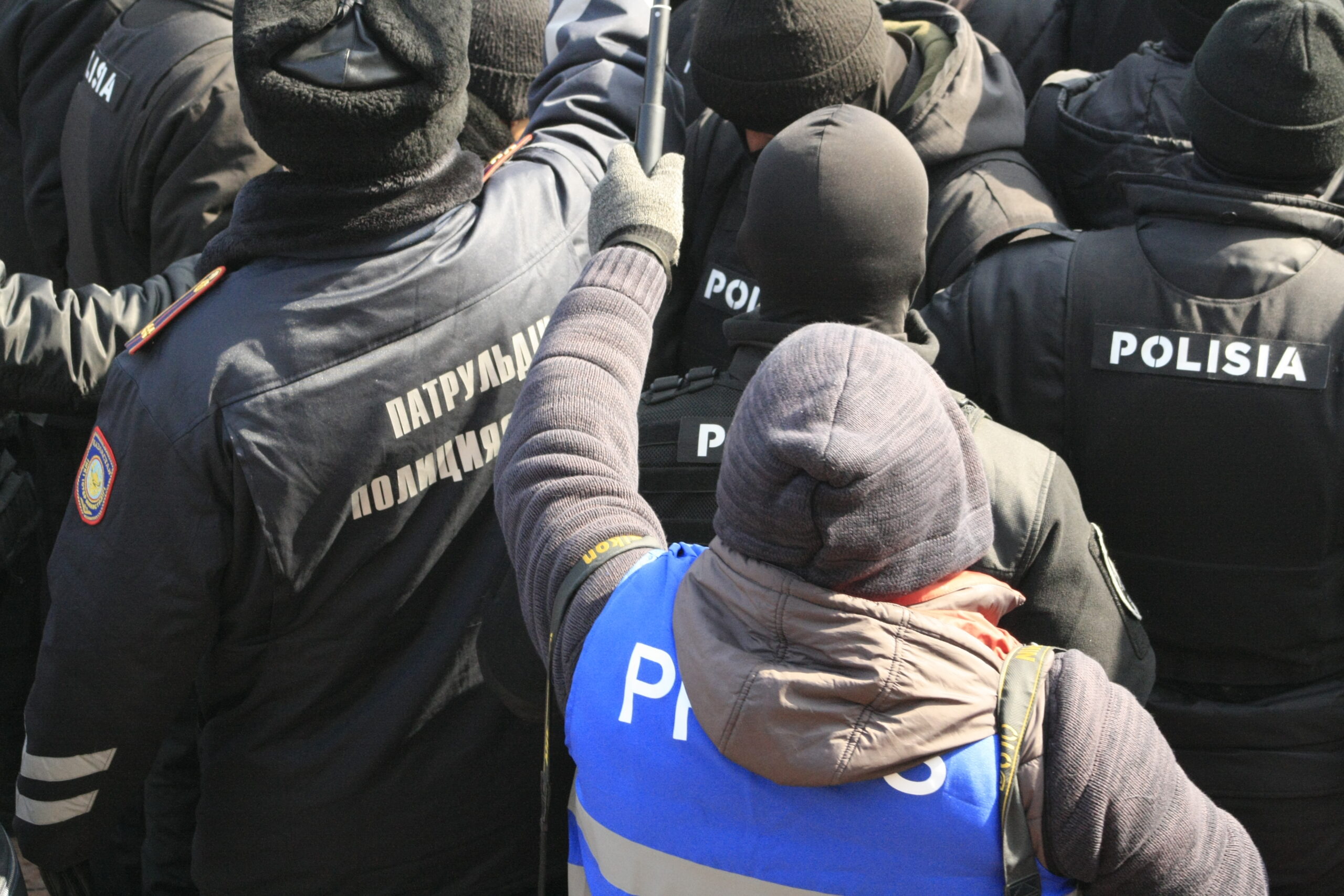
KAZAKHSTAN
AUTHOR OF THE REPORT: INTERNATIONAL FOUNDATION FOR PROTECTION OF FREEDOM OF SPEECH
PHOTO: MADINA ALIMHANOVA, TELEGRAPH AGENCY KazTAG
1/ KEY FINDINGS
In Kazakhstan, 314 incidents of attacks/threats against media professionals and citizen journalists, editorial offices of traditional and online publications, and online activists were identified and analysed in the course of the research for 2021. Data for the study were collected using open source content analysis in Russian, Kazakh and English. A list of the main sources is presented in Annex 3.
- For the last five years, attacks via judicial and/or economic means (of which there were 195 in 2021) have remained the main method of exerting pressure on media workers in Kazakhstan.
- The most common methods of exerting legal and/or economic pressure on media workers were: litigation (50 incidents), persecution for insults to honour and dignity, damage to reputation, violation of privacy (34 incidents) as well as warnings, pre-trial claims, conversations, questioning and other non-procedural actions (28 incidents).
- The main perpetrators of threats to media workers, bloggers, and online activists in Kazakhstan during this period were government officials (56%).
- Attacks and threats of a non-physical nature and/or cyber-attacks were the second most common method of exerting pressure on journalists. The number of such attacks has tripled since 2017. In 54% of cases, these threats came from government officials.
- In 2021, 21 cases of physical attacks and threats to life, liberty, and health of media workers were recorded. All of these cases involved non-fatal attacks, beatings, injuries or torture. In 95% of cases, journalists were attacked while carrying out their professional duties.
2/ THE POLITICAL SITUATION AND THE MEDIA IN KAZAKHSTAN
In the latest Reporters Without Borders “World Press Freedom Index 2022″, Kazakhstan’s position significantly improved, ranking 122 out of 180 (in 2021, the country ranked 155th). According to the NGO, “while the quality of online news is improving, repression is modernising, with growing control of the internet, which is the only space where an independent press is granted freedom of expression.”
According to the Freedom House report “Freedom on the Net 2021: The Global Drive to Control Big Tech” Kazakhstan has marginally improved its position, receiving 33 points out of 100 on their internet freedom indicator (having received 32/100 in 2020). The country is therefore still categorised as having a “Not Free” internet.
According to the Ministry of Information and Social Development, as of August 5, 2021, 4,873 domestic and foreign media outlets were registered in Kazakhstan (4,606 domestic and 267 foreign). 3,541 of these are printed media, 184 are television channels, 79 are radio stations, and 802 are news agencies and online publications.
ELECTIONS TO THE LOWER HOUSE OF PARLIAMENT: REGULATIONS AND THE POSITION OF THE MEDIA
On January 10, 2021, two days before the parliamentary and local elections, the Ministry of Information and Public Development published “Recommendations for the media on the Day of Silence and on Election Day.” Here, the Ministry included a reminder about the ban on any election campaigning and recommended “closing comments sections under existing online resources or carrying out moderation to prevent the posting of any comments with calls to vote for a particular political party. Publishing materials about the professional activities of candidates from political parties without indicating their party affiliation, however, is permitted.
Only the media are permitted to cover the elections and broadcast news about the elections. The Central Election Commission recommended that election observers “avoid making any public comments and refuse interview requests.”
Prior to the parliamentary elections, pressure against independent observers and activists increased. Civil activists were arrested on charges of calling for illegal protests or for being involved in banned organisations. Several human rights organisations received multimillion-dollar fines from the tax authorities and were forced to suspend their activities for three months.
During the electoral period (and on the January 10 election day), the list of election observers was strictly limited, and independent journalists were obstructed.
Despite the fact that the requirement for mandatory PCR testing for journalists covering elections was only introduced on June 25 (and was only for those covering the elections of village “akims”, on election day, members of election commissions refused access to journalists or removed them from polling stations. Quarantine restrictions and the absence of a negative PCR test were cited as reasons for this.
The resolution adopted by the European Parliament on February 11 “On the human rights situation in Kazakhstan” highlighted that: “Systemic shortcomings regarding respect for freedom of association, assembly and expression continue to hamper the political landscape, and the absence of genuine political competition and opposition groups (no new parties have been registered since 2013) has left voters with no real choice.” They also noted that “All major opposition national newspapers were banned in 2016, and independent journalists continue to face harassment.”
THE COVID-19 PANDEMIC AND MEDIA SITUATION
In 2021, COVID-19 quarantine restrictions of varying severity continued in Kazakhstan.
A ban (introduced on March 16, 2020) on recording of any kind in hospitals, ambulances, quarantine rooms, during medical assitance at home, during an epidemiological investigation, or during interviews and questioning of patients and “contacts,” was valid until September 20, 2021.
Meetings of state bodies were held remotely. Live broadcasts of meetings were disrupted in some cases. Journalists were required to send their questions in advance and often faced difficulties in submitting them. At briefings and press conferences, moderators only presented speakers with the more “convenient” questions.
In April, journalists addressed the President of Kazakhstan with an open letter regarding the problems relating to access to information, exacerbated by the pandemic and quarantine restrictions. The authors of the appeal state that officials used these restrictions as an excuse to sequester themselves from the press.
On September 29, the Central Communications Service (CCS) under the President of the Republic of Kazakhstan announced the return of “in-person” press events. No more than 15 people were allowed in the press centre, including journalists and videographers. The list of journalists was chosen by the CCS. For each event, the first 15 people who apply via the WhatsApp chat “OҚҚ/CCS Briefing” are given accreditation. Questions can be asked in-person, and online via ZOOM: The CCS monitors the observance of the order according to the requests in the chat.
On July 1, a clause was introduced by the Chief State Sanitary Doctor of Kazakhstan to restrict workers who have not received their COVID-19 vaccination from entering full-time work. Mandatory weekly PCR testing was introduced for unvaccinated employees of these organisations. The list of organisations includes communications and telecommunications providers, as well as media editorial offices.
LEGISLATIVE REGULATION OF THE MEDIA AND JOURNALISTS’ ACTIVITIES
In 2021, several draft amendments to laws were submitted, which would (if adopted) allow for significant restrictions on the work of the media and journalists to be introduced.
On September 15, the lower house of parliament approved a high-profile bill: “On Amendments and Additions to Certain Legislative Acts of the Republic of Kazakhstan on the Protection of the Rights of the Child.” The draft law, initiated by deputies from the ruling Nur Otan party, contained a number of rules that restricted access to foreign internet sites, social networks, and messaging platforms, if the owners of these sites did not register, or open offices in, Kazakhstan. The head of the representative office (who must be a citizen of Kazakhstan) must, within 24 hours, comply with the instructions of the authorised body regarding cyberbullying against children, and take steps to remove or limit the dissemination of this information.
This draft amendment was roundly criticised by human rights activists, journalists and other civil society advocates: “We are convinced that this approach is ineffective, and the tactics of introducing amendments, under the pretext of protecting the childrens’ rights, is manipulative.”
According to human rights activists, there are now only 12 countries in the world in which the authorities block instant messengers and social networks. These countries can hardly be classified as developed and are at the extreme lower end of the freedom of speech ratings.
In April, the Ministry of Digital Development, Innovation and Aerospace Industry published a draft law for consideration, in which, among other things, it proposed the introduction of a “right to be forgotten.” If an “individual or his legal representative applies, the owner of the online resource is obliged to remove outdated or irrelevant personal information about this individual.” What is considered to be information of a “personal nature,” and in what cases it cannot be deleted, was not specified.
Human rights activists opposed its adoption, considering it to be in violation of the constitutional right to seek and receive information, as well as the fact it created an obvious imbalance between private and public interests.
On November 30, the bill was submitted to parliament for discussion without the “right to be forgotten” clause.
On March 11, the Minister of Information and Social Development, Aida Balaeva, approved the new version of the Rules for the Accreditation of Journalists, which were criticised by journalists and human rights activists during its discussion.
These rules would make it possible to deprive a journalist of accreditation with a state body for disseminating supposedly false information which discredited their business reputation. At the same time, it was not specified who would determine whether something was false or discrediting information, or whether this necessitated a court’s intervention.
The concept of a “leader” was also introduced in these new rules. These individuals are responsible for monitoring the observance by topic participants, regulations, as well as public order. How this individual will be chosen is not specified. Fears that the leader appointed by the organiser would become a kind of censor were confirmed in practice.
3/ GENERAL ANALYSIS OF ATTACKS
Compared to 2020, the number of attacks in 2021 decreased by 8%. The number of physical attacks decreased by 12% and the number of attacks via judicial and/or economic means decreased by 26%. The number of attacks of a non-physical nature and/or cyber-attacks, however, increased by 75%.
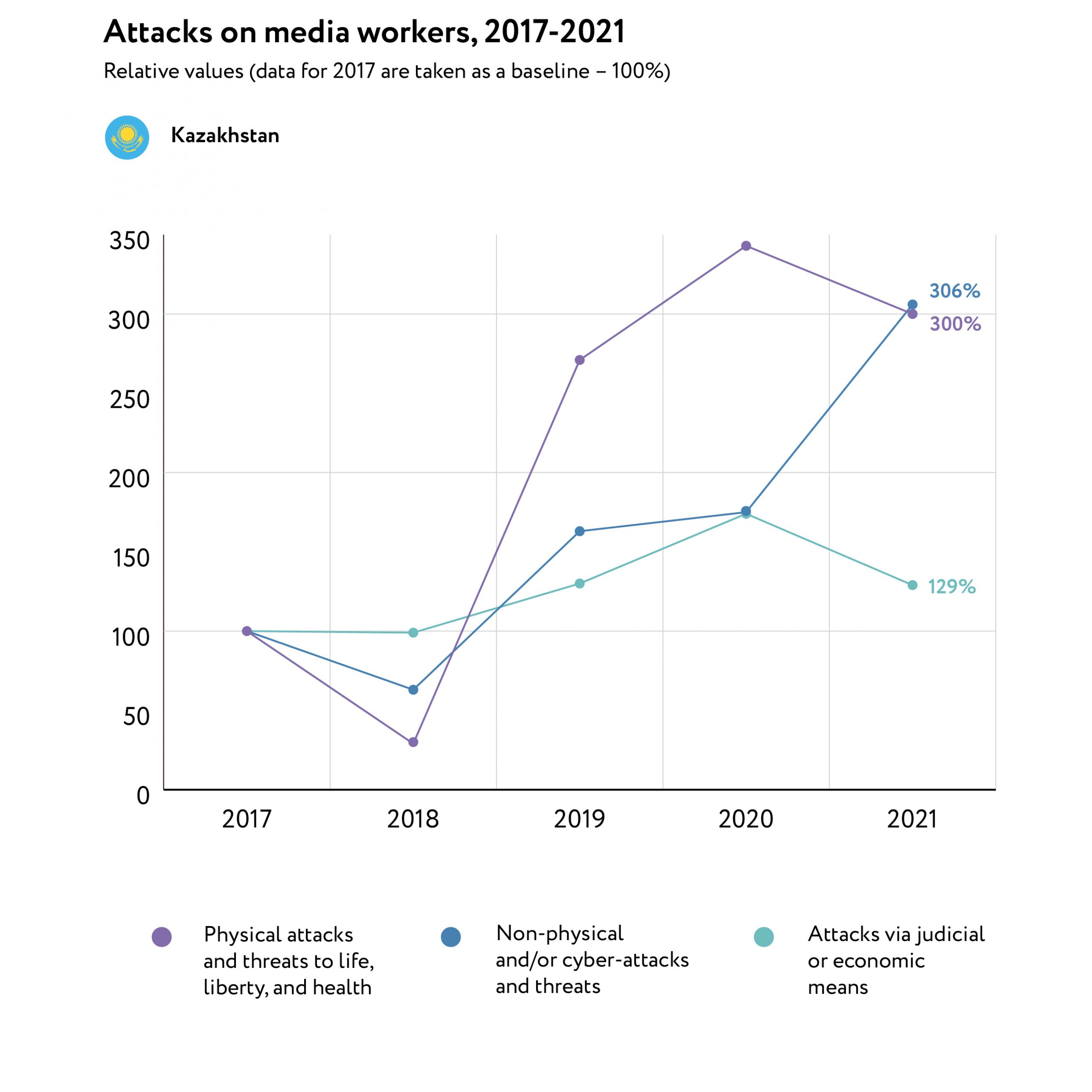
Of the 98 recorded incidents of a non-physical nature, 42 pertain to the illegal obstruction of journalistic activities, and/or deprivation of access to information. The second common method was harassment, intimidation, threats of violence and death, including online threats (24 incidents). The primary aim of these threats was to prevent journalists from covering socially significant and pressing topics. Every incidence of pre-trial investigations, which were initiated due to journalists’ statements, was closed “due to the absence of a criminal offense having been comitted.”
In 56% of cases, attacks on media workers were committed by government officials (176 out of 314). In 35% of cases, the attacks were from individuals who were not representatives of the authorities (112 incidents), and in 8% from unknown persons (26 incidents).
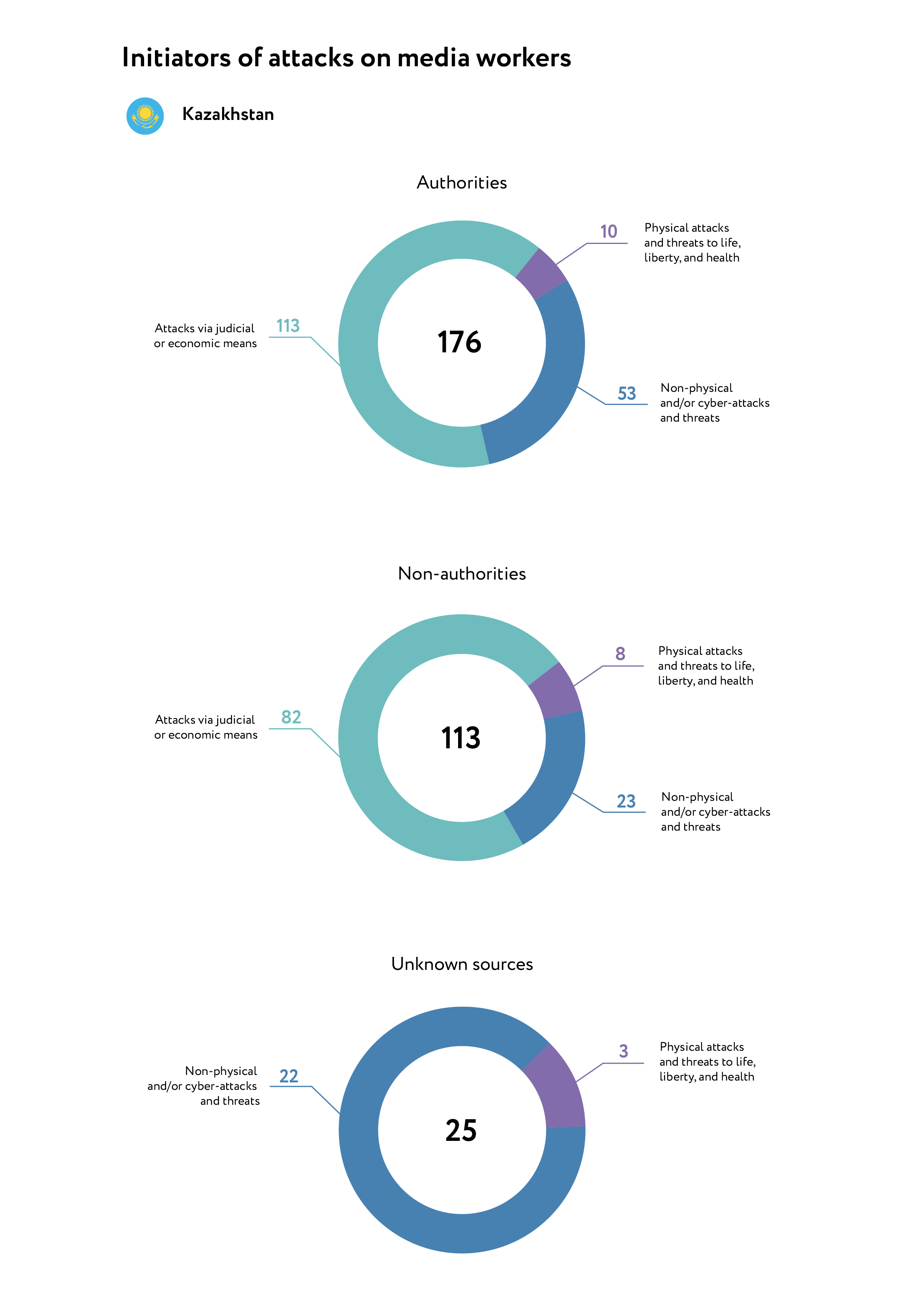
In order to more accurately reflect the combined attacks on media workers, a new category of attacks, “hybrid attacks,” was introduced in 2020.
We are calling systematic persecution of some publication or media worker with the use of tools from two or more categories of assaults – physical, non-physical, and judicial/economic – “hybrid”. Such a combination of means involving and not involving force with judicial means of pressure on undesirable journalists is carried out with a view to demoralising them or getting them to self-censor or to give up the profession or even life itself.
In 2021, 21 hybrid attacks were recorded against four journalists, bloggers, and online activists.
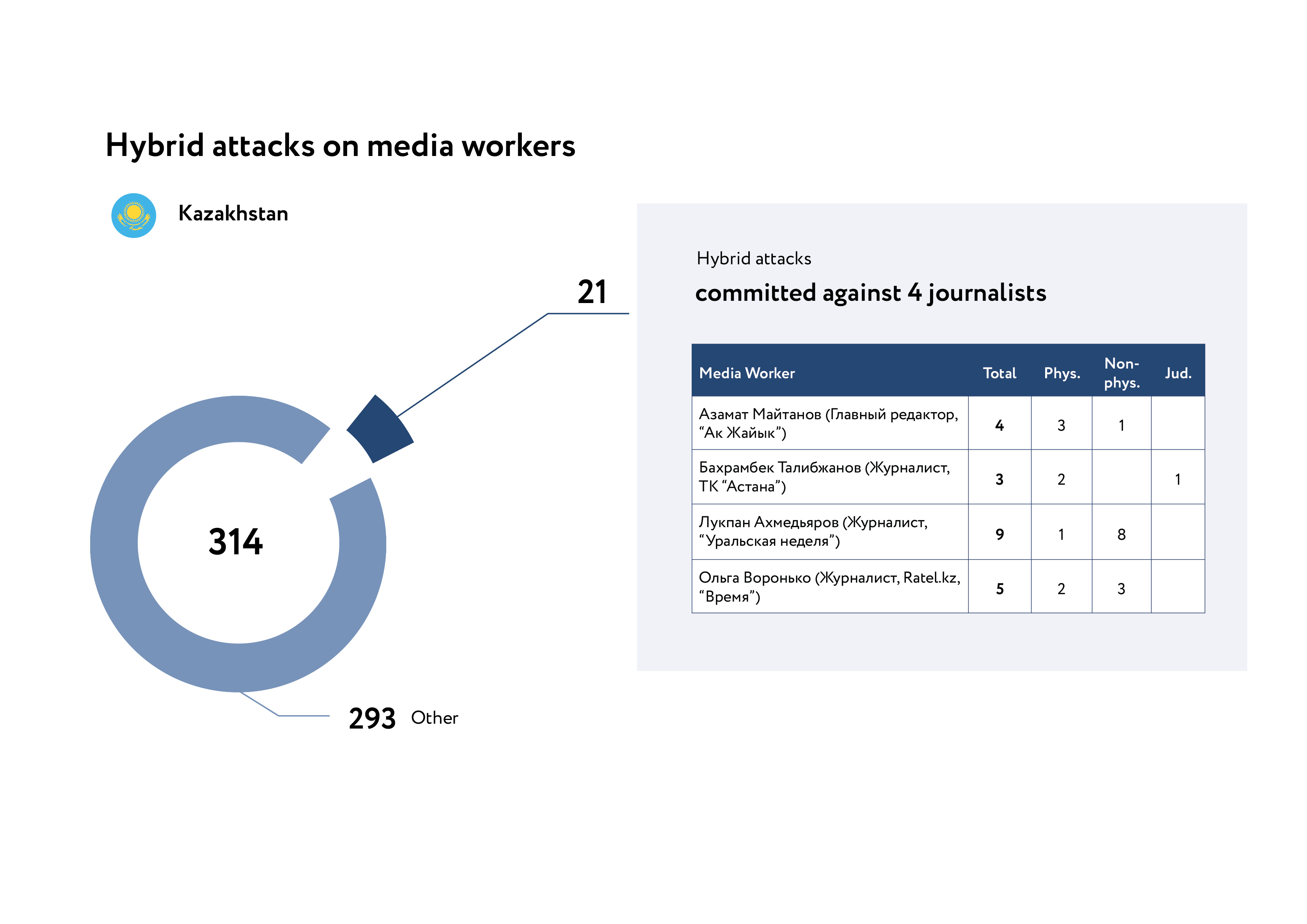
Coronavirus restrictions continue to be used to discourage journalistic activities. In 2021, 15 such incidents were recorded: 12 unlawful obstructions of journalistic activities, 1 non-lethal attack, and 2 criminal/administrative cases:
- On January 10, Nurzhan Iskakov, chairman of the Almaty precinct election commission, acted aggressively towards a Radio Azattyk correspondent. The journalist was pushed out of the polling station, as he allegedly did not have a negative PCR test.
- On July 29, the Almaty Department of Sanitary and Epidemiological Control fined Russian blogger Gusein Gasanov under Article 425 of the Code of Administrative Offenses: violating the “requirements of legislation in the field of sanitary and epidemiological welfare of the population, as well as hygiene standards.” They were fined 87,510 tenge (more than $200). The administrative case stemmed from a meeting with fans in Almaty during quarantine restrictions.
- On July 17, in Almaty, police cordoned off the streets leading to the city’s akimat, where a rally against forced COVID-19 vaccination was to be held. The police refused to let anyone into the city administration building, including journalists. A police officer told Daniyar Musirov and Yuna Korosteleva of the Vlast online magazine, that “the akimat is closed due to quarantine measures.” That same day, security forces stopped journalists nearly every hundred metres to check their documents. There was also no mobile internet signal near the area of the planned rally.
4/ PHYSICAL ATTACKS AND THREATS TO LIFE, LIBERTY, AND HEALTH
The number of physical attacks in 2021 tripled compared to 2017, from 7 to 21. In 2021, all incidents of this nature were non-fatal attacks, beatings, injuries, or torture.
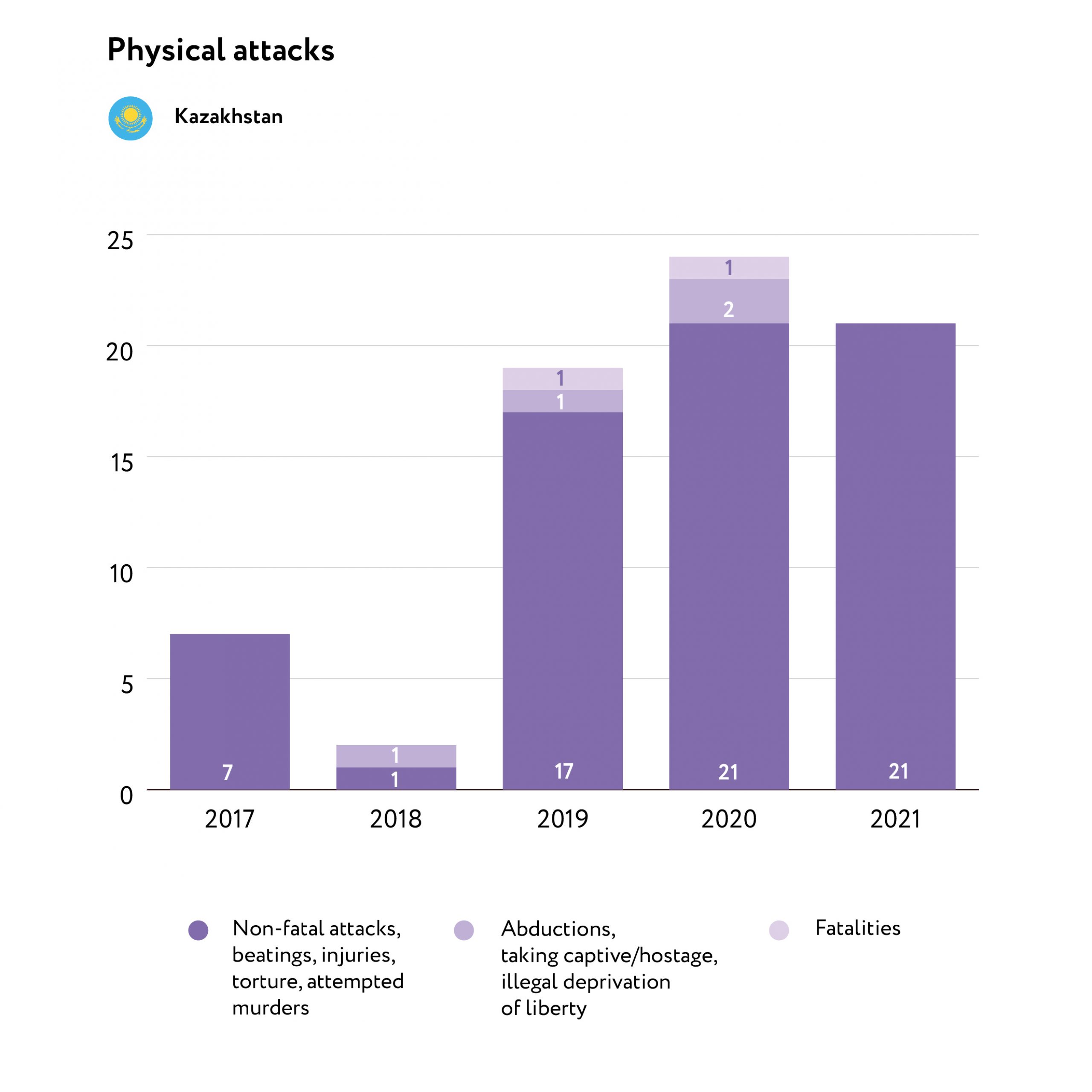
In 90% of cases, attacks on journalists were committed while they were carrying out their professional activities. In 10 cases, the perpetrators of the attacks were government officials, in 8 cases the attacks came from individuals who were not representatives of the authorities, and in 3 cases they came from unknown persons.
- Alexandra Sergazinova, editor at the “Tobol-info” news agency, was injured on January 30, while covering a raid by a quarantine compliance monitoring group in Kostanay. A security guard at the Jon Snow karaoke bar forcibly took away the journalist’s mobile phone, which she was using to film. She was pushed out of the building and sustained injuries as a result. The journalist was wearing a vest with the inscription “Press.”
- On March 2, policemen assaulted up Bakhrambek Talibzhanov, a correspondent for the Astana television channel in Shymkent, while covering a fire at an auto parts warehouse. Three police officers restrained Talibzhanov, while another hit the correspondent in the face and stomach.
- Bahrom Abdullaev of Channel 31, was injured by police and had his equipment damaged while covering the detention of protesting jewelry workers in Shymkent on April 4.
- On May 12, a security guard at the Wolt office in Almaty attacked Vyacheslav Timofeev, a videographer for the KTK channel, damaging his camera while he was filming a strike by the company’s couriers.
- On May 27, an unidentified man assaulted 716.kz correspondent Oksana Matasova, while she was filming a piece about child labour.
- On August 2, security at the Dostyk Mall forcibly pushed a film crew from the Khabar television channel – journalists Samat Dzhakupov and Natalya Volkova, and videographer Tolegen Imanov – out of the shopping centre. The journalists were filming a story about a new system to display a person’s COVID status.
- On December 29, Bekbolat Tleukhan, an ex-deputy of the Mazhilis (the lower house of parliament) for the ruling Nur Otan party, attacked Vesti.kg correspondent Ainur Koskina in the parliament building after she asked questions about polygamy. Tleukhan resigned his deputy powers that day. The incident took place in an elevator, where Tleukhan struck Koskina and broke her mobile phone stand.
5/ NON-PHYSICAL AND/OR CYBER-ATTACKS AND THREATS
In 2021, the number of attacks and threats of a non-physical nature and/or cyber-attacks was almost twice as high as in the previous year (98, up from 56). 75 journalists and media workers, 12 bloggers and 11 online media outlets were subjected to attacks and threats of a non-physical nature and/or cyber-attacks.
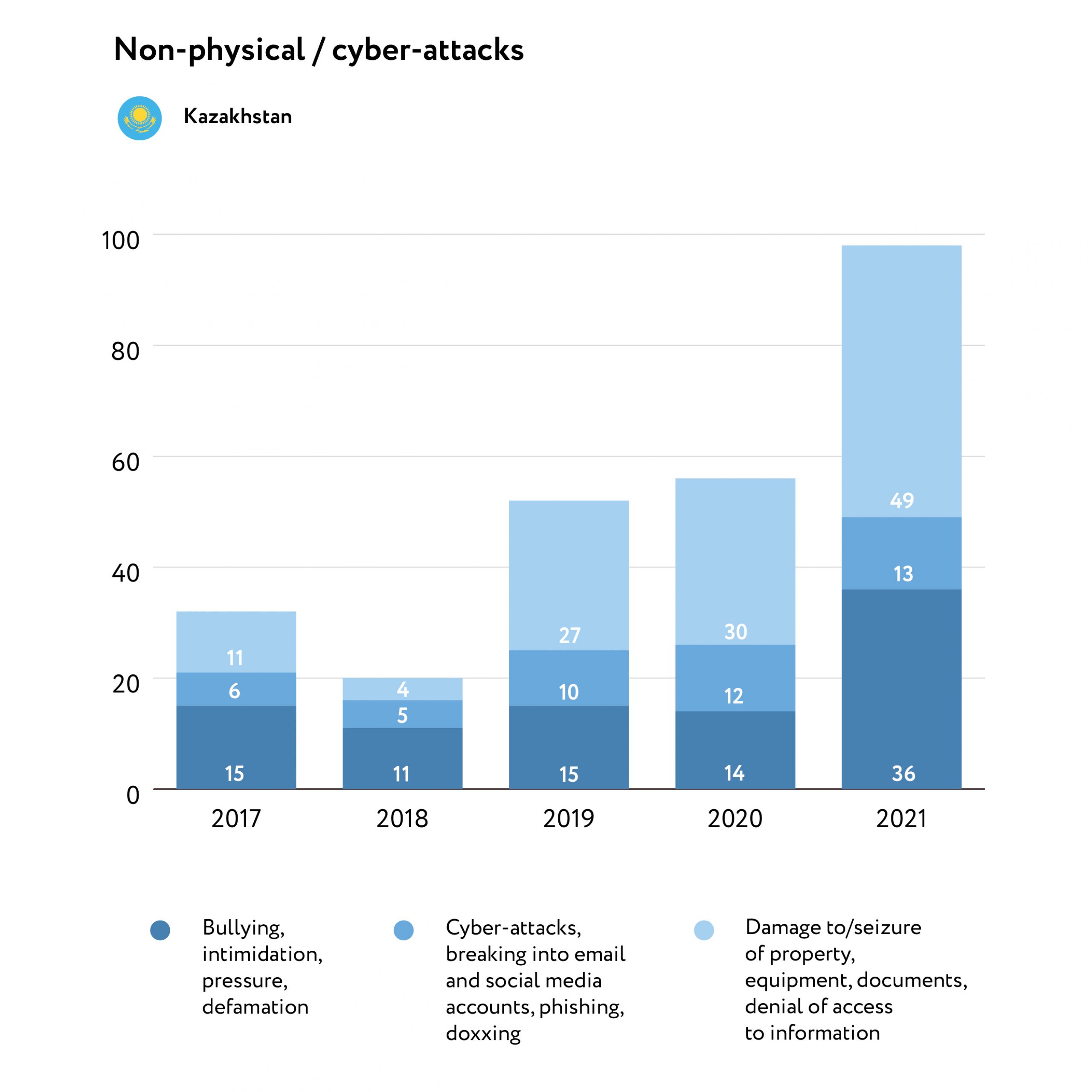
Since 2020, the number of incidents related to illegal obstruction of the legitimate professional activities of journalists and bloggers has increased 2.5 times, from 17 to 42. The number of incidents related to harassment, intimidation, pressure, threats of violence and death (including online threats) has almost doubled, from 14 to 24.
In July, the Organized Crime and Corruption Reporting Project (OCCRP) published information about the use of cutting-edge Pegasus spyware to wiretap journalists, politicians, and civil activists in more than 10 countries around the world, including Kazakhstan. In their study, OCCRP cites the names of journalists Serikzhan Mauletbai and Bigeldy Gabdullin, as well as online activist and human rights defender Bakhytzhan Toregozhina.
NON-PHYSICAL ATTACKS ON ONLINE MEDIA OUTLETS
Bullying, intimidation, pressure, and threats of violence and death, including online threats (7 incidents), were the main method of non-physical attacks on online media outlets. This pressure was typically used to force editorial offices to remove published materials.
- On January 18, after publishing a piece about a fire in Almaty, editors at Ratel.kz received a letter from M. Sluchenkova, who said she was a marketer for a group of companies located in the office building where the roof had caught fire. Sluchenkova complained and threatening legal action, threatened to spread information that Ratel.kz had received bribes, and demanded that the article be removed from their website.
- On September 1, editors at The Village Kazakhstan reported that they were threatened and received demands to take down a report by journalist Asem Zhapisheva about the life of a boy from Abay and his family, after violence was comitted against them. “We are forced to report that at present our editorial office is being attacked by unidentified persons representing various institutions, insisting that we remove the article. We demand an end to pressure on independent journalists. We do not intend to remove the material,” The Village Kazakhstan wrote in a statement.
- On September 6, editors at Pravo.kz were subjected to pressure following a Facebook post about students at the Taldykorgan Medical College not receiving their stipends. “After publication, we received calls from the college, asking us to remove an individual’s surname. They tried to find out our identities, and then threatened to sue us” claimed the editorial board.
Two cyberattacks were recorded:
- On January 10, the day of elections and protests in Kazakhstan, from 10:00 to 11:30 a.m., the website of the independent online publication Vlast was subject to a DDoS attack.
- From mid-September, the site of the independent media outlet HOLA News Kazakhstan was subjected to several cyberattacks, which the site’s IT service managed to block. As of October 4, the site is unavailable to readers both in Kazakhstan and abroad.
A statement was made on January 10 during the elections to the lower house of parliament, discrediting the independent publication Orda.kz. The head of the Almaty territorial election commission said that Orda.kz’s reports of ballot stuffing during the parliamentary elections were false.
NON-PHYSICAL ATTACKS ON BLOGGERS AND ONLINE ACTIVISTS
In 2021, three incidents were recorded involving the hacking of bloggers and online activists on social networks, as well as one attack related to theft, dissemination of personal data, phishing and doxing:
- On January 10, the day of elections to the Majilis, Askar Shaigumarov, a blogger from Uralsk, reported an attempt to hack his Facebook page.
- On March 16, online activist Baibolat Kunbolatuly reported that his Facebook account and email had been hacked. This took place while he was live streaming a demonstration outside the Chinese consulate in Almaty, where a group of Kazakhs demanded the release of their relatives from Chinese “re-education camps” and prisons. On March 17, Baibolat Kunbolatuly’s WhatsApp account was also hacked. Spam videos were sent from his account.
- On November 24, activists from the unregistered “Oyan, Qazaqstan!” (Wake up, Kazakhstan!) movement received a warning from Apple that their iPhones had been targeted by government-backed hackers. The movement’s Telegram account published the names of these activists, including journalist and activist Asem Zhapisheva and blogger Temirlan Ensebek.
The following incidents were also recorded:
- On May 15, the Qaznews24 Instagram account was closed due to threats received by its admin, Temirlan Ensebek, an activist from “Oyan, Qazaqstan!” The satirical posts in question were on the page for a short time.
- On June 26, video blogger Maxim Ponomarev, who covers the city life of Stepnogorsk on his YouTube channel PMcanal, received threatening calls from unknown individuals, strongly recommending that he not protest the construction of an industrial waste incineration complex.
- On July 25, Mirshat Sarsenbaev, a blogger from the Kostanay region, had his car windshield covered in paint and his tyres slashed. The day before, the blogger had published criticism on VKontakte about the district akim elections.
NON-PHYSICAL ATTACKS ON JOURNALISTS AND MEDIA WORKERS
2021 saw a sharp increase in the number of incidents related to obstruction of the professional activities of journalists (40, up from 27 in 2020). The main perpetrators of the attacks against journalists were government officials (30 out of 40 cases).
The number of such incidents increased during the elections to the lower house of parliament and rural akimats. Journalists were prevented from entering polling stations during voting and were not allowed to be present during vote counting. In all cases, the perpetrators of these incidents were government officials.
- On January 10, the Nur-Sultan Electoral Commission No. 318 chairwoman refused to start counting votes until Radio Azattyk journalist Saniya Toiken had left the premises. Three policemen removed Toiken from the hall and locked the door from the inside.
- On January 10, Yerzhan Bakhytbek, chairman of the Aktobe election commission (No. 28), prevented Radio Azattyk reporter Zhanagul Zhursin from taking photos and videos of members of the election commission. The chairman demanded that “only the ballot box” be included in the footage. Zhursin received permission to take photos and videos after she complained to Gulnara Kunbayeva, chairperson of the Aktobe regional election commission.
12 incidents relating to the non-admission of journalists due to coronavirus restrictions were recorded (5 of which were recorded on January 10).
- On January 10, Radio Azattyk reporter Asylkhan Mamasuly, who covered the elections in the Almaty region, drew attention to the fact that some voters placed more than three vote slips into the ballot box (in some regions, three ballots are given out: for elections to the Mazhilis, the district maslikhat and the regional maslikhat). After that, the chairman of the local electoral committee demanded that the journalist leave the precinct. The fact that the Almaty region is in the “yellow zone” of COVID-19 risk, and journalists can not spend more than 5 minutes at the polling station, was used as justification.
- On January 10, Orda.kz correspondent Saule Sadenova was forbidden from entering a polling station in Almaty on the grounds that she did not have a negative PCR test. At the same time, the decision by the medical authorities does not contain any clauses about journalists needing to have taken tests. Half an hour later, after another reminder of the rules, the journalist was allowed to enter.
Another common method of attack was harassment, intimidation, pressure, violence, and death threats, including online threats. In five cases, these threats came from government officials, in six cases they were from individuals who were not representatives of the authorities, and in four cases they were from unknown persons.
- On January 10, the chairman of the election commission accused Azattyk journalist Sanya Toiken, who filmed the members of the election commission, of breakign the law. They were threatened with legal action and the stripping of their journalistic accreditation.
- On March 27, Timur Gafurov, editor-in-chief of “Nasha Gazeta,” was threatened by an individual going by the name Kairat Akilbaev. The man contacted the publication’s editorial office via WhatsApp to demand that a 2010 article about a lawsuit brought against a police lieutenant following the murder of a disabled person, be removed from their website. At first, the user threatened to take legal action. After the editor refused to delete the article, the user wrote: “The address of the editorial office is on the internet. I am in Zhitikar, I come to Kostanay a lot.”
- On April 4, while covering a protest rally in Shymkent, unidentified individuals threatened to kill Astana TV correspondent Bakhrambek Talibzhanov.
- On June 12, Azamat Maitanov, editor-in-chief of the Ak Zhaiyk newspaper, filed a complaint with the police following a number of threats made against him, as well as the newspaper’s journalists, and his family. These threats to life and health came from an internet user with the nickname Satan, as well as some other accounts.
- On September 1, The Village Kazakhstan journalistAsem Zhapisheva, after publishing a piece entitled: “The Boy from Abay: How the Victims of Violence Live Three Years Later,” was forced to turn off her phone because of threats from unknown individuals.
6/ ATTACKS VIA JUDICIAL AND/OR ECONOMIC MEANS
In this category, the main methods of exerting pressure on media workers in 2021 were: lawsuits (50), prosecution for insults to honour, dignity, damage to reputation, and violation of privacy (34); warnings, pre-trial claims, questioning, interviews, and other non-procedural actions (28). In 58% of cases, the perpetrators of these attacks were government officials (113 incidents out of 195).
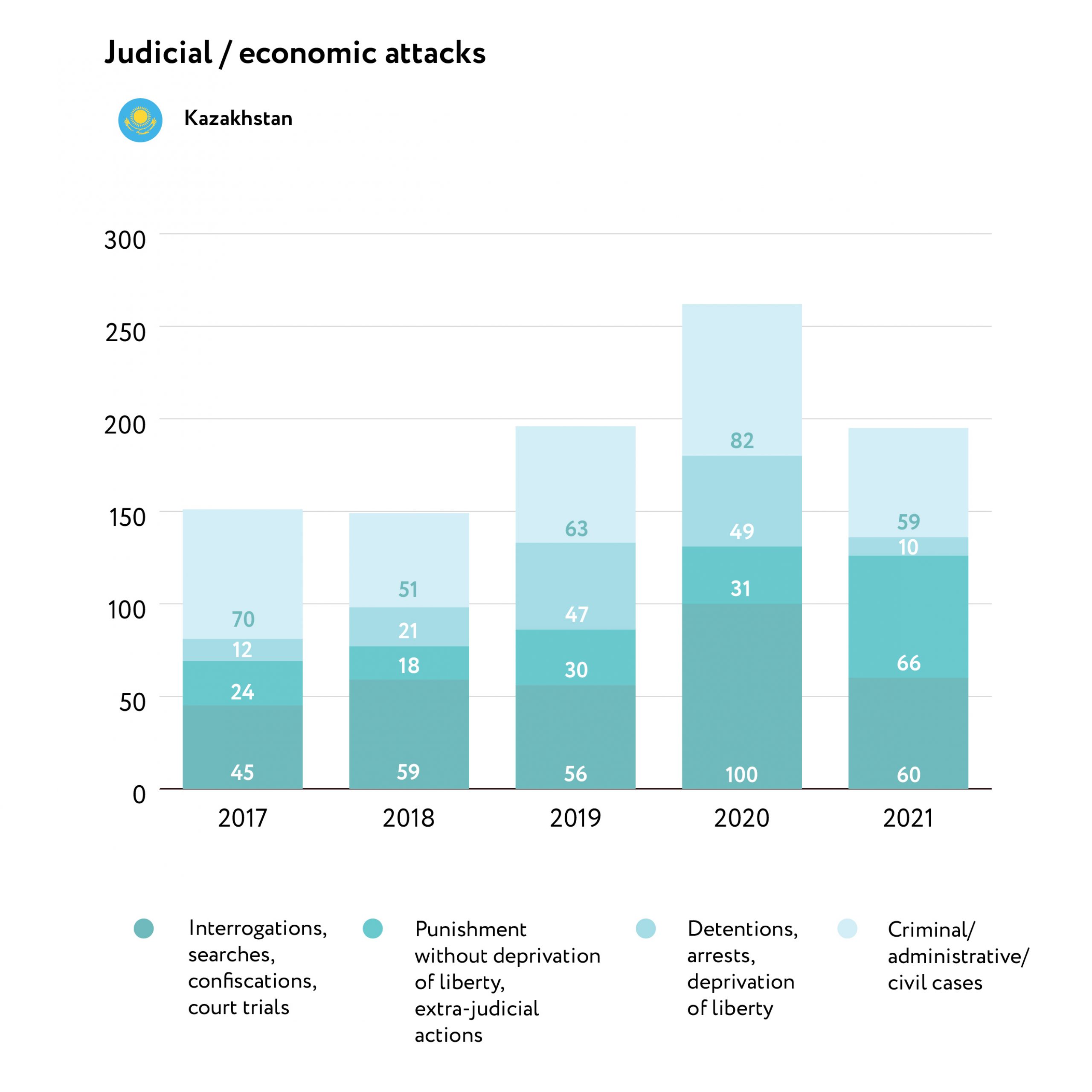
In 2020 attacks in the form of detainment (22), arrests, preliminary detention, and detainment in pre-trial detention centres (16) were widely used. However, in 2021, the number of such cases has fallen to 6 and 2, respectively.
- On February 1, online activist Sholpan Otekeyeva was found guilty of libel and arrested for 20 days by an administrative court for reposting a message on Facebook about the persecution of a civil activist.
- On February 3, Lukpan Akhmedyarov, editor-in-chief of Uralsk Weekly, and deputy editor Raul Uporov, were detained by police. According to Uporov, after Akhmedyarov was pulled over on charges of failing to appear for a police interrogation, but they drove away. After a few kilometres, police caught up with him and demanded that he stop. The driver was informed that he was suspected of involvement in an accident in Uralsk, as his car matched the description of the vehicle in question. After that, he escorted to the village of Chapaevo to give testimony.
- On July 27, Nur-Sultan police officers detained the editor-in-chief of Uralsk Weekly, Lukpan Akhmedyarov, and videographer Isatai Duisekeshov. They had filmed a panorama of the city using a drone. Police demanded that the journalists produce evidence that they had permission to fly a drone in the area. The police themselves, however, could not specify which authority was responsible for issuing such permits.
CRIMINAL/ADMINISTRATIVE CASES AND PROSECUTION FOR VIOLATIONS OF PRIVACY, AND INSULTS TO HONOR, DIGNITY AND REPUTATION
In 2021, 59 attacks relating to the initiation of criminal and administrative cases were recorded, as well as the civil prosecution of journalists. In 30 of these cases, the attacks were perpetrated by government officials.
- One particularly resonant example of this was the civil lawsuit (for the protection of honour, dignity, and business reputation) initiated by Bauyrzhan Baybek, the first deputy chairman of the ruling Nur Otan party and ex-mayor of Almaty; against blogger and political activist Zhanbolat Mamai and his wife, journalist Inge Imanbai. The basis for the lawsuit was Mamai’s investigative film “Bauyrzhan Baybek: the corrupt business empire of the son of Nazarbayev’s classmate,” which was published on YouTube. On June 15, the court ordered the defendants to remove the film from social media and cover Baybek’s legal expenses. The decision was partially carried out – Baybek was paid for his legal expenses. Mamai and Imanbai refused to take down the film and were fined for non-compliance with a court decision.
- On August 19, blogger Yermek Taychibekov was sentenced to seven years in prison. He was found guilty of inciting ethnic hatred via the media. The blogger pleaded not guilty. Taychibekov was detained in September 2020, allegedly because of an interview in which he criticised the Kazakh authorities’ national policy.
- On April 29, a court sentenced blogger and journalist Aigul Utepova to a year of restricted movement and 100 hours of forced labour on charges of participating in the activities of a banned organisation. Utepova was banned from engaging in public and political activities for three years, including working in the media and telecommunications. The prosecution claimed that Utepova posted material on social media in support of the “Democratic Choice of Kazakhstan” and “Köşe Partiasy” movements, which were recognised by the Kazakh court as “extremist,” but are considered to be peaceful opposition organisations by the European Parliament. Aigul Utepova denies the allegations.
- On June 29, police officer Artem Stolyarchuk filed a lawsuit against SAPMAR LLP (the Ratel.kz analytical portal) and Ratel.kz correspondent Dmitry Matveev in a civil court, citing damages to their honour, dignity, and business reputation. The plaintiff demanded that the information in Matveev’s article be recognised as untrue and libellous, and that the defendants be made to issue a retraction and pay 2 million tenge (4,200 USD) in compensation for moral damage. On June 29, the court partially fulfilled these demands, recognising that the title of the publication and subsequent claims that Stolyarchuk was sent to a pre-trial detention centre were untrue and discredited his honour and dignity. The defendants were instructed by the court to publish a retraction, reimburse Stolyarchuk 140,000 tenge in compensation, plus a further 150,000 tenge to cover legal expenses, and pay their own state fee.
Litigation took place on the following charges:
- Organising and participating in an illegal protest
On June 22, Boybolat Kunbolatuly, an online activist fighting for the release of his brother, who has been imprisoned for several years in Xinjiang, China, was arrested for 15 days. The court found Boybolat guilty of “organising an illegal demonstration in front of the Chinese consulate.” Boybolat stated in court that he did not organise it, and that he was merely a blogger sharing information about the protests. On June 25, the Court of Appeals reduced the sentence to seven days.
- Media defamation
On February 17, by an administrative court ruling, blogger, and online activist Aigul Akberdy was fined 525,060 tenge (more than $1,200) on charges of defamation (Article 73-3 of the Code of Administrative Offenses). The accusation was based on reposted messages on Facebook from the “Blacklist of the Dishonest” page, detailing the persecution of a civil activist by the police. The administrative case against Akberdy was initiated at the request of the colonel of the Beyneu police department.
- Disobeying police
On May 19, blogger Dauren Ukin, who publishes videos on the Azattyk Alany YouTube channel, was subjected to a judicial administrative punishment, in the form of a warning, for disobeying the lawful demands of a police officer. According to investigators, Ukin filmed a video on his mobile phone in the entrance of the police station, and then resumed filming in the office of the deputy head of the police station. He ignored demands from the police to stop filming.
- Violation of the rules for the protection of plant and animal habitats
On January 21, by a court ruling, blogger Azamat Sarsenbaev was found guilty of violating “the rules for protecting plant and animal habitats, as well as the rules for creating, storing, recording and using zoological collections, illegal resettlement, introduction, reintroduction and hybridisation of animal species.” As punishment, an administrative penalty in the form of a warning was given. This stemmed from a drone video, taken by Sarsenbaev, of pink flamingos on Lake Karakol.
Warnings, pre-trial claims, questioning, interviews, and other non-procedural actions (28 incidents) were comitted by representatives of the authorities in 16 cases:
- On July 28, a member of the lower house of parliament, Zhanat Omarbekova, brought a pre-trial claim against the Newtimes.kz news agency and Channel 7. Omarbekova demanded that a retraction be published and the article “Mazhilisman’s daughter-in-law lives in a crisis centre awaiting alimony” from the news agency’s online portal be removed, both from their channel and other sources (Facebook and Instagram).
- On November 8, the deputy akim of the Atyrau region, Kairat Nurlybaev, contacted the Atyrau police department with a pre-trial claim. He demanded that Ak Zhaiyk correspondent Farhat Abilov and editor-in-chief Azamat Maitanov be prosecuted for violations of privacy and personal data protection laws. This stemmed from the publication of a piece claiming that the deputy akim was a defendant in a criminal case under related to the “Assignment or embezzlement of others’ property.” Nurlybaev later withdrew the application.
Other incidents:
- On August 3, the Semey City Court, in the East Kazakhstan Region, issued a decision to deport Russian citizen Serik Ualikhanov, the head of the Alpha Marino media centre, who held a residence permit in Kazakhstan. The Semey Police Department filed an expulsion application to the court, claiming that Ualikhanov had been prosecuted more than six times (once in October 2020 and five times on July 2, 2021). According to the court decision, Ualikhanov must leave Kazakhstan within 10 days. According to the “Law on the Legal Status of Foreigners,” he was prohibited from entering the country for five years after his expulsion.
- On October 15, the founders of HOLA News Kazakhstan, Alisher Kaidarov, Adilet Tursynbekov and editor-in-chief Zarina Akhmatova announced that they were leaving the project. “Circumstances have developed in such a way that, after being blocked for 10 days, we had to give up our basic principles [of honesty and objectivity]. We have removed the article from the site. […] That is why we believe that, in order to remain yourself, leaving is better than staying,” they wrote, in an appeal to readers. The deleted article discussed the “Pandora Papers” and the involvement of more than 35 world leaders and 400 officials from numerous countries (including Kazakhstan) in offshore finance schemes.
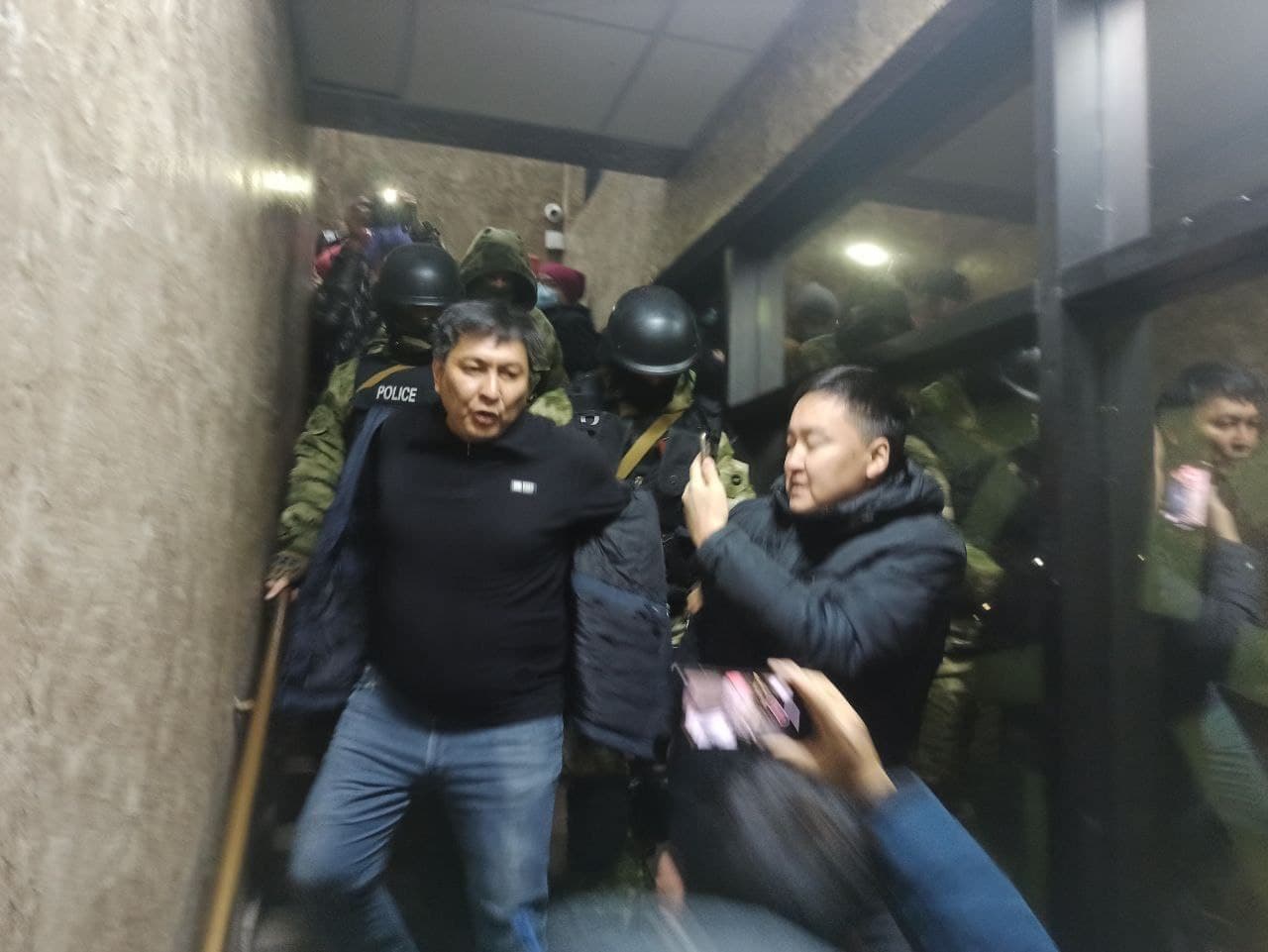
KYRGYZSTAN
AUTHOR OF THE REPORT: SCHOOL OF PEACEMAKING AND MEDIA TECHNOLOGY IN CENTRAL ASIA
PHOTO: AIBOL KOZHOMURATOV’S TWITTER ACCOUNT
1/ KEY FINDINGS
In Kyrgyzstan, 39 cases of attacks/threats against professional and citizen media workers, and editorial offices of traditional and online publications, were identified and analysed in the course of the research for 2021. Data for the study were collected using open-source content analysis in Kyrgyz, Russian and English. A list of the main sources is presented in Annex 4.
- The main method of exerting pressure on media workers, as was the case in the previous year, was judicial and/or economic means.
- 69 percent of the attacks on media workers and organisations were perpetrated by representatives of the authorities.
- The greatest number of attacks was recorded in April 2021, when a referendum on Constitutional amendments and elections to local authorities were held in Kyrgyzstan.
- The kidnapping of independent journalist Ulukbek Karybek uulu during the Prime Minister’s visit to the Issyk-Kul region was a particularly egregious case.
- In 2021, experts noted a deterioration in access to information, as well as an increase in self-censorship and increasing restrictions on freedom of speech.
2/ THE POLITICAL SITUATION AND THE MEDIA IN KYRGYZSTAN
In Reporters Without Borders’ annual Press Freedom Index, Kyrgyzstan moved up three places in 2021 to 79th out of 180 countries. Kyrgyzstan was ranked 82nd in 2020, 83rd in 2019, and 98th in 2018.
According to the annual Freedom in the World report by Freedom House, the country’s rating decreased from 39 points in 2020, to 28 in 2021. For the first time in 11 years, Kyrgyzstan was included in the category of “not free” countries.
In 2021, the socio-political situation in the country was influenced by four electoral events. Human rights activists noted the persecution of those who criticised the new authorities’ policies, plus infringements on freedom of speech and increased pressure on the media during the early presidential, parliamentary, and local elections, as well as the referendum on Constitutional amendments. On the eve of the presidential elections, the Resistance to Political Repressions Committee created in Kyrgyzstan by the civil activist and former member of the SDPK political party, Adil Turdukulov, released a statement about increasing pressure on the media.
These elections contributed to the growth of media activity. In 2021, 224 media outlets operated in the country: 77 online publications, 60 television channels, 60 newspapers and 27 radio stations.
Despite the increase in the number of media outlets, the diversity of opinion expressed through the media became narrower. In 2021, against the backdrop of a political upheaval, coverage of the electoral process was extremely restrained compared to 2020, with minimal alternative and independent information sources and available to voters.
This was the result of increased censorship, including self-censorship, a general deterioration of human rights and freedom of speech, the adoption of the law “On the protection from false and unreliable information”, as well as a decrease in online freedom of expression, and other negative factors affecting media freedom.
In April 2021, after adopting the new Constitution of the Kyrgyz Republic, the authorities quickly revised 359 laws, despite objections from independent experts and journalists. Amongst these were the laws “On the Media,” “On the Protection of the Professional Activities of a Journalist,” “On Television and Radio Broadcasting,” and “On Public Broadcasting Corporation.” These amendments, among other things, returned the Public Broadcasting Corporation to state ownership, and stated that its head will be appointed by the President.
3/ GENERAL ANALYSIS OF ATTACKS
In 2021, 39 attacks/threats were recorded against journalists, bloggers, media workers and editorial offices of traditional and online publications. This is two times fewer than in 2020, when the main risks for the media were associated with political instability and revolutionary events.
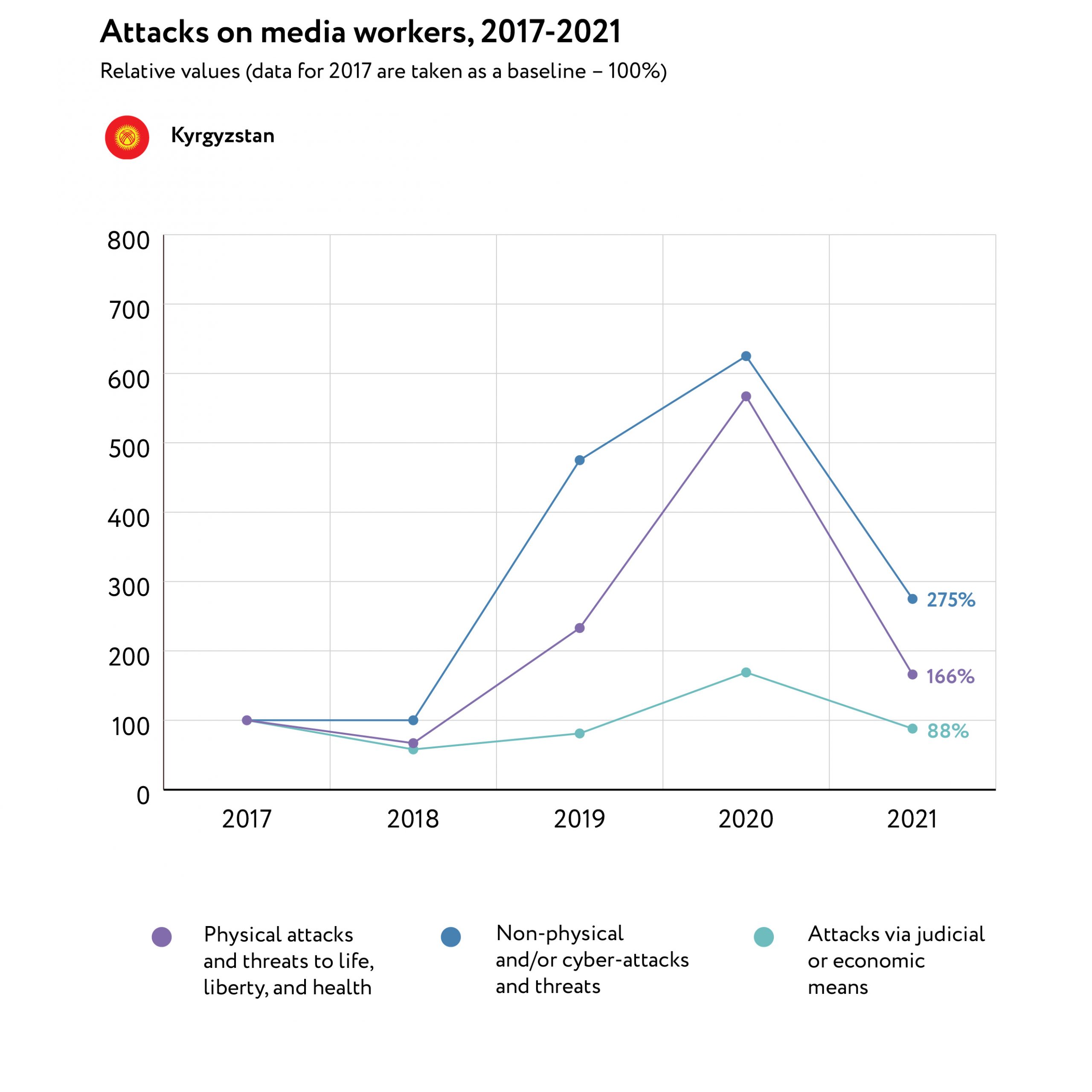
In 2020, the largest number of incidents were recorded during the coverage of protests and the dispersal of demonstrators. Despite the decrease in the number of documented attacks, many media workers in Kyrgyzstan complained of psychological burnout.
In 2021, 26 of the 39 recorded attacks came from representatives of the authorities, 13 – from non-authorities and unknown sources.
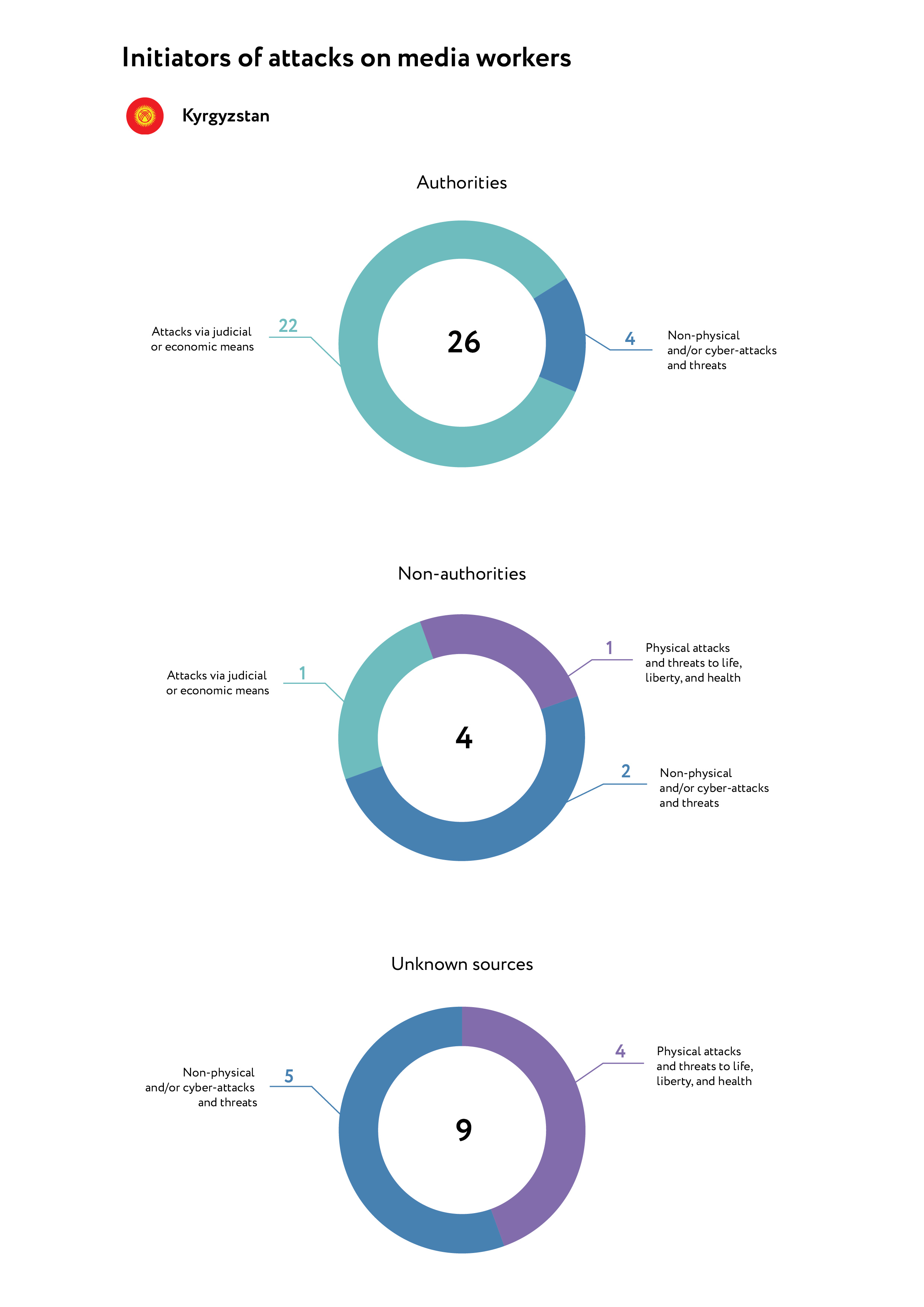
4/ PHYSICAL ATTACKS AND THREATS TO LIFE, LIBERTY, AND HEALTH
In 2021, five cases of physical attacks on journalists were recorded. Four incidents were non-fatal physical attacks, while one involved kidnapping/illegal deprivation of liberty.
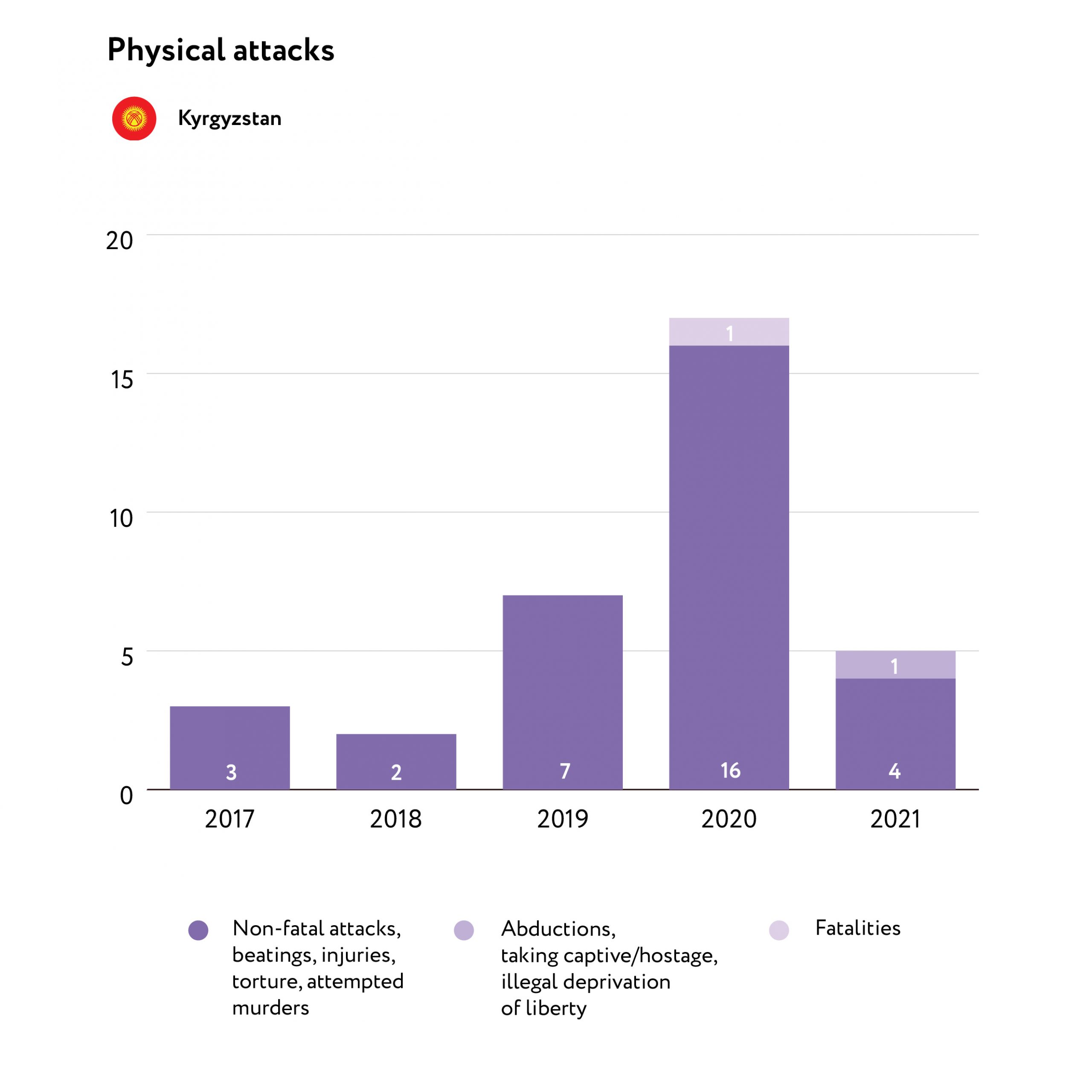
- On April 11, Kloop.kg correspondents Alyima Alymova and Bekmyrza Isakov were broadcasting live, reporting on electoral violations during the elections and the Constitution referendum. They were attacked at a polling station by a group of women, who assaulted the journalists and seized their phones.
- On April 30, Zulfiya Turgunova, a regional correspondent for the news agency “Sputnik Kyrgyzstan,” was attacked. She was covering a meeting between residents of the Batken region with the chairperson of the State Committee for National Security (SCNS) of the Kyrgyz Republic, Kamchybek Tashiev, where the issue of disputed border areas was being discussed. Unknown individuals prevented Turgunova from filming, then knocked her to the ground and began to drag her away. The incident took place in the presence of SCNS security officers and local governor, who did not intervene into the conflict.
- On August 6, independent journalist Ulukbek Karybek uulu was abducted by unknown individuals in the Jeti-Ögüz district of the Issyk-Kul region. This took place around the time of a meeting between Prime Minister Ulukbek Maripov and local residents who had been affected by flooding. The journalist recorded several videos commenting on local issues and criticising Maripov. Three aggressive men approached him and demanded that the journalist leave the area. When he refused, he was dragged into a car and taken away in the direction of Karakol, a city in the region. At one point, the car stopped, and the journalist managed to escape from the kidnappers.
- On November 28, OshTV journalistAbdumalik Bazarbayev was covering the parliamentary elections near a polling station in the city of Osh, when a man ran up to him, began to both physically and verbally attack him, and demanded that he stop filming. As the media later reported, the attacker turned out to be a representative of Aibek Osmonov, a candidate in the Osh single-mandate constituency № 7.
5/ NON-PHYSICAL AND/OR CYBER-ATTACKS AND THREATS
Compared to 2020, the number of attacks associated with harassment, intimidation and slander fell by more than half, from 11 to five. The number of incidents related to the damage and seizure of property, equipment and materials, as well as deprivation of access to information also halved, from ten to five. Only one cyber-attack was recorded.
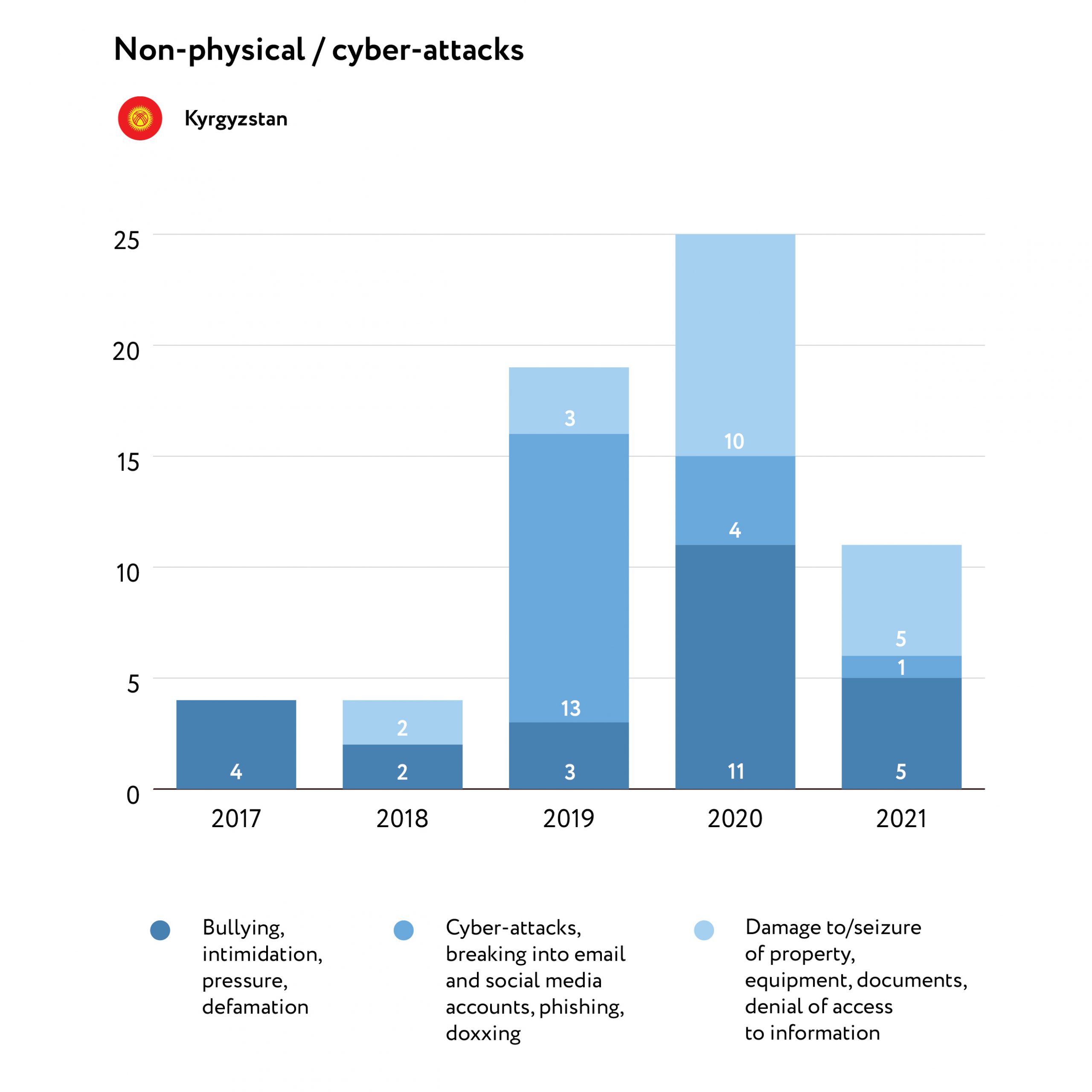
- On April 19, investigative journalist Bolot Temirov, creator of the Temirov Live KG YouTube channel, started receiving threats on social media. Attempts were also made to hack Temirov’s Facebook and Instagram accounts. The journalist was told that “they would come for him” if he did not remove his report on protesters demanding the resignation of the head of the Ministry of Internal Affairs, Ulan Niyazbekov. Temirov wrote that provocateurs at the rally were following instructions from plain-clothes police officers. Investigative journalists from the Temirov Live KG YouTube channel were able to identify several examples of these individuals.
In 2021, four non-physical attacks by government officials were recorded; two attacks were perpetrated by individuals who were not representatives of the authorities, and five were by unknown individuals. All threats were related to journalistic activities, and the main aim of the attackers was to silence media workers.
Non-physical attacks by government officials:
- On January 19, Shaista Shatmanova, host of the Political Cocktail program on SuperTV, received a threatening phone call: she was told to “not bring up the issue” of Raimbek Matraimov, a former deputy of the State Customs Service. Matraimov was investigated a number of times by journalists in relation to corruption and organised crime and was included by the United States on the so-called “Magnitsky list” of sanctioned individuals. The call came after the acting President, Talant Mamytov, was sent a list of questions that would be asked on air.
- On February 3, employees of the SCNS searched the home of Yulia Baranina, the admin of the Pravdorub.kg Facebook page, and confiscated her electronic devices, personal documents, and money. According to the warrant, the search was carried out as a result of provocative statements “aimed at inciting ethnic and regional hatred, as well as content inciting violence.” Baranina had previously reported that she was under surveillance and her phones had been wiretapped.
- Late at night on April 19, a group of police officers came to the house of April TV journalist Kanat Kanimetov’s relatives, in the town of Balykchy. The journalist lives and works in Bishkek. His relatives were told that “a command came from their superiours” to establish the whereabouts of Kanimetov, as he had allegedly ignored a summons for interrogation. “One of the policemen, it turns out, even frightened my family by conducting a search of the house… and forced them to sign some kind of paper stating that I do not live there,”the journalist wrote on social media. According to him, the police also questioned his relatives’ neighbours. The real reason behind these investigative actions is unknown.
- On November 21, the Central Commission for Elections and Referendums issued a directive banning coverage of election-related research in the media and online publications, starting from November 23, 2021. It was on November 23 that the “School of Peacemaking and Media Technology” had planned to publish the results of the second stage of a media monitoring report, as well as recommendations for the media, authorities, political parties, and candidates. The unexpected ban denied audiences access to this report documenting and monitoring hate speech and freedom of expression in Kyrgyzstan’s electoral discourse.
Other non-physical attacks include:
- On February 9, more than 15 people broke into the offices of the TMG TV channel in the city of Osh. A crowd of unknown individuals shouted accusations that the journalists were spreading false information, before demanding explanations. The day before, the channel published investigations about corruption related to the distribution of humanitarian aid during the COVID-19 quarantine period, as well as the illegal sale of land in the Shark region of the Kara-Suu district. According to the channel’s correspondents, they received threats during the previous day’s investigation from, amongst others, the head of the village of Padavan, who suggested that journalists “close the case” and “not broadcast the material.”
- On September 23, Aimak News journalist Abdykerim kyzy Aisezim was subjected to intimidation and threats while visiting a nursing home for the elderly and disabled. During an interview with the director, one of the residents of the home approached the journalist and complained about the poor conditions. She began to record these complaints on her phone. Suddenly, the director grabbed the journalist’s phone and demanded that she not only delete the recordings, but also stay in the nursing home and write positive things about the conditions there. The security guard at the institution tried to prevent the journalist from leaving the building, but the taxi driver hired by the editorial office helped them escape.
6/ ATTACKS VIA JUDICIAL AND/OR ECONOMIC MEANS
The number of attacks via judicial and/or economic means halved in 2021, compared to 2020. However, this method of exerting pressure remained the most common. All incidents in this category were perpetrated by government officials, with the following exception:
- On November 27, YouTube removed a video from the Kloop.kg channel as it allegedly contained “insults, threats, or intimidation.” According to the channel, this was a Kyrgyz language instructional video for Kloop.kg observers who were covering the elections in Kyrgyzstan. According to the journalists, this video did not include any insults, threats, or intimidation. “The video was not even publicly available: it was an instructional video that only our observers had access to via a private link,” the editorial office said. “We suspect that those who want to prevent us from effectively observing the upcoming elections organised a huge number of false complaints.” The appeal was dismissed, and the video was removed two days before the parliamentary elections. YouTube banned Kloop.kg from publishing any content on the channel for a week.
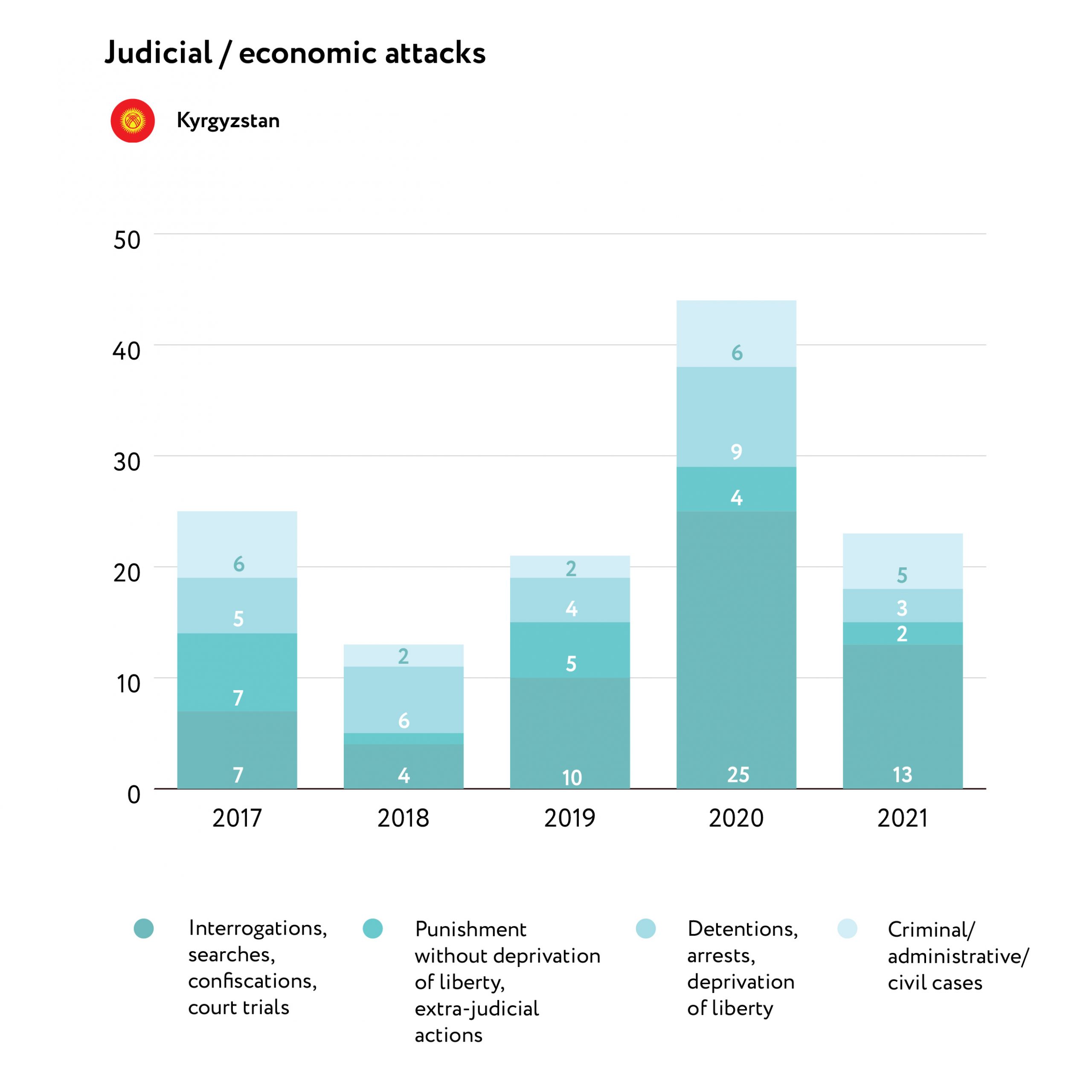
In 2021, two arrests of media workers were recorded.
- On October 28, blogger Gulzat Alymkulova, known online as Gulzat Mamytbek, was detained upon arrival in Kyrgyzstan from Turkey, as part of pre-trial proceedings under Article 204 (“Fraud”) of the Criminal Code. She was taken from the airport to a pre-trial detention centre, where she was held for a month. According to the Main Department of Internal Affairs of Bishkek, seven individuals accused Alymkulova of fraud in 2020.
- On November 27, Kuttumidin Bazarkulov, an independent journalist and former director of the Jalal-Abad regional TV channel, was placed in police custody. Bazarkulov was charged with breaking the law during an application he made for video equipment back in 2015 – 2016. At the time he was the head of a television and radio company. Bazarkulov is known for criticising the events on the Kyrgyz-Tajik border, related to the armed conflicts in Batken, as well as criticising the personnel policy of the current authorities. He was detained at 4 am in his home in Bishkek by armed men wearing masks, who claimed to be SCNS officers. The house was searched, but nothing was found. On June 16, 2022, the Jalal-Abad Regional Court found Bazarkulova guilty under the article “Abuse of an official position.” The court demanded 3.215 million Kyrgyz soms (40,000 USD) be paid as compensation for damage to the state. The journalist was released due to the expiration of the statute of limitations.
In 2021, five incidents of criminal cases against media workers were recorded. They include:
- On May 7, a criminal case was brought against April TVjournalistKanata Kanimetov under article 119 of the Criminal Code (“Petty Hooliganism”). According to Kanimetov, he found out about this from the Committee to Protect Journalists when he was shown a screenshot of a notification from the head of the Interior Ministry’s “Service for Combating Extremism and Illegal Migration,” Zhenish Zhorobekov.
- On August 6, pre-trial proceedings began against Asia News editor-in-chief Aslanbek Sartbaev, on suspicion of inciting inter-regional hostility on Facebook, where he criticised the new acting mayor of Bishkek, Taalaibek Sarybashov. This article carries a prison sentence of five to seven years in prison.
One case of forced emigration because of legal/economic pressure was recorded.
- On February 15, the admin of the Pravdorub.kg Facebook page, Yulia Barabina, was forced to leave Kyrgyzstan for fear of persecution. In an interview with the online publication Kaktus.media, she said that she was forced out of the country. “Unwarranted searches, surveillance, wiretapping, interrogations without access to lawyers, and accusations based on comments left by other people under my publications – I was deprived of all the basic civil rights that were guaranteed to me by the current Constitution,” said Baranina. On February 3, she was subjected to an 8-hour interrogation by the SCNS. On the same day, her house was searched, and her electronic devices, personal documents, and money were seized. Baranina later said that she was involved in a legal case, under Article 313 of the Criminal Code (“Inciting racial, ethnic, national, religious or interregional hatred (discord)”).
Interrogation summonses were another method of exerting pressure on media workers. In 2021, five incidents in this subcategory were recorded. These Include:
- On March 11, April TV journalist Kanat Kanimetov was summoned for questioning at the SCNS. The journalist was told that the interrogation was connected to the case of Abdil Segizbaev, the ex-head of the SCNS. Before the interrogation, Kanimetov was asked not to disclose any information about the pre-trial proceedings, under the threat of criminal liability.
- On April 8, freelance journalist Erulan Kokulov was summoned for questioning after publishing an investigation on YouTube about expired goods in warehouses in the city of Naryn.
- On April 22, blogger Adyl Akzhol uulu was summoned by Osh law enforcement to testify. This was due to a video posted on his YouTube channel, taken by a voter who found ballots thrown in the toilet on election day. Adyl Akzhol uulu had already previously testified before law enforcement agencies in connection with the publication of a video on his channel.
- On September 29, Aisuluu Kudaiberdiyeva, admin of the Polit Uznik Facebook group, was summoned for questioning by the SCNS, as a witness, in connection with social media posts. During the interrogation, her phone was confiscated, and her apartment was searched without a warrant.
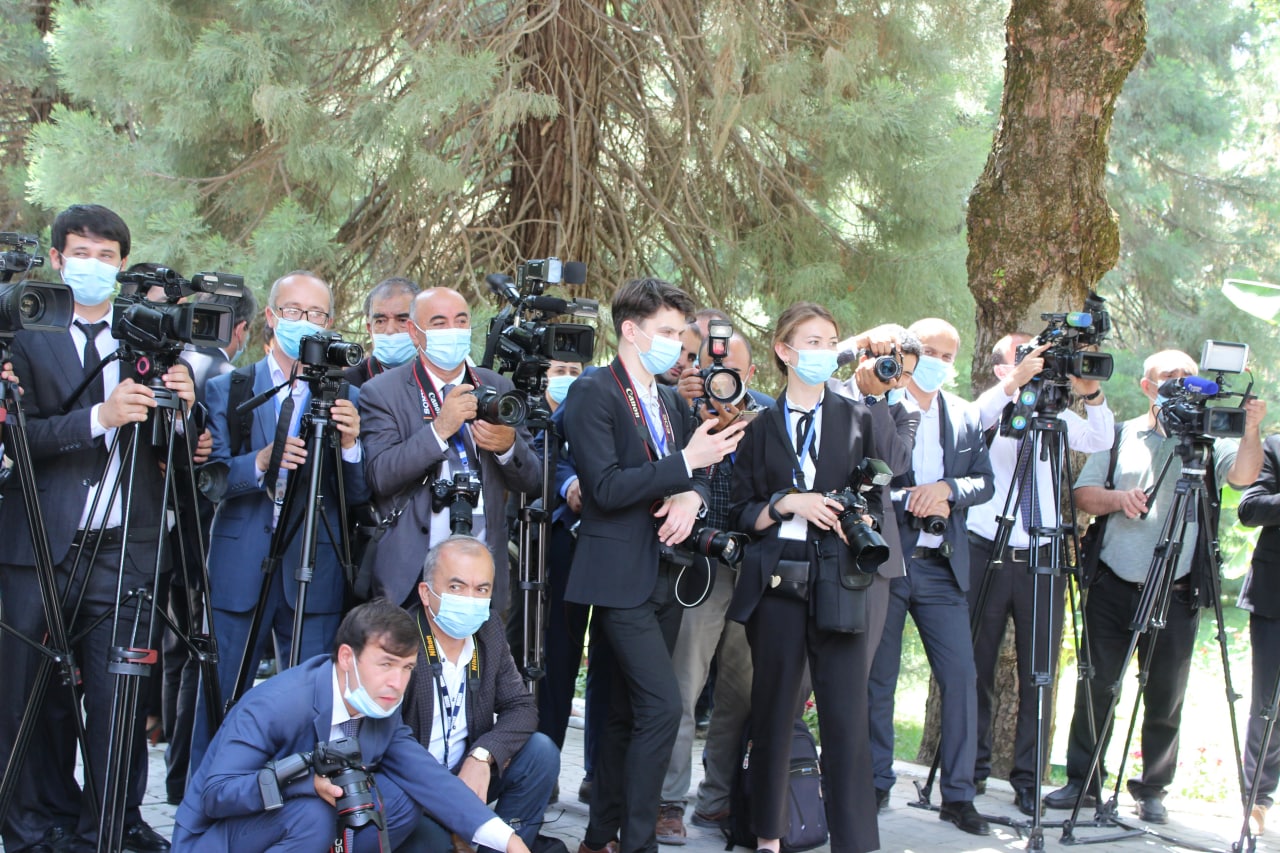
TAJIKISTAN
PHOTO: CABAR.asia
1/ KEY FINDINGS
In Tajikistan, 16 cases of attacks/threats against professional and civilian media workers, and editorial offices of traditional and online publications, were identified and analysed in the course of the research for 2021. Data for the study were collected using open source content analysis in Russian, Tajik and English. This report also includes unpublished data obtained via expert interviews. It is worth noting that the data is impacted by the fact that many of these attacks on media representatives are not made public or reported by the victims. This is often due to threats of further attacks or persecution. A list of the main sources is presented in Annex 5.
- In 2021, 68 percent of attacks on journalists were committed by government officials. The most common methods of exerting pressure were police interrogations, deprivation of journalistic accreditation and blocking organisations’ websites.
- 2021 saw Tajikistan’s bloodiest armed clash in recent years, on the border with Kyrgyzstan. During the conflict on the Tajik-Kyrgyz border, a journalist from the “USSR” publication, serviceman Mekhruziddin Boltaev, was killed.
- The total number of attacks on journalists and media workers in Tajikistan decreased almost fourfold compared to 2020: from 69 cases to 16.
- Amidst deteriorating relations with neighbouring countries and the introduction of a ban on Tajik citizens entering Kyrgyzstan, Tajik authorities attempted to involve independent media and journalists in an information war, holding so-called “explanatory conversations” with some of them and insisting on the publication of materials denouncing Kyrgyz officials.
- The practice of making discrediting films about dissident journalists on state TV channels was used once in 2021. State TV broadcasted a film which aimed to discredit Muhammadikboli Sadriddin, founder of Isloh.net.
2/ THE POLITICAL SITUATION AND THE MEDIA IN TAJIKISTAN
In the Reporters Without Borders Press Freedom Index for 2021, Tajikistan ranked 162nd out of 180, between Somalia and Iraq, for the second year running.
2021 saw a shift in focus from internal to external issues in Tajikistan. From April 28-30, a bloody clash took place on the border with Kyrgyzstan. More than 50 people from both countries lost their lives, and a further 300 were injured. Kyrgyzstan introduced a ban on Tajik citizens entering the country. This ban also applied to students and those wishing to enter Kyrgyzstan via another country.
Despite the eventual ceasefire, an information war began between the two countries. In Tajikistan, anyone who refused to participate was interrogated by law enforcement officers.
This clash also impacted the Tajik economy. The closure of the border with Kyrgyzstan led to a spike in prices for imported goods, particularly fuel, which is brought into the country via Kyrgyzstan.
In August 2021, the deteriorating situation in neighbouring Afghanistan, and subsequent rise to power of the Taliban, partially diverted the attention of the Tajik authorities and the population from problems within the country, forcing them to focus on this new potential external threat.
The government of Tajikistan refused to engage in any negotiations with the new Afghan government and supported those who opposed the Taliban in Afghanistan, namely Afghan Tajiks.
Later, the Tajik authorities would go on to take a less principled position towards Afghanistan. At the same time, they provided asylum to the leader of the National Resistance Front, Ahmad Massoud Jr., and his associates. Tajikistan’s open support for Afghan resistance forces brought a number of activists and media organisations on side with the Tajik authorities and strengthened the position of President Emomali Rahmon.
The foreign policy events of 2021 also contributed to a lack of popular interest in media coverage of the coronavirus pandemic.
3/ GENERAL ANALYSIS OF ATTACKS
Over the past year, the number of attacks on media workers and organisations decreased nearly fourfold in Tajikistan. Of the 16 recorded attacks, 11 were perpetrated by authorities, three by unknown persons, and two by non-state actors.
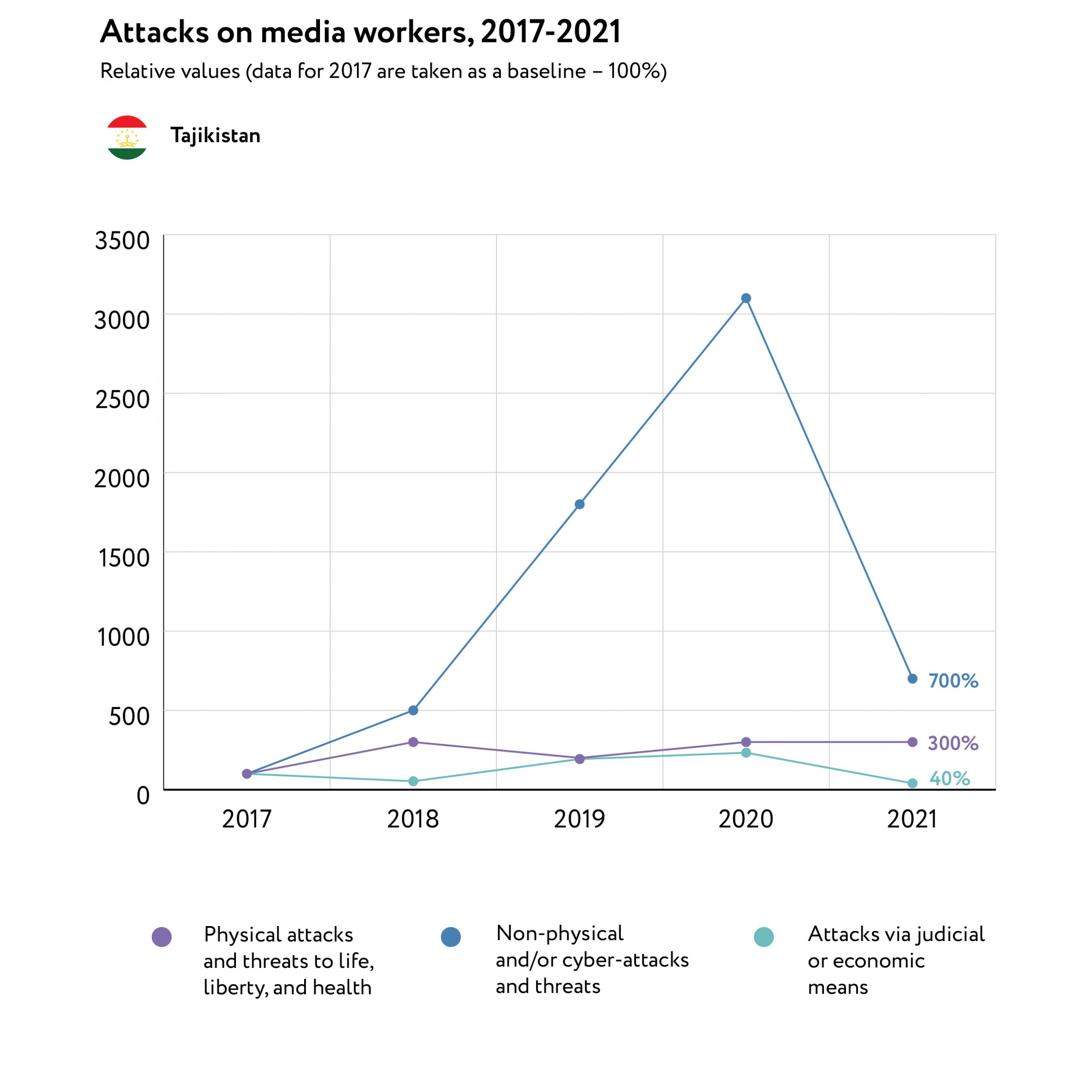
In 2021, the number of attacks and threats of a non-physical nature and/or cyber-attacks decreased, from 31 to seven. The practice of discrediting journalists and bloggers on state media and anonymous Telegram channels continued in 2021, albeit on a smaller scale. The number of attacks via judicial and/or economic means decreased sixfold.
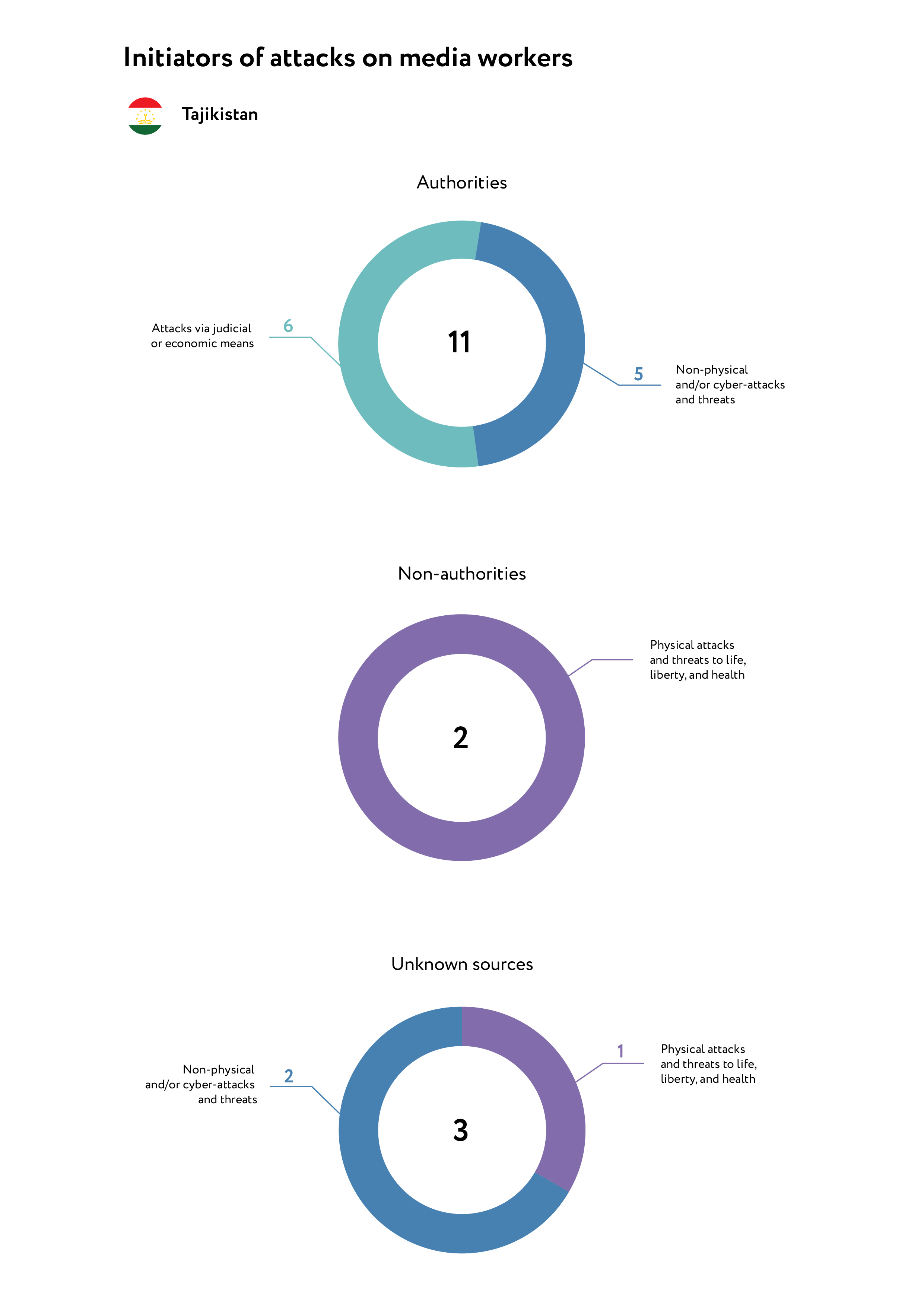
These figures do not necessarily reflect the reality of the situation, as journalists often do not report attacks. They are often difficult to prove, and the victims are accustomed to receiving threats.
4/ PHYSICAL ATTACKS AND THREATS TO LIFE, LIBERTY, AND HEALTH
In 2021, three attacks of this nature were recorded. The number of attacks of a physical nature has not exceeded three incidents per year since 2017.
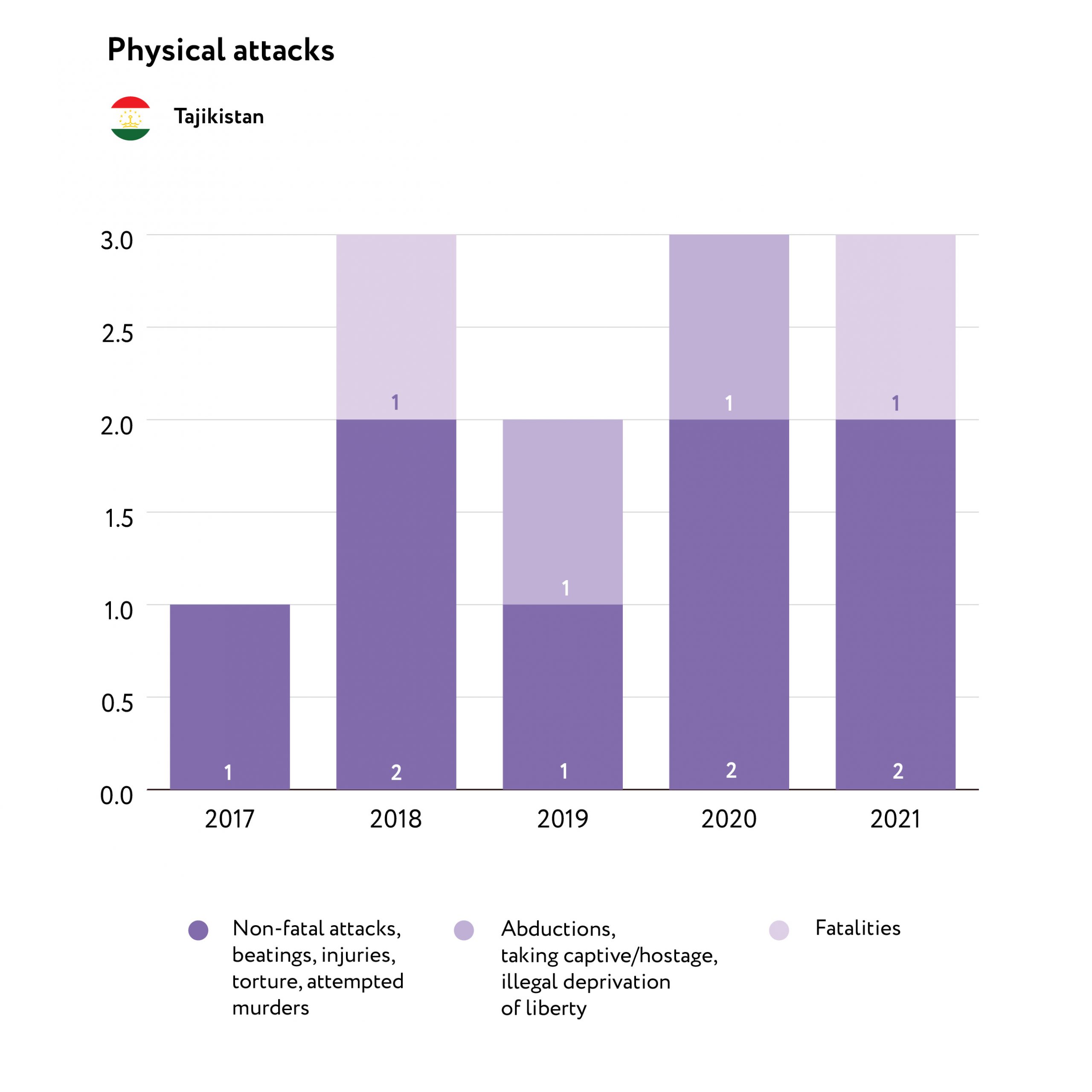
In 2021, one death was recorded:
- On April 30, the editor-in-chief of the “USSR” publication, Saif Dostiev, said that during the armed conflict on the Tajik-Kyrgyz border, a journalist from the same publication, Mekhruziddin Boltaev, was killed. The perpetrators were not identified.
Two non-fatal attacks were also recorded:
- On March 4, journalists from Radio Free Europe/Radio Liberty’s Tajik Service, Radio Ozodi, Mullorajab Yusufi and Shahlo Abdullo were attacked at a Soro Oil fuel station. The journalists were filming a report on the increase in fuel prices. While talking to one of the customers at the station, a security guard demanded that they stop filming, pushed Shahlo Abdullo away and covered the camera lens with his hand. He also struck Yusufi. The attacker was arrested.
5/ NON-PHYSICAL AND/OR CYBER-ATTACKS AND THREATS
The number of recorded attacks of this nature has decreased significantly, from 31 to seven cases, since 2020. Journalists, however, rarely report these attacks. Additionally, the focus of the authorities shifted to international issues in 2021. In five out of seven cases, the attacks were acts of defamation perpetrated by government officials.
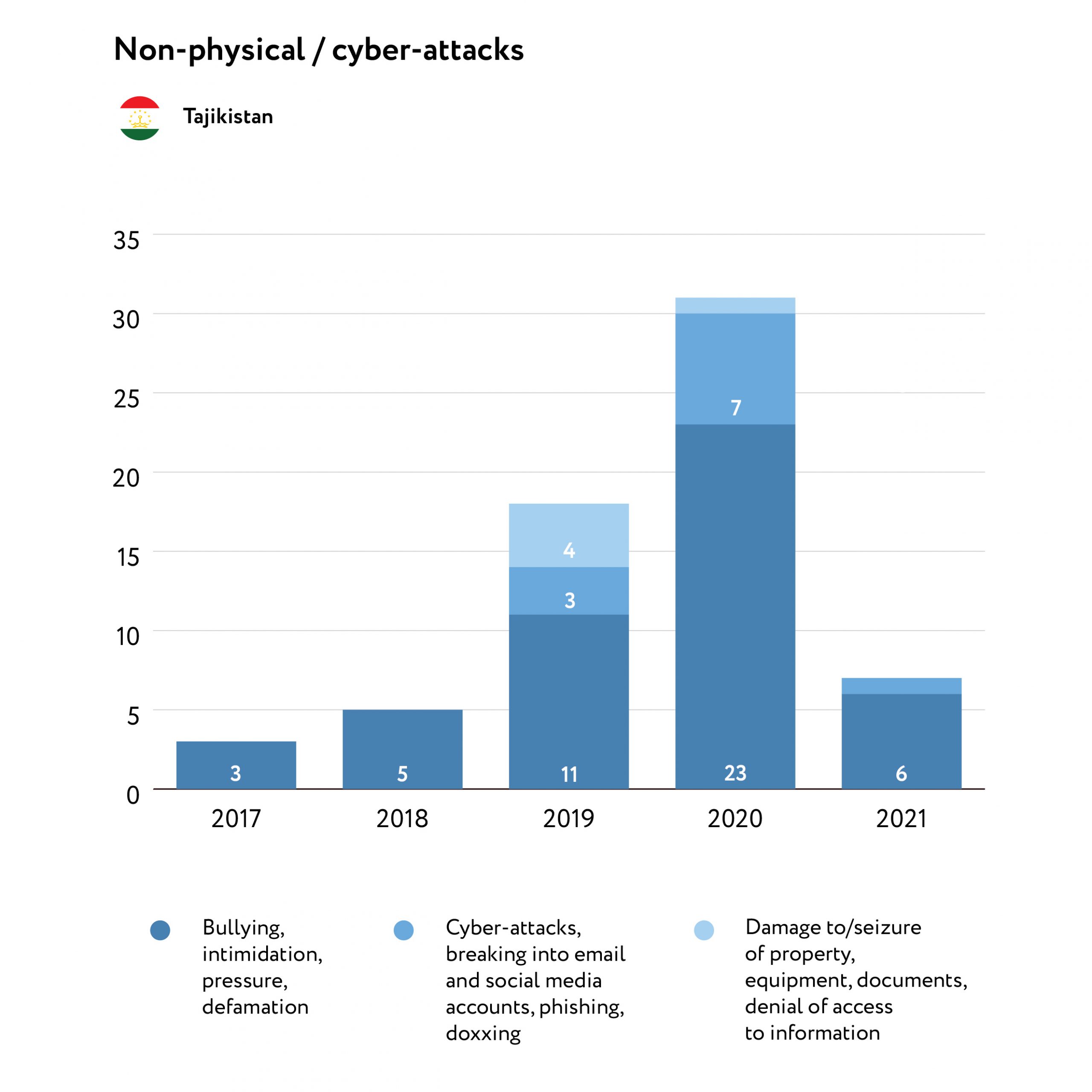
- On January 21, Tajik state TV broadcast a film accusing Isloh.net editor-in-chief Muhammadikboli Sadriddin of fraud. The content of the film was conjecture and did not present any evidence to the allegations. The journalist was also accused of teaching young children the Quran.
- On February 4, the state-owned paper Narodnaya Gazeta published a defamatory article about Sadriddin. The article was published under a pseudonym and its author was listed under a fictitious place of work. Sadriddin is currently in Europe, where he was granted asylum.
- On November 1, a Radio Ozodi journalist was forced to resign and leave Prague, where he had lived and worked for several years. He said he was endangering the lives of his parents and other relatives who had remained in Dushanbe. They were subject to constant persecution and feared they would be harmed if the journalist did not stop working for Radio Ozodi. As a result, the journalist’s relatives persuaded him to quit his job. The journalist and his family did not return to Tajikistan for fear of persecution.
- On November 3, the newspaper Pike published an article about a nursery which failed to abide by sanitation laws. Police officers came to the home of the paper’s editor-in-chief, Ahmad Ibrogim, on three separate occasions. He was summoned to the military draft office. The draft campaign was already in its second month, and the author had a military service exemption due to medical reasons. The editor-in-chief believed this was an attempt to interfere with the work of the publication.
- On November 12, eight influential members of the US Congress sent a letter to Tajik President Emomali Rahmon calling for an end to pressure and threats against journalists from Radio Ozodi and their families. The letter stated that journalists and their relatives, in Tajikistan and abroad, were subjected to significant persecution from the authorities and even received threats of physical violence.
The following non-physical attacks by unknown persons were recorded:
- On August 17, a campaign of harassment against blogger and women’s rights activist Shoira Pulatova, began on two Telegram channels. Photos were published, featuring offensive captions about Pulatova. One post has about 700 comments, both condemning and supporting her.
- On December 21, Muhammadikboli Sadriddin, founder of the Isloh.net channel, said in an interview with Radio Ozodi, that YouTube decided to block the Isloh.net channel due to verification issues. The channel was unblocked a day later.
6/ ATTACKS VIA JUDICIAL AND/OR ECONOMIC MEANS
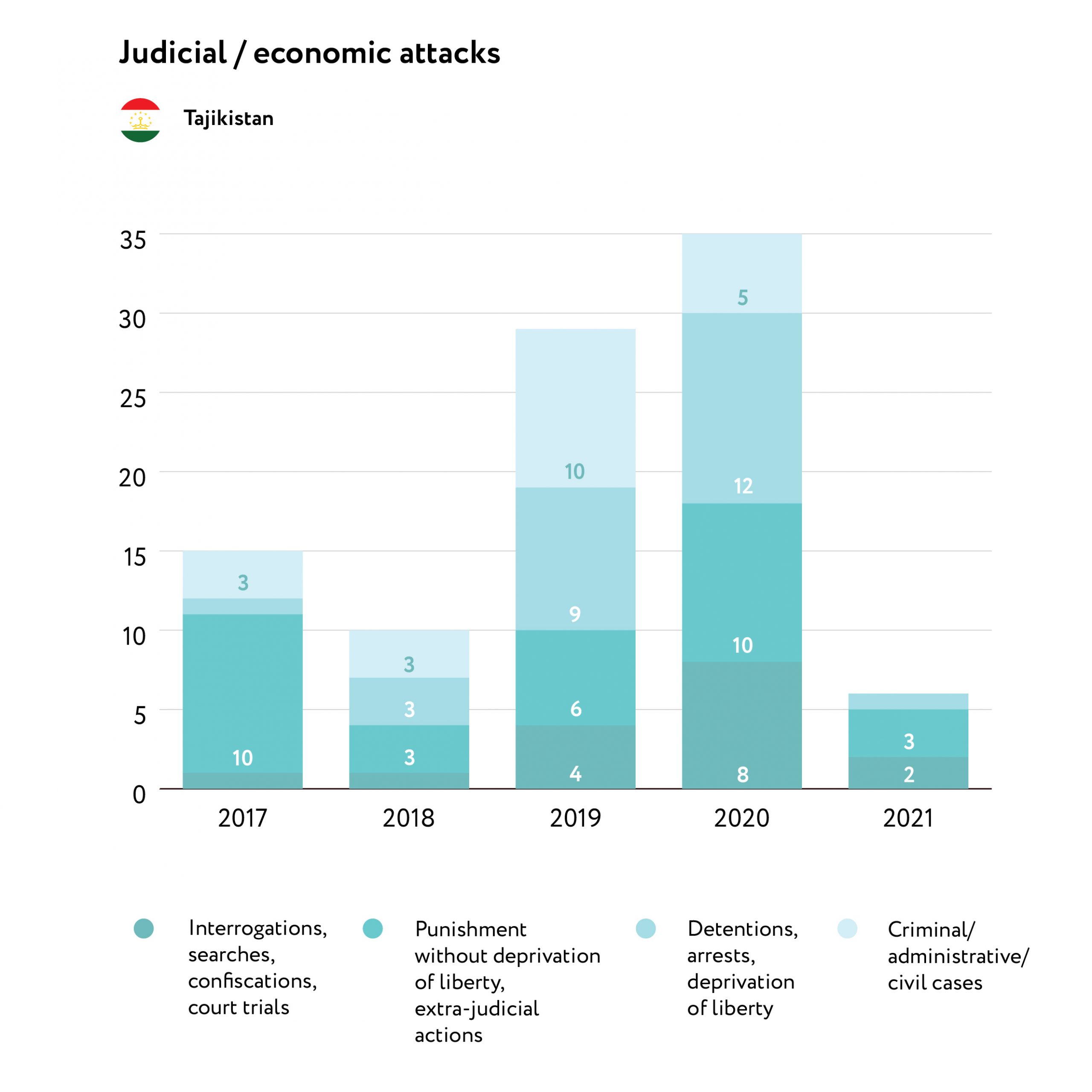
In 2021, six attacks of this nature were recorded. The practice of police calling in media workers for interrogation continued. These conversations were conducted for an apparent singular reason: to involve these journalists in the ongoing information war between the Tajik and Kyrgyz authorities. Law enforcement officials purported that independent publications were not showing an adequate level of support for their country and that this was in turn leading to the Tajik authorities “losing” the war. For example:
- On May 14, representatives from the Ministry of Internal Affairs Department of Organised Crime Control came to the office of a news outlet (whose name is withheld for its safety) and demanded that it publish anti-Kyrgyzstan material about the border conflict. The publication was forced to publish material written by the Ministry of Internal Affairs.
- On May 19, a journalist (whose name is withheld for the individual’s safety) was called in for interrogation and identification checks by the Department of Organised Crime Control. This was related to the journalist’s coverage of the conflict on the Tajik-Kyrgyz border.
Other incidents:
- On July 8, Vatan Radio journalist Daler Emomali posted on Facebook that he had been detained by police and taken to the Sino district police station in Dushanbe. The arrest took place after he attempted to talk to students who were participating in a rehearsal celebration for the 30th anniversary of Tajikistan’s independence. The journalist claims he was simply asking whether the students had been provided with food and water during the rehearsal. Daler was kept in police custody for an hour and a half. He was told that next time, he would be detained for 15 days for violating law and order.
- On October 11, the information and analysis portal “Point of View” (Nuqta.tj) was blocked in Tajikistan without explanation. Internet providers claimed that the site was blocked by the Tajikistan Governmental Communications Service.
The situation around websites being blocked in Tajikistan has not improved in 2021. Websites which have been previously blocked remain inaccessible to users within the country.

TURKMENISTAN
AUTHOR OF THE REPORT: RUSLAN MYATIEV, TURKMEN.NEWS
1/ KEY FINDINGS
34 cases of attacks/threats against online activists, bloggers and journalists in Turkmenistan, in 2021 were identified and analysed in the course of the research. Taking into account Turkmenistan’s information secrecy, as well as the increasing efforts by security services to block citizens’ access to the internet, the actual number of attacks most likely exceeds this. As of late 2021, the media in Turkmenistan had been almost completely sterilised.
Data about the attacks was obtained from open sources in the Russian, Turkmen, and English languages using the method of content analysis. Material that has previously not been made public and was obtained using the expert interview method was likewise used in the report. A list of the main sources is presented in Annex 6.
- Attacks via legal and/or economic means remained the primary method of attack against online activists, bloggers and journalists in Turkmenistan. Attacks of this type were often accompanied by physical attacks and threats to life, liberty, and health.
- In 2021, several cases of kidnapping and illegal imprisonment of Turkmen online activists were identified and confirmed, including incidents that took place outside the country’s borders.
- Physical attacks against Turkmen activists and bloggers in both Istanbul and Moscow took place in 2021.
- Six online activists were subjected to legal attacks in Turkmenistan; around the same number were recorded abroad.
- The exact number of non-physical attacks on journalists and bloggers, as well as cases of harassment towards their relatives is unknown. This is because, in most cases, the victims did not publicise their own, or their families’, experiences due to threats from law enforcement officials.
2/ THE POLITICAL SITUATION AND THE MEDIA IN TURKMENISTAN
In 2021, Turkmenistan ranked seventh to last in the “Democracy Index” published by The Economist Intelligence Unit. The country scored 1.66 and placed 161st out of 167.
In Reporters Without Borders’ annual ranking, Turkmenistan has consistently occupied the lowest positions, between 177th and 180th out of 180 countries, since 2015.[2] In the rankings for 2021, Turkmenistan took 178th place, while in 2022 it came 177th, between Myanmar and Iran.
These figures give an indication of the totalitarian nature of the regime in Turkmenistan, as well as the total absence of democracy, civil liberties, and independent media. The authorities harshly suppressed any dissent or attempts by citizens to defend their rights and freedoms, while the general population was subjected to widespread intimidation. Attempts to protest or express dissatisfaction with the State were often met with fabricated criminal cases and imprisonment, according to these and other reports.
During his regime, from 2007 to the beginning of 2022, President Gurbanguly Berdimuhamedow carried out consistent repression and intimidation of citizens who engaged in any kind of activism and punished members of their families. A systemic and efficient mechanism for suppressing dissent and any manifestation of independent public activity has been enforced throughout the country.
In 2021, acts of repression witnessed within Turkmenistan began to take place abroad, notably in Russia and Turkey. In these countries, Turkmen citizens, mostly bloggers and online activists critical of Turkmenistan’s government, were attacked and assaulted by unidentified individuals. Some were detained and held in deportation centres.
The bans and restrictions introduced in 2020 in response to the coronavirus pandemic were subsequently used to restrict the freedom of movement of Turkmen citizens. A paradoxical situation emerged in the country in 2021. On the one hand, the President and official media claimed that coronavirus never entered Turkmenistan. On the other hand, the authorities strictly enforced the use of face masks and adherence to other sanitary standards. They also rolled out vaccinations and closed external borders. In addition, they reduced domestic air traffic to a minimum and completely banned road and rail travel between the capital and other regions of the country. These measures, as well as evidence of deaths resulting from coronavirus, discredit the official assertion that there is no pandemic in Turkmenistan.
2021 was marked by a further decline in the standard of living of the population, as well as high demand for food products, made worse by shortages of foods available under the state-subsidized food programme and rationing plan, and high levels of inflation. At the same time, this does not apply to the relatives of Berdimuhamedow, employees of the Ministry for National Security, the Ministry of Internal Affairs and the Prosecutor General’s Office.
Journalists working for official government media and the state news agency TDH said in private conversations that despite many problems in the country, such as corruption, deceit, theft of state property, lawlessness, and despotism, they are forced to talk only about positive things, and only to report the successes. According to them, those who do not obey the will of the editor are immediately fired. Newspapers and magazine editors, as well as heads of national television and radio stations carry out the direct instructions of the Deputy Prime Minister and President, who oversee the media.
As was the case in 2020, dissent was mainly expressed among Turkmen citizens in exile, many living in Turkey. In 2020 the Turkish authorities tolerated protesters near the Turkmen consulate in Istanbul. However, in 2021 this was no longer the case. On November 12, 2021, Turkey was admitted to the Organisation of Turkic States as an observer. According to some reports, Turkmenistan allowed Turkey to join this organisation in exchange for Turkey’s commitment to crack down on protests by migrant workers in front of the Turkmen consulate in Istanbul and to arrest and/or deport the most active protesters. Subsequent crackdowns on these groups confirmed experts’ theories about a covert deal between the two governments. As of the time of writing this report, the most active Turkmen protesters were being held in Turkish deportation centres. The media published a list of 25 activists threatened with deportation to Turkmenistan.
Authorities in Turkmenistan continued to make significant efforts and purchase large amounts of equipment to control the internet and prevent negative information about the country from appearing online, as well as to prevent citizens from accessing publications from opposition groups and human rights publications. President Berdimuhamedov himself directly instructed the Ministry of National Security of Turkmenistan to strengthen control over the Internet during a televised address in January 2022. The Ministry of National Security and the state Internet providers Turkmentelecom and “Altyn Asyr” set up special departments dedicated to identifying subscribers using VPNs and other means of bypassing website blocks to access prohibited resources. If detected, the VPNs are blocked, and users are deprived of their internet access. It is worth to note that the general director of the mobile company ” Altyn Asyr ” – a monopolist in Turkmenistan – is a close relative of the President of Turkmenistan, which gives an opportunity for unimpeded control over the Internet and blocking of inappropriate resources.
Despite this, some information is still transmitted overseas.
3/ PHYSICAL ATTACKS AND THREATS TO LIFE, LIBERTY, AND HEALTH
Physical attacks and threats against Turkmen activists and bloggers took place In and outside the country in 2021.
Civil activist and blogger Murat Dushemov was physically assaulted in a government building in the town of Ruhubelent in the Dashoguz region. Dushemov and his companions, Juma Jumakaev and Leyli Nurmetova, were taken to this location following their arrest by traffic police on July 7, 2021.
Dushemov, Jumakaev and Nurmetova, who were travelling from Ashgabat to Dashoguz, were asked by police to produce evidence of a negative coronavirus test, which they responded to by asking for a document explaining why this check was being carried out. After four hours of waiting for any documentation, Jumakaev, who was driving, blocked the road with his car. Police reinforcements arrived and all three were taken into police custody. The car was impounded.
Nurmetova was fined 100 manats (60 USD) and released. Dushemov and Jumakaev were sentenced to 15 days in prison. Jumakaev was then released but Dushemov continued to be held in a temporary detention centre. Two or, according to some sources, three men were placed in his cell and began fighting with each other. Dushemov did not break up the fight but tried to reason with them. They told the guards that no fight had taken place, and that Dushemov attacked them and inflicted bodily injuries on them.
On August 16, the Dashoguz City Court sentenced Dushemov to four years in prison under Articles 108 (“intentional infliction of moderate bodily harm”) and 232 (“extortion”) of the Criminal Code of Turkmenistan.
Human rights activists maintain that Dushemov was framed by special services. This technique has been employed repeatedly to persecute critics, whom the employees of the Ministry of National Security and the Ministry of Internal Affairs want to neutralise. This technique consists of provoking a journalist, blogger or activist into a fight, and then accusing him or her of assault. Specially chosen people are usually used in these set-ups. They are typically criminals, drug users, informers or others dependent on the Ministry of National Security and the Ministry of Internal Affairs, or plain-clothes special services officers.
Outside the country, particularly in Istanbul, several citizens of Turkmenistan were subjected to physical attacks by unidentified individuals in 2021. According to some reports, the attackers were employees of the Ministry of National Security sent from Ashgabat.
On August 1, Farhad Durdyev, one of a group of protesters gathered in front of the consulate of Turkmenistan in Istanbul, was tricked into a car by unknown individuals and taken to the consulate building at gunpoint. There he was beaten and threatened for several hours in the presence of, and with the participation of, consulate employees. Durdyev had previously posted about Turkmen authoritarianism on TikTok.
“They played all 16 of my videos about the dictatorial regime in Turkmenistan and beat me and ordered me to apologise to Arkadag [a term for President Berdimuhamedow meaning “Protector”] on camera,” said Durdyev in an interview with Radio Azatlyk. “I refused, so, they beat me again. I even lost consciousness. They put me on a black sofa and woke me up by pouring water on me.”
Durdyev was later released by police after other participants in the protest alerted them Durdyev had been taken. Turkmen diplomats tried to convince the law enforcement officers that Durdyev was a terrorist and a traitor.
While Durdyev was being assaulted in the Turkmenistan consulate, other protesters were attacked by unidentified individuals. The same day, August 1, supporters of the regime, the so-called “titushki”, who are hired by the authorities to attack activists, drove up to the activists and began to assault the protesters. One victim was taken away in an ambulance. The activists managed to film one of the attackers’ cars.
On October 12, three activists were attacked in Turkey, including Nurmukhammed Annaev, the head of the Turkmen Organisation of Oguz Culture, Cooperation and Education. Annaev’s left arm was injured, and a bag containing his phone and some documents was stolen from him. Annaev had planned to criticise the Turkmen regime at a meeting in Warsaw taking place October 14-15, 2021. Civil activist Aziz Mamedov’s nose was broken following an attack by unknown individuals the same day. The third victim, later discovered to be named Bakhtiyar, was struck with a heavy object and sustained head injuries.
Around the end of October, a 37-year-old Turkmen activist and video blogger, Azat Isakov, went missing in Russia. Isakov has been unreachable since October 20, 2021 and as of the time this report was written, nothing was known about his whereabouts. Isakov had openly criticised the Turkmen authorities in his online videos. In Turkmenistan, his relatives were harassed and threatened by security services in an attempt to force Isakov to stop posting online.
The Russian Ministry of Internal Affairs stated, “On October 22, Isakov flew from Moscow’s Domodedovo airport to Turkmenabad.” They suggested that those concerned about him should “organise a search for Isakov, and to contact law enforcement agencies in Turkmenistan.” Isakov’s acquaintances suspect that physical violence or psychotropic substances were used to abduct him and forcibly take him to Turkmenistan and either the Russian authorities, in support of their Turkmen colleagues, or employees of the Turkmenistan security services operating with impunity in Russia, may have been involved. In his home country, Isakov faced a long prison term, and possibly torture or death.
4/ NON-PHYSICAL AND/OR CYBER-ATTACKS AND THREATS
In 2021, the persecution and punishment of the relatives of those whom the authorities consider politically dangerous, so-called “traitors to the motherland” and slanderers, continued in Turkmenistan. In these cases, underhanded methods were often employed.
Tactics included spreading rumours among these individuals’ colleagues or neighbours that they are a danger to others and that they should be avoided. An artificial exclusion zone would then be created around them, making them outcasts.
Psychological pressure on relatives was also used. Relatives of journalists and activists were known to find themselves under 24-hour surveillance at their places of residence. Unknown people would stand by the entrances of their multi-storey buildings night and day, noting everyone who entered the apartments of those placed under suspicion, creating a tense environment among neighbours who avoid them.
Relatives of those labelled traitors were frequently harassed, regularly summoned to police stations for “conversations” or visited at their places of residence by the police and asked questions about various peoples’ locations. If the relative of a “traitor” held a government position, he or she was often forced to exert pressure on the suspected person or face dismissal or demotion.
The relatives of Azat Isakov and Murat Dushemov were subjected to similar humiliations, threats, and attacks of a non-physical nature as were those of many other journalists and activists.
For example, between March and May 2021, officials from the Ministry of National Security repeatedly intimidated and threatened the relatives of Rozybai Jumamuradov and Devlet Bayhan, journalists for the independent Vienna-based news site Chronicles of Turkmenistan run by the Turkmen Initiative for Human Rights (TIHR).
- On April 21, unidentified persons repeatedly called Jumamuradov’s brother and threatened to kill his family if they did not cut ties with the journalist. Then, in early May, security officials summoned Jumamuradov’s 14-year-old nephew and interrogated him about his uncle, shouted at him, threatened to put him and his family in jail, and kill Jumamuradov. Following the publication of a May 13 statement by human rights groups citing the treatment of Jumamuradov’s nephew, the journalist’s 16-year-old niece was told by her school’s director that she could “forget about good grades” in upcoming exams because of her uncle.
- According to the May 13 statement, security officials visited and threatened Bayhan’s relatives on several occasions since March 2021. In April, two of Bayhan’s relatives were fired from their jobs, according to Bayhan.
Other critics who saw relatives threatened and/or harassed included Khursanai Ismatullayeva, Mansur Mingelov, Nurgeldi Khalykov and Balkanabat Hekim Khadzhiev. Unfortunately, these types of attacks have become so commonplace in Turkmenistan that they are rarely reported and given attention.
In 2021, the authorities also launched an online campaign to discredit independent foreign publications reporting on the situation in Turkmenistan, as well as activists taking part in protests abroad. One video blogger, Shatlyk Shykhiev joined this campaign with particular enthusiasm, posting a video in August 2021 refuting the reports of foreign publications and insulting opponents, calling them “traitors, renegades, and enemies of the Turkmen people.”
On May 15, a cyber-attack took place against Chronicles of Turkmenistan.
5/ ATTACKS VIA JUDICIAL AND/OR ECONOMIC MEANS
In 2021, at least six citizens of Turkmenistan were victims of legal attacks as a result of posting videos and comments on social media and making public appeals to the authorities through foreign internet resources and media. Four of these individuals received prison sentences, one was put under arrest for a period of 15 days while another was fined.
Some examples include:
- At the beginning of 2021, it emerged that in the summer of 2020, a 48-year-old YouTube blogger Murat Ovezov, who wrote the poem “Bitter Truth” about coronavirus and quarantine in Turkmenistan, was sentenced to five years in prison. Ovezov was convicted under article 228 of the Criminal Code of Turkmenistan (“fraud”), but local Turkmen.news sources said that his frequent appearances on this YouTube channel were the real reason behind the legal action.
- In February 2021, Turkmen citizen Sergey Babaniyazov was sentenced to two years in prison for allegedly distributing pornography. In reality, the charges were levied in response to the distribution of the anti-government leaflets.
- On September 7, 2021, doctor Khursanai Ismatullaeva was sentenced to nine years in prison. Ismatullaeva’s persecution began after she spoke to the foreign publication Turkmen.news about her illegal dismissal and how it was impossible to obtain justice through the court or the prosecutor’s office. The security services decided to “close off” the doctor after her case was mentioned on July 15, 2021, in the European Parliament’s discussion “Suppression practices in Central Asia: voices of human rights defenders.” The next day, Ismatullayeva was arrested. Police officers and men in civilian clothing took her from her house to an unknown location. She was held for 14 days, with no contact with the outside world. Meanwhile, her relatives had no information about her whereabouts. A case was opened against Ismatullayeva for “fraud”, “forgery of documents” and “ill-treatment of a person who is in a dependent or helpless state” (Articles 228, 218 and 114 of the Criminal Code respectively). These crimes were allegedly committed against an elderly disabled person whom she had previously cared for. All the lawyers Ismatullaeva’s family contacted prior the trial refused to take on the case, due to the involvement of “superior structures.” As a result, an appointed lawyer defended her.
- Blogger and civil activist Murat Dushemov, shortly before his 15-day arrest, posted a video on his YouTube channel where he politely asks a head physician in an Ashgabat hospital to show him a document explaining why the population is being vaccinated against the allegedly non-existent coronavirus in Turkmenistan. As a result of this video, Dushemov was fined for “petty hooliganism” and “swearing in a public place.”
In order to prevent distribution of negative information about the country, former President Gurbanguly Berdimuhamedow and his relatives, who were accused of large-scale theft of state property, Turkmen authorities took steps to ensure that YouTube closed the habartm.org and Chronicles of Turkmenistan channels, as well as deleted several videos. The authorities enlisted government-aligned bloggers to complain to YouTube’s management. After receiving a certain number of these complaints, sanctions on these opposition YouTube channels were imposed, and it became either significantly more difficult to post videos, or they were suspended entirely. Often, YouTube, after verifying these complaints, dismissed them, and restored the deleted videos.
In 2021, online attacks of this type were repeatedly carried out against YouTube channels of foreign publications.
Some examples include:
- On October 1, Eurasianet’s YouTube channel, which hosted numerous videos, including the infamous footage of Berdymukhamedov falling off his horse, was temporarily blocked at the request of the Turkmen authorities on grounds of copyright infringement.
- On May 18, YouTube channel Watan Habarlary, owned by the Turkmen State Committee for Television, Radio Broadcasting and Cinematography, reported on an old Turkmen.news video about the country’s president riding an electric bike. As a result, the video was removed and the Turkmen.news channel received a warning.
- On May 15, YouTube blocked a Turkmen.news video about corruption in foreign food purchases. A video was removed from the company NAMA. This firm was completing interior design work in the mansion of the President’s nephew and published a video about the house online. Journalists used frames from walkthroughs in their video.
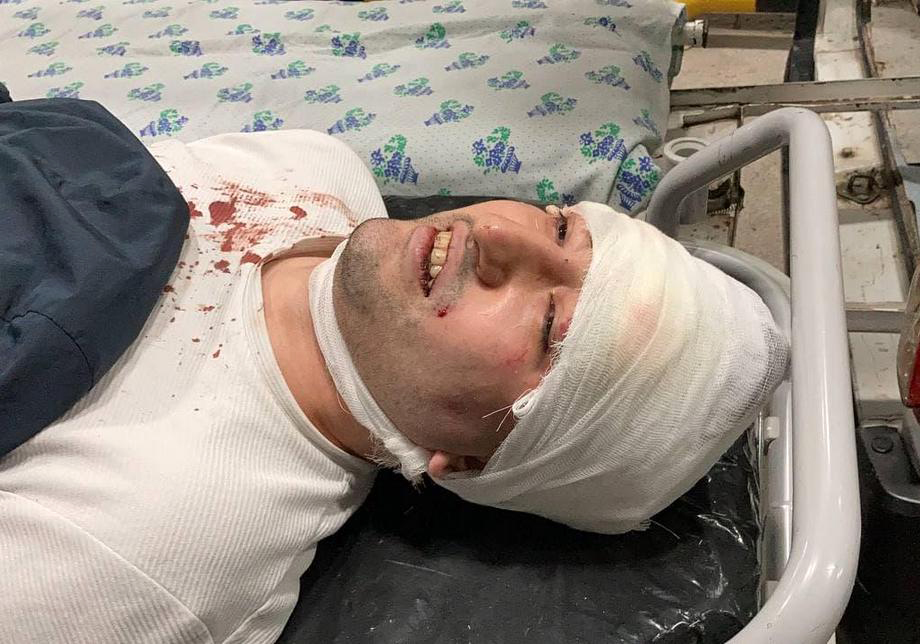
UZBEKISTAN
AUTHOR OF THE REPORT: SERGEY NAUMOV, FREELANCE JOURNALIST
PHOTO: TIMUR KARPOV
1/ KEY FINDINGS
In Uzbekistan, 140 attacks/threats against professional and civilian media workers, and editorial offices of traditional and online publications, were identified and analysed in the course of the research for 2021. Data for the study were collected using open source content analysis in Uzbek, Russian and English. This report also includes unpublished data obtained via expert interviews. A list of the main sources is presented in Annex 7.
- Attacks via judicial and/or economic means have remained the main method of exerting pressure on media workers in Uzbekistan. The number of such attacks has tripled since 2017.
- The number of attacks and threats of a non-physical nature and/or cyber-attacks decreased, from 46 in 2020, to 30 in 2021.
- The number of physical attacks on media workers remained at previous levels.
- 80 percent of attacks were committed by government officials. The main target of these attacks were journalists/bloggers who criticised the state or commercial entities.
2/ THE POLITICAL SITUATION AND THE MEDIA IN UZBEKISTAN
In the Reporters Without Borders Press Freedom Index for 2021, Uzbekistan ranked 157 out of 180. in 2020 the country was ranked 156th. The nongovernmental organisation noted that state propaganda remains dominant in the country, and any meaningful opposition to the government is prohibited. The authorities “control the media, as well as a number of bloggers closely aligned with the government.”
There are 1,893 media outlets registered in Uzbekistan, 638 (34%) of which are online publications.
The presidential elections, held on October 24, were the main political event of 2021 in the country. The media community considers the amendments, which were adopted in 2021 before the elections, to be preventive measures aimed at filtering out unwanted content from the media sphere. On December 25, 2020, the President signed into law a decree which punished the dissemination of false information. At the same time, imprisonment for slander was abolished. The amendments, which came into force on December 26, leave significant room for interpretation in favour of organisations and individuals who have a vested interest in silencing dissenting opinions.
The current President of Uzbekistan, Shavkat Mirziyoyev, won the elections with 80,1 percent of the vote, while 80,4 percent of registered voters took part in the elections. For the first time, a delegation of the Organisation for Security and Co-operation (OSCE) in Europe came to the country to observe the elections. The delegation worked as part of a joint observation mission from the OSCE Office for Democratic Institutions and Human Rights, the OSCE Parliamentary Assembly (OSCE PA) and the European Parliament. In total there were 366 observers from 44 countries, including 99 parliamentarians and staff from the OSCE PA. This level of transparency and desire to reform was unprecedented for a state with low levels of free speech.
On October 29, 2021, newly elected President Shavkat Mirziyoyev introduced amendments and additions to the Criminal and Administrative Codes which toughened the penalties for violations of personal data laws. These changes came into force on January 30, 2022, after which TikTok, Twitter, VKontakte and several other social networks came under the threat of administrative and criminal liability. The fine for breaching Article 141.2 of the Criminal Code (“Violation of the legislation on personal data”), which punishes the illegal collection, systematisation, storage, use, distribution, or transfer of personal data of Uzbek citizens using information technologies, including the internet, was tripled. The maximum penalty for breaking this law is two years of corrective labour.
3/ GENERAL ANALYSIS OF ATTACKS
A general analysis of the three main categories of attacks/threats against media workers in Uzbekistan revealed the number of attacks on journalists and bloggers has tripled since 2017.
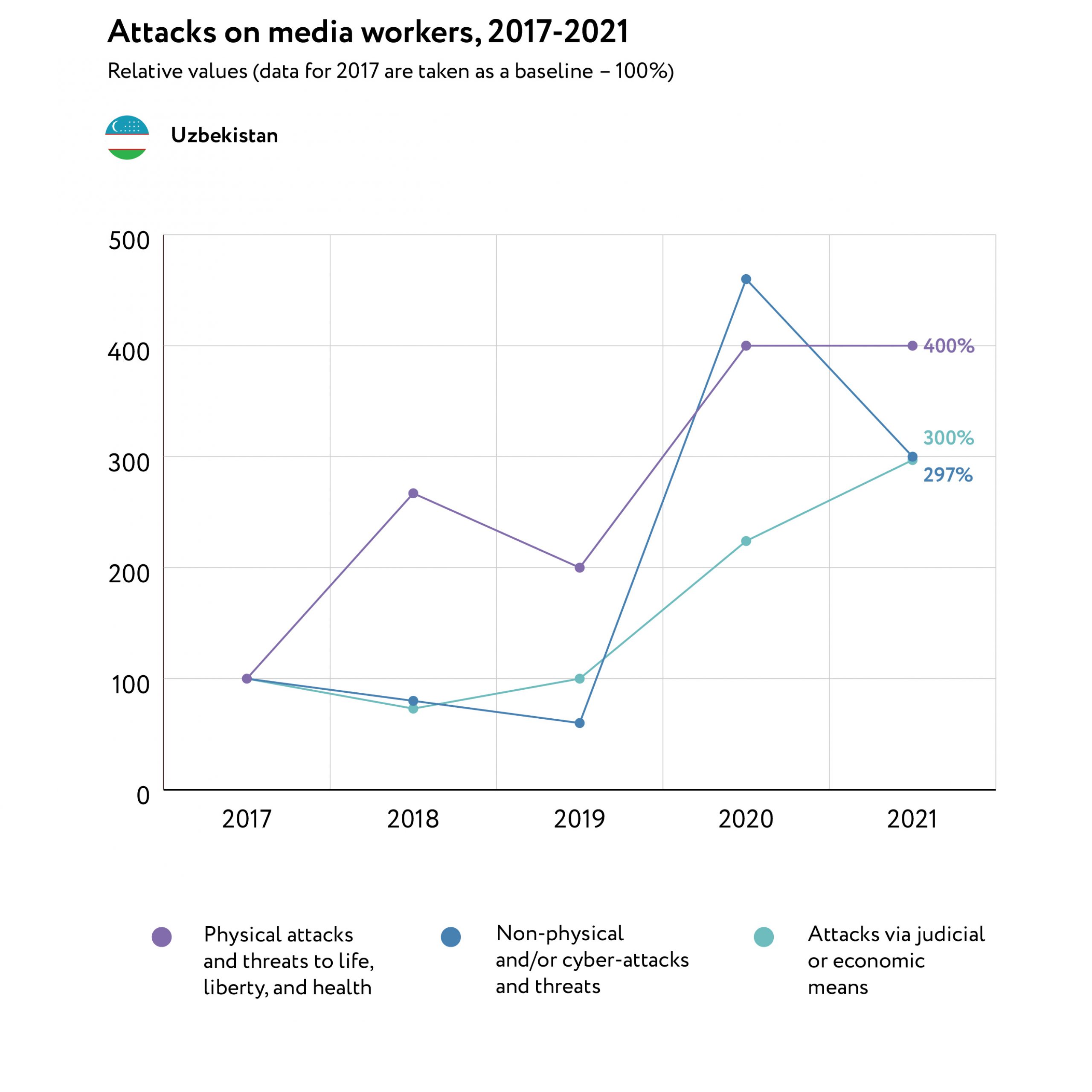
In 2020, 89 out of 129 incidents (69%) were attacks perpetrated by government officials. In 2021, government officials committed 114 out of 141 attacks, 81 percent of the total. There has been a significant increase in the number of attacks via judicial and/or economic means, from 71 cases in 2020 to 98 in 2021.
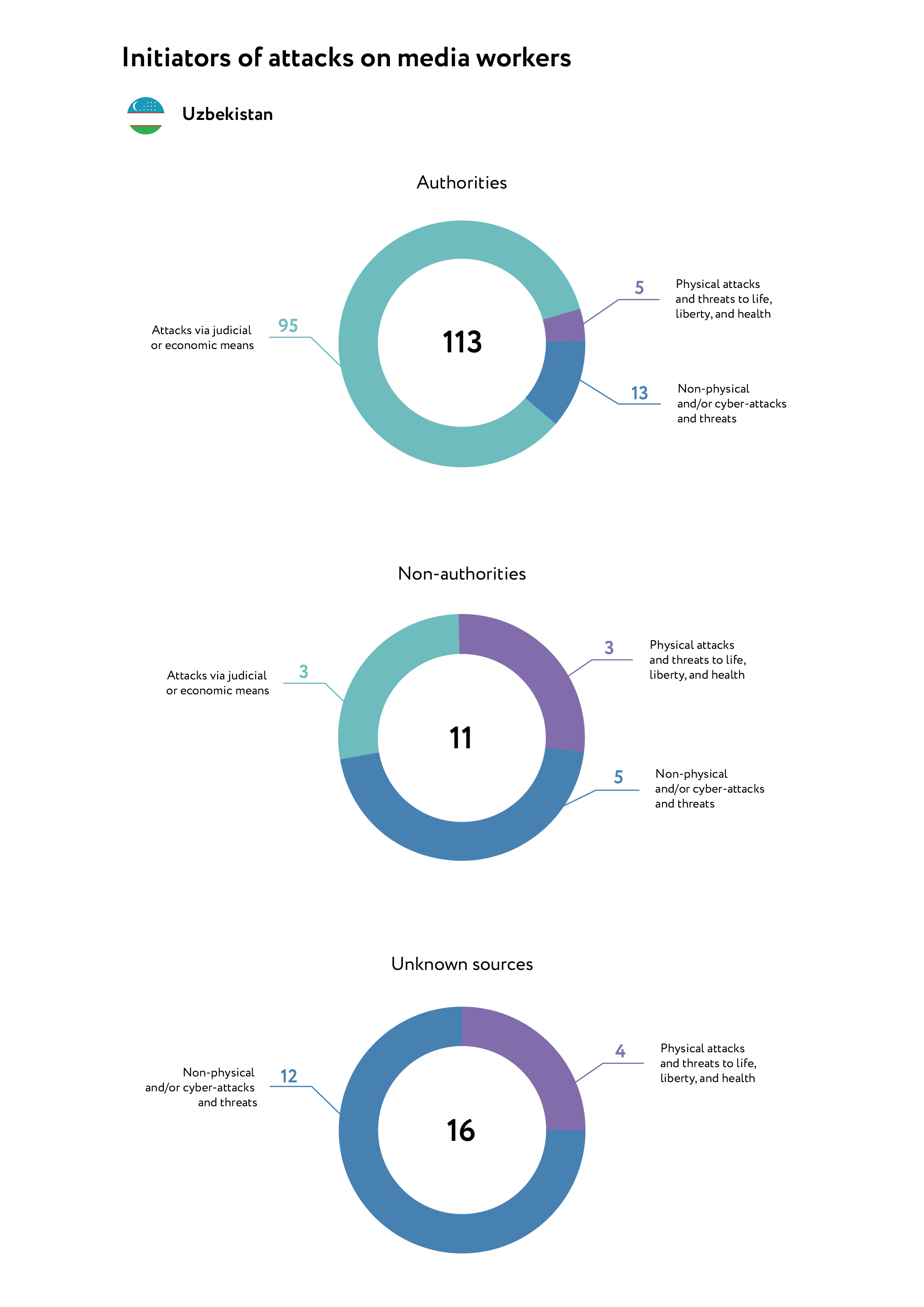
Monitoring these attacks has shown that media executives and journalists/bloggers are unwilling to report these attacks for fear of persecution or further reprisals. In some instances, victims who were featured on the Justice for Journalists Media Risk Map, demanded that information about their persecution be deleted.
In 2021, one incident was recorded related to persecution under the pretext of the COVID-19 pandemic, whereby a Polish journalist was denied entry to the country.
In 2021, 18 hybrid attacks were recorded against two media workers, Polish journalist Agnieszka Pikulicka and blogger Miraziz Bazarov, the latter of whom was severely beaten on March 28 and later subjected to criminal prosecution.
We are calling systematic persecution of some publication or media worker with the use of tools from two or more categories of assaults – physical, non-physical, and judicial/economic – “hybrid”. Such a combination of means involving and not involving force with judicial means of pressure on undesirable journalists is carried out with a view to demoralising them or getting them to self-censor or to give up the profession or even life itself.
In the case of Pikulicka, who lives in Uzbekistan and works for The Guardian, Al Jazeera, The Diplomat and Eurasianet, the journalist came under intense pressure throughout 2021:
- On February 1, Pikulicka said she was sexually harassed by an employee of the Uzbek Foreign Ministry. She claims that a representative of the Uzbek Foreign Ministry named “Rustam”, not only harassed her, but also forced her to write a positive article in exchange for accreditation.
- On March 29, Pikulicka announced on Twitter that her partner, who is not a journalist, had been questioned by the state security service. “He did not commit any crime; he was only in the hospital where Bazarov was hospitalised,” the journalist wrote. As noted above, Bazarov, a blogger, had been severely assaulted the previous day.
- On March 31, Pikulicka told the Committee to Protect Journalists that she had been abused online and threatened for tweeting about the Bazarov case. One user wrote that “This girl also needs to be taught a lesson, just like Bazarov.”
- On April 1, the Ministry of Internal Affairs of Uzbekistan stated that Pikulicka violated several laws. The press service of the Ministry of Internal Affairs released a statement, in which Pikulicka was accused of spreading “negative and biased information” about Uzbekistan in her tweets, as well as violating the country’s media laws. Pikulicka said that the Interior Ministry was trying to discredit her as a journalist.
- On April 4, Pikulicka tweeted photos of two unmarked cars parked outside her home, with the caption “a typical view from my window these days… whenever I offer them tea or coffee, they disappear.”
- On April 29, Pikulicka reported that she was once again attacked by trolls. “One blogger claimed that I said that all Uzbek men are gay. In fact, I said that Bacha bāzī was common in Uzbekistan before the Soviet period. I also said that Babur wrote homoerotic poetry. These are facts. You have to deal with it,” Pikulicka wrote.
- On June 2, the Ministry of Foreign Affairs refused to extend Pikulicka’s accreditation for “humiliating the honour and dignity of citizens of the Republic of Uzbekistan”, “interfering with the internal affairs of the Republic of Uzbekistan”, “inciting interethnic and religious hatred” and violating the law “On the protection of children from information which is harmful to their health.”
- On November 7, border guards denied Pikulicka entry into Uzbekistan, leaving her overnight at the Uzbek-Kazakh border. She was denied entry under the pretence of coronavirus-related restrictions. On November 8, the Ministry of Foreign Affairs allowed her to enter the country. She was given ten minutes to collect her belongings and leave the country. Pikulicka believes these actions were taken in reprisal for her reporting on Uzbekistan’s sensitive LGBT issues.
4/ PHYSICAL ATTACKS AND THREATS TO LIFE, LIBERTY, AND HEALTH
The number of physical attacks,12, remained at the same level as in 2020. One of these attacks was fatal:
- On September 15, Kokand blogger and administrator of the local Qo’qonjonim Facebook group, Ikbol Kamiljanov, died in the Ferghana Regional Hospital having been hospitalised in serious condition. His relatives suspect that he could have been poisoned. Their requests for a medical examination were refused. Doctors said there were no signs of poisoning. The official report states that Kamiljanov, who was diabetic, died from COVID-19 complications.

In five out of 12 cases, attacks were perpetrated by government officials. In three cases, attacks came from individuals who were not representatives of the authorities. In four cases they came from unknown persons.
One incident related to abduction, kidnapping and wrongful imprisonment was recorded:
- On April 2, after the trial of blogger Otabek Sattori, video blogger Bekhruz Nematov was kidnapped by unknown individuals. Nematov described the attack: “I don’t even know who they were, they blindfolded me and took me away somewhere. I don’t know where they took me, but it was terrible. They kept me there for four hours, they hit me in the back and legs with a truncheon and demanded that I no longer take part in Otabek’s trial”.
There were several cases of non-fatal physical attacks on members of the media. They include:
- On January 13, two men attacked UzReport videographer Fayoz Bakhtiyorov, damaging his equipment. On January 15, the court ruled in favour of the attackers. UzReport’s lawyers believe that the employees of the Ministry of Internal Affairs, who witnessed the incident, are trying to conceal evidence. The journalists protested the verdict at the court of cassation.
- On March 28, Tashkent-based blogger Miraziz Bazarov, who is a fierce critic of the Uzbek authorities, was seriously beaten outside his home. He was attacked by three masked men, one of whom was armed with a baseball bat. Bazarov’s internal organs were bruised, his leg was broken, and he suffered a concussion.
- On June 7, two journalists from Effect.uz were beaten in Andijan. The attack was organised by the son of the head of the secretariat of the city Kengash (Council) of People’s Deputies. According to the publication’s editors, one of the employees was physically injured. His phone was also damaged.
- On October 20, Mukhtor Temirov, Deputy Chairman of the Board of the national oil and gas producer Uzbekneftegaz, attacked Otabek Kuldoshev, a correspondent for the online publication Daryo.uz, to prevent the filming of a confrontation between the official and the director of the Kashkadarya regional TV and radio company, Jahongir Tuychiev. Temirov choked the journalist and, with the help of a security guard, tried to take away his camera.
- On November 22, blogger Fatima Juraeva was assaulted in the Ulugnor district by the chief accountant of an electrical company. Juraeva was left with a concussion, wounds to her head and face, and bruising on her left shoulder, lower back, abdomen, and legs.
5/ NON-PHYSICAL AND/OR CYBER-ATTACKS AND THREATS
In 2021, 30 incidents of this nature were recorded, 16 fewer than in 2020. The number of online attacks dropped by more than half, from 13 to six). The data here is far from complete, however. Monitoring these incidents is difficult since posts on social media are actively moderated or deleted. In addition to this, during the reporting period, it emerged that several online publications, which were key sources detailing attacks on media workers, removed the relevant materials. Some examples include:
- On February 11, blogger Kirill Altman reported that “the craziest insults, hatred and aggression” appeared in the comments section of his YouTube channel “Alter Ego.”
- In April and May, unknown individuals attempted to hack into the messenger accounts of three Kun.uz online employees. One of these attempts was successful: the attackers gained access to a journalist’s Telegram account for two and a half hours, managing to view his personal correspondence. The other employees had two-factor authentication. One of the heads of Kun.uz had their Gmail account hacked.
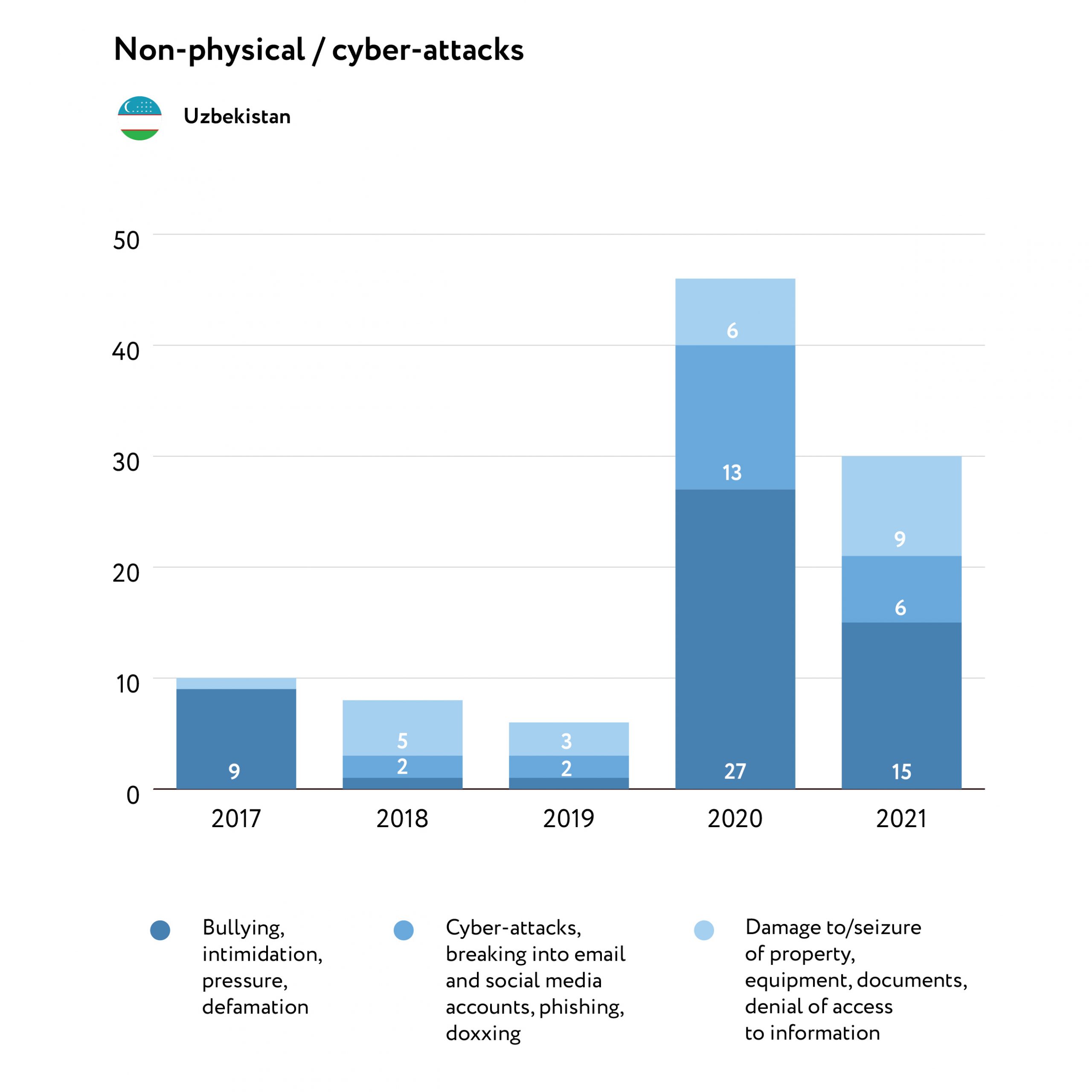
In 2021, the largest number of attacks in this category came in the form of bullying, pressure, and threats of violence. In seven out of 11 cases, attacks were perpetrated by government officials. Some examples include:
- On February 8, Khurshid Tursunov, Chairman of the Uchkuduk Economic Court, sent a threatening letter to Rayhon Kadyrova, editor of Uchkuduk newspaper. He demanded that they publish a puff piece, which contained plagiarism and threatened the editors with a fine. The newspaper refused to publish this material.
- On May 29, at a meeting between citizens and the head of the Kashkadarya region, an administrative official verbally abused blogger Umid Karimov. The official ordered a member of the Ministry of Internal Affairs to forcibly remove Karimov from the meeting. The incident occurred in the village of Shirintepa, in the Kasan district. Karimov has been posting blogs on social media and on the “Captain Karimov” YouTube channel since 2017.
Four cases of harassment, intimidation, pressure and threats of violence and death, including online threats; came from unknown individuals (not representative of the authorities). Examples include:
- On April 26, blogger Solijon Abdurakhmanov reported that he was receiving abusive comments under a video on his YouTube channel. Anonymous commenters wrote: “When you die, who will be to blame for you not getting along with others in your village.”
- On October 16, in the space of just 30 minutes, dozens of threatening and insulting messages against journalists and their relatives appeared on the Radio Ozodlik Telegram channel. The messages, some of which contained threats of beheading and sexual violence, were accompanied by pornographic images. Some comments alleged that Radio Ozodlik’s real goal is to organise a rebellion in Uzbekistan, disturb the peace and discredit the President. These threats all came from anonymous accounts. Radio staff found that at least two of the messages were written by vocally pro-government social media accounts.
In addition to Agnieszka Pikulicka, attempts were made to discredit two other journalists:
- On February 17, an anonymous user posted a photo of Hook.report blogger and journalist, Vlad Avdeev, on a gay dating site.
- On August 7, Feruza Nazhmiddinova, deputy editor of the Qalampir.uz online publication, along with a videographer, filmed restaurants and cafes in the centre of Tashkent which had remained open after the 8pm curfew. The next day, a video appeared on social media with the headline: “a man and a woman, who cannot be identified in the video, have sex on a balcony.” It was alleged that the woman in question was Feruza Nazhmiddinova. Police began a pre-investigation check, the results of which are unknown.
Five attacks were recorded related to damage/seizure of property, vehicles, equipment, journalistic materials and/or documents. In addition to the aforementioned attack on UzReport videographer, Fayoz Bakhtiyorov, whose camera was damaged, the following incident was also noted:
- On April 23, a blogger from the “Pikir” YouTube channel was banned from filming a gathering of local residents in the Xoʻjayli district of Karakalpakstan. The video shows an unknown individual hitting his camera.
6/ ATTACKS VIA JUDICIAL AND/OR ECONOMIC MEANS
Attacks using judicial and/or economic means remain the main method of exerting pressure on media workers in Uzbekistan. Since 2017, the number of attacks of this type has tripled. The main method of pressure is the initiation of criminal, administrative and civil cases. Since 2020, the number of such attacks has doubled.
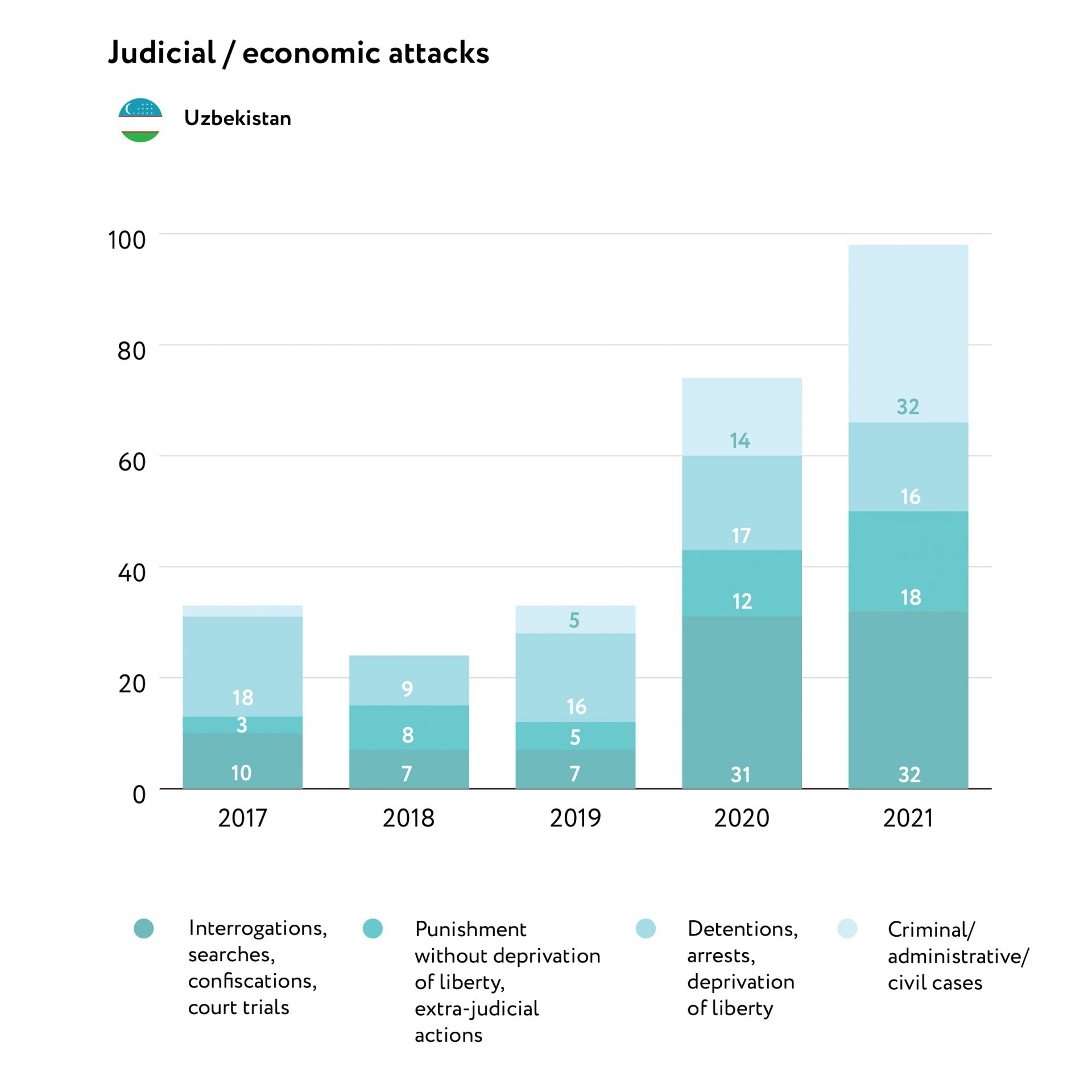
In 2021, 12 incidents were recorded related to criminal/administrative prosecution for defamation, insults, and violation of privacy; three cases of criminal/administrative prosecution for spreading “false information” and 17 attacks related to criminal/administrative prosecution for “petty hooliganism” or the illegal production, storage, importing or distribution of religious materials. The most noteworthy court cases are listed below, in chronological order:
- On February 11, the Termez City Criminal Court found blogger Otabek Sattori guilty under Articles 40 (“Defamation”), 41 (“Insults”) and 202-2 (“Dissemination of false information”) of the Code of Administrative Responsibility. He was fined the US $940. The Prosecutor General’s Office report claims that the blogger was punished for spreading “insults and slander” on social media against workers at the Denau coal depot and the zoo in Termez, when he wrote about embezzlement of property and “other illegal actions.”
- On April 22, a criminal case was brought against blogger Miraziz Bazarov under Paragraph “D”, Part 3 of Article 139 (“Defamation”) and Article 140 (“Insults”) of the Criminal Code. On April 29, after a month of forced isolation in the hospital, Bazarov was transferred to the Tashkent police department, where he was tried on charges of defamation from April 22. By court decision, the blogger was placed under house arrest and banned from using his phone or accessing the internet.
- On May 10, the Muzrabad District Court in the Surkhandarya Region found blogger Otabek Sattori guilty of committing crimes under Articles 139 (“Defamation”) and 165 (“Extortion”) of the Criminal Code. Taking into account Articles 57 (“Imposition of a milder punishment”), 59 (“Sentencing for multiple offences”) and 61 (“Rules on cumulative sentencing”), the blogger was sentenced to 6 years and 6 months in prison.
- On May 27, the open trial of three Effect.uz correspondents, Akbar Nurimbetov, Elyor Tajibaev and Khamid Akhmedov, began in the Kashkadarya regional court. The trial was in connection to the case against Otabek Sattori. The journalists were charged under Articles 139 (“Defamation”), 140 (“Insults”), 219 (“Resisting a representative of the authorities or a person performing their civic duty”) and 236 (“Interference in the investigation or resolution of court cases”) of the Criminal Code. The case was opened on April 7, after the journalists filed a request for an open case with the judge in the Sattori case. On November 3, the court found Akhmedov and Nurimbetov guilty and sentenced them to 2 years and 6 months of restricted freedom. Tajibaev, however, was sentenced to three years in prison, part of which will be served in a prison colony.
- On June 21, Kun.uz co-founder and head, Makhsujon Askarov, was fined US $1,100 by the Chilanzar District Criminal Court for publishing religious materials on the site (Article 184.2 of the Code of Administrative Offences “Illegal production, storage, importing or distribution of religious materials”). After the court’s verdict, the Uzbek-language edition of Kun.uz halted publication. The administrative case was opened based on the results of an internet monitoring investigation by the Main Directorate for Combating Terrorism and Extremism of the Ministry of Internal Affairs.
- On July 15, the Yashnabad District Court in Tashkent sentenced Ozodbek Kurbanov, a blogger for the “Kuch Birdamlikda” YouTube channel, to 15 days of administrative arrest for petty hooliganism. According to the activists monitoring the trial, the blogger was said to have “resisted a representative of the authorities” and “insulted” a law enforcement officer. Kurbanov covered the process of filing a collective application of the Hakikat va Taraqqiyot (Truth and Development) Social Democratic Party to the Constitutional Court of Uzbekistan.
- On September 30, the Uchtepa District Criminal Court ruled against blogger Bobur Ganiev under Article 41 (“Insults”) of the Administrative Code. He was fined US $505 for using the word “cop”. The court also found the blogger guilty under Article 194 (“Failure to comply with the lawful requirements of an internal affairs officer”) and imposed an additional fine of US $77. Ganiev was also sentenced to 15 days in prison under Article 195 of the Code of Administrative Offences (“Obstructing the official duties of an employee of the internal affairs authorities”). The correspondent was forced to record a video message, in which he confessed his guilt. On September 30, he was detained during a document check and a confrontation with employees of the Ministry of Internal Affairs. Law enforcement officers allegedly found pornographic material on his phone.
- On November 17, an administrative case was initiated against Orginfo.uz administrator, Boburmirzo Khamrokulov under Article 202.2 of the Administrative Code (“Dissemination of false information”). He was accused of publishing Goskomstat (Federal State Statistics Service) data without the department’s prior agreement, despite this information being in the public domain. This persecution may be as a result of Orginfo.uz’s reporting on conflicts of interest amongst a number of officials and their relatives.
In 2021, two cases of pressure being exerted on the relatives of media workers were recorded, in addition to the aforesaid interrogation of Agnieszka Pikulicka’s partner. One example is:
- On March 31, the apartment of blogger Miraziz Bazarov’s mother was searched by law enforcement officers without evidence of a warrant. They confiscated the blogger’s cameras and old phones.
It is also worth noting that in 2021, there were three instances of entry into Uzbekistan being banned, and one incident related to forced deportation, the Pikulicka case. Cases of denial of entry include:
- On June 10, Russian video blogger Iskandar Kadyrov, who flew from Moscow to Karshi on June 10, was denied entry into Uzbekistan and deported. Kadyrov runs a satirical video blog in Uzbek, “Iskandar the Macedonian”, which has 275,000 subscribers.
- On August 23, employees of the State Security Service (SSS) of Uzbekistan, along with employees of the Gisht Kuprik border control, denied entry to Ruzibay Azimi, a blogger who had worked for many years as an independent journalist and collaborated with a number of independent and Western media outlets,in particular Voice of America). Azimi, for reasons unknown, was not allowed into Uzbekistan after two years of forced emigration.
To conclude, here are two more examples of pressure on media workers:
- On March 19, Kun.uz employees Kakhramon Aslanov and Makhsujon Askarov, as well as the editor-in-chief of Daryo.uz online, Mukhrim Azamkhodzhaev, were summoned for interrogation. This was confirmed by three independent sources at Gazeta.uz. The press service of the Central Internal Affairs Directorate stated that internal affairs authorities have nothing to do with the alleged interrogation of the journalists.
- On April 21, the Kun.uz editors revealed that they were subjected to regular interference in editorial policy and were forced to remove materials from their site. The State Security Service was most often the perpetrator of this kind of pressure on journalists and media workers.
ANNEX 1: ATTACK TYPES, IDENTIFIED BY JFJ FOUNDATION
Physical attacks and threats to life, liberty, and health
- Abduction, taking captive/hostage, illegal deprivation of liberty
- Attempted murder
- Beating/ injury / torture resulting in death
- Death while in custody or as a result of loss of health in captivity
- Disappearance
- Fatal accident
- Murder
- Non-fatal accident
- Non-fatal attack / beating / injury / torture
- Pressure on a media worker via physical pressure on relatives and loved ones
- Punitive psychiatric treatment not resulting in death
- Punitive psychiatric treatment resulting in death
- Sexual harassment
- Sexual violence
- Sudden unexplained death
- Suicide
- Suicide attempt
- Unlawful military conscription
Non-physical and/or cyber-attacks and threats
- Breaking into email / social media accounts / computer / smartphone
- Bullying, intimidation, pressure, threats of violence and death, including cyber-
- Cyber-, DDOS, and hacker attack on a media outlet
- Damage to / seizure of property, vehicles, equipment, documents, journalistic materials, print run
- Damage to/seizure of the residence/work premises
- Defamation, spreading libel about a media worker or media outlet
- Forced emigration as a result of non-physical and/or cyber-attacks and threats
- Identity theft / phishing / doxxing
- Illegal impediments to journalistic activity, denial of access to information
- Pressure on a media worker via non-physical pressure on relatives and loved ones
- Pressure on a source, including threats of violence and death
- Trolling
- Wiretapping/surveillance without a court decree
Attacks via judicial or economic means
- Administrative arrest, remand, pre-trial detention, prison
- Arrest in absentia
- Arrest of bank account/ property
- Authorised travel ban (movement inside a country or specific region/town)
- Ban on engaging in journalistic activity
- Ban on entering the country, denial or revocation of a visa/accreditation
- Ban on leaving the country
- Community service, ban on certain activities and other punishment following a criminal case
- Confiscation/seizure of property, vehicles, equipment, documents, journalistic materials
- Court trial
- Criminal/administrative prosecution excluding (1), (2) and (3)
- Dismissal / involuntary dismissal /forced quitting of the profession
- Fine for non-compliance with the «foreign agents» law in accordance with the Criminal Code
- Fine for non-compliance with the «foreign agents» law in accordance with the Code of Administrative Offences
- Fines and other restrictions following administrative offences
- Forced cessation of journalistic activity/ closure of media outlet due to the state of war and/or military censorship
- Forced deportation, Extradition
- Forced emigration as a result of legal/economic pressure
- House arrest
- Interrogation
- Labelling media/individuals as foreign agents
- Pressure on a media worker via judicial and/or economic means on relatives and loved ones
- Prosecution for dissemination of false information and fakes (3)
- Prosecution for extremism, links with terrorists, inciting hatred, high treason, calling for the overthrow of the constitutional order, rehabilitation of Nazism (2)
- Prosecution for libel, insult, violation of privacy (1)
- Prosecution for violation of the honour, dignity and business reputation; violation of privacy following a civil lawsuit
- Repayment of compensation and legal costs following civil lawsuits
- Request to remove or block the article and/or refutation
- Search with a court decree
- Search without a court decree
- Selective application of repressive laws
- Short-term detention
- Shutting down a media outlet / blocking an Internet site/ seizure of an entire print run
- Suspended sentence
- Unauthorised travel ban (inside country, region or town)
- Warnings, pre-trial complaints, questioning and other extra-judicial actions
- Wiretapping/ surveillance with a court decree
ANNEX 2: OPEN SOURCES USED FOR GATHERING DATA (AZERBAIJAN)
- Turan — an independent news agency. The agency distributes news, analytical articles, and overviews from Azerbaijan.
- Meydan.TV — a weekly online television channel. Its mission — to inform active members of society about the state of affairs in politics, the economy, and social life; to offer a platform for open and diverse discussions on all topical questions concerning Azerbaijani society.
- Voice of America — a multimedia news organisation in the USA that produces content in over 45 of the world’s languages for audiences with limited access to a free press.
- Toplum.TV — an Azerbaijani news site.
- Xural — an Azerbaijani news site.
- Election Monitoring and Democracy Studies Center (EMDS) — a non-governmental organisation. Main goals — elections monitoring and the formation of democratic institutions in Azerbaijan.
- US Embassy in Azerbaijan — America’s embassy in Azerbaijan.
- Gözətçi — a news site of Azerbaijan. The aim of the website is to collate information on human rights violations.
- Azadlıq Radiosu — the Azerbaijani service of Radio Free Europe/Radio Liberty.
- Human Rights Club — founded on Human Rights Day (December 10) in 2010 by a group of young Azerbaijani human rights advocates. The organisation’s main objective is to promote the protection and observance of human rights and fundamental liberties, as well as broader democratic development in Azerbaijan.
- Novator — a news site of Azerbaijan.
- BBC — the British Broadcasting Corporation’s service in Azerbaijan.
ANNEX 3: OPEN SOURCES USED FOR GATHERING DATA (KAZAKHSTAN)
- The International Foundation for Protection of Freedom of Speech Adil Soz – a Kazakhstani human rights organisation whose major priority is “establishment of open civil society over the statement in daily life of the country free, objective and progressive journalism”.
- The Kazakhstan International Bureau for Human Rights and the Rule of Law – a non-governmental organisation whose aim is to promote the observance of civil and political rights and liberties in Kazakhstan.
- Committee to Protect Journalists (CPJ) – an international non-governmental organisation engaged in defending the rights of journalists.
- Radio Azattyq – the Kazakh service of the international media company Radio Free Europe/Radio Liberty; an internet media outlet that provides detailed coverage of political persecutions.
- MIA «KazTAG» – a news agency.
- The Facebook social network
- Russian- and Kazakh-language open access media on the internet.
ANNEX 4: OPEN SOURCES USED FOR GATHERING DATA (KYRGYZSTAN)
- 24.kg – a website, a news agency covering events in Kyrgyzstan
- Kaktus.media – an online media outlet covering events in Kyrgyzstan
- Kloop.kg – an online media outlet covering and analysing events in Kyrgyzstan
- School of Peacemaking and Media Technology in Central Asia – a non-profit organisation specialising in research in the sphere of media, annual ratings of freedom of expression, and media monitoring
- Radio Azattyk – the Kyrgyzstan service of Radio Liberty, providing daily coverage and analysis of events in Kyrgyzstan
- Knews.kg – a news agency, news and analysis
- Telegram channels and social media accounts of Kyrgyzstan’s journalists and media outlets
ANNEX 5: OPEN SOURCES USED FOR GATHERING DATA (TAJIKISTAN)
- Radio Ozodi – the Tajik service of Radio Liberty.
- Reporters Without Borders – an international non-profit, non-governmental organisation that conducts political advocacy on issues relating to freedom of information and freedom of the press.
- Committee to Protect Journalists (CPJ) – an international non-governmental organisation.
- Akhbor – a news portal founded in Prague by the Tajik journalist Mirzo Salimpur.
- Asia-Plus– an independent news agency of Tajikistan.
- Jumhuriyat – the state newspaper of Tajikistan.
- NIAT Khovar – the national news agency of Tajikistan.
- Mediamarker.info – a media internet portal in the Tajik language, based in Poland.
- Payom.net – the news portal of the Islamic Renaissance Party of Tajikistan.
- Other open source media in the Tajik, Russian, and English languages accessible on the internet network, as well as social networks.
ANNEX 6: OPEN SOURCES USED FOR GATHERING DATA (TURKMENISTAN)
- Alternative News of Turkmenistan – now Turkmen.news. An independent news and human rights organisation based in Netherlands.
- Chronicles of Turkmenistan (Austria) – a publication of the Turkmen Initiative for Human Rights.
- The Fergana Information Agency (Russia) – a resource covering events in Central Asia.
- Radio Azatlyk (Czech Republic) – the Turkmen Service of Radio Free Europe / Radio Liberty.
- Radio France International (Paris) – a radio station broadcasting news around the world, in French and in 15 other languages.
ANNEX 7: OPEN SOURCES USED FOR UZBEKISTAN REPORT (UZBEKISTAN)
- The Fergana Information Agency – a resource covering events in Central Asia.
- Radio Ozodlik – the Uzbek Service of Radio Free Europe / Radio Liberty.
- Centre1.com – an independent media organisation specialising in Central Asian news.
- Asiaterra– an information and analysis site covering Central Asia
- Front Line Defenders– an international defence foundation and Irish human rights organisation set up in Dublin, Ireland, in 2001.
- International Partnership for Human Rights (IPHR)– an international non-profit organisation with its headquarters in Brussels, Belgium. Established in spring 2008.
- Committee to Protect Journalists– an international non-governmental organisation that defends the rights of journalists.
- The Association for Human Rights in Central Asia (AHRCA) – an independent human rights organisation. The initiators behind the founding of the AHRCA were citizens of Central Asian countries who had experienced politically motivated persecution.
- ACCA.media – an independent human rights media project that writes about human rights violations.
